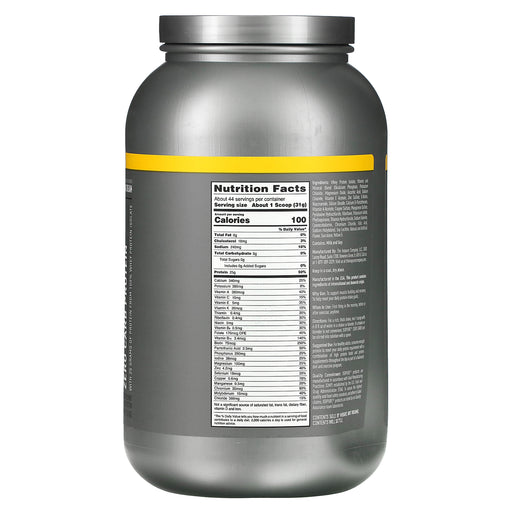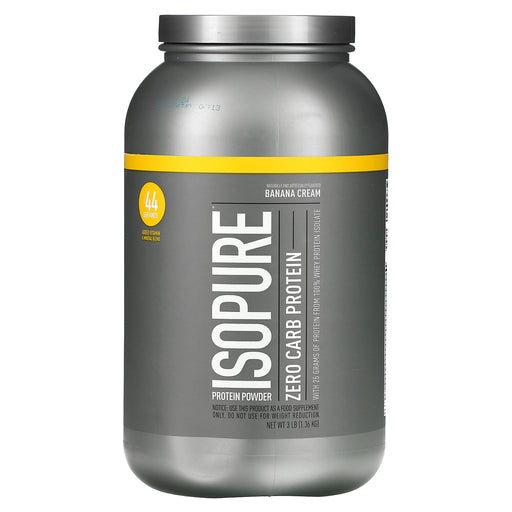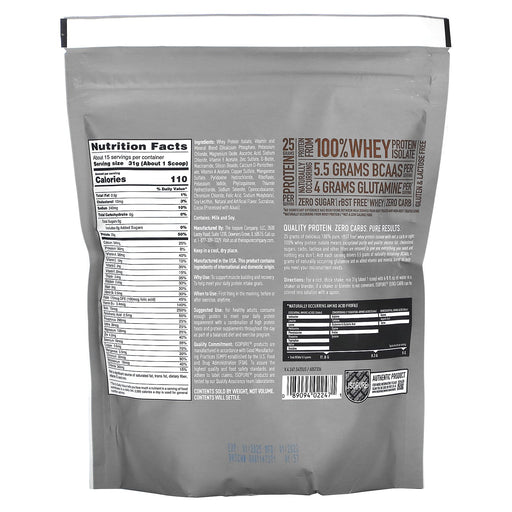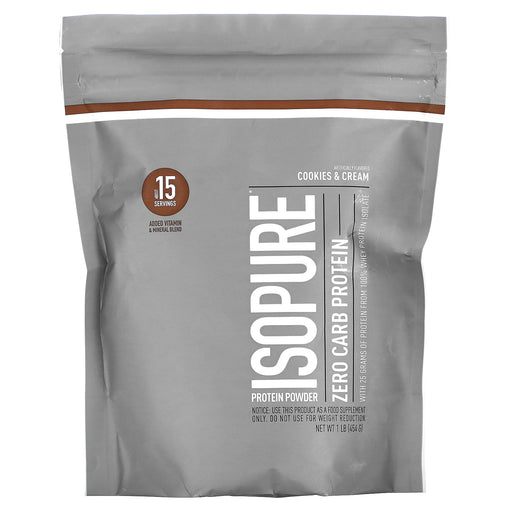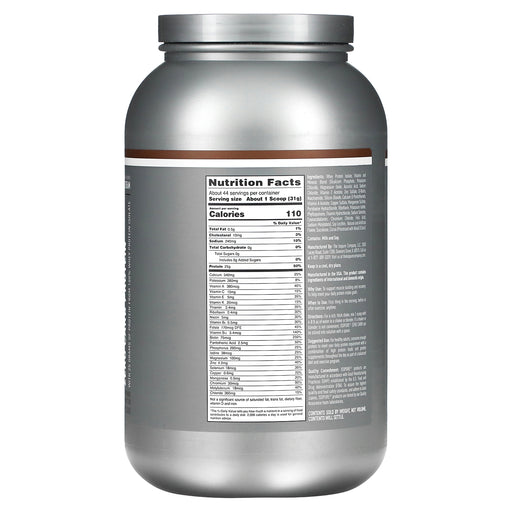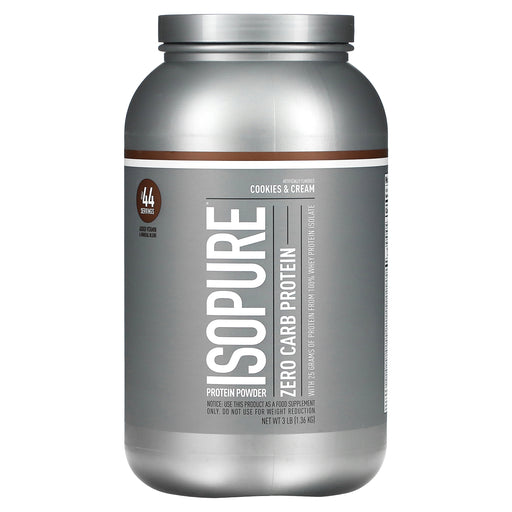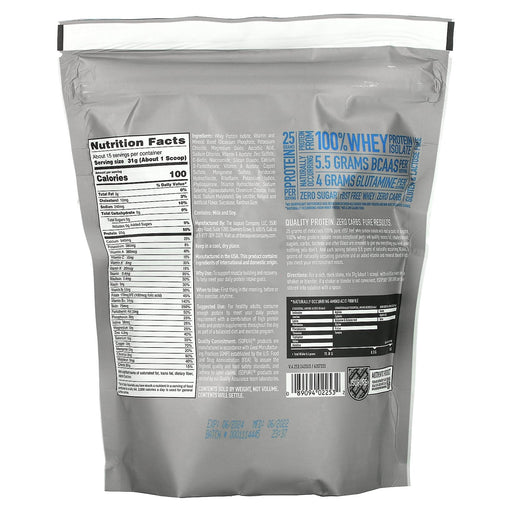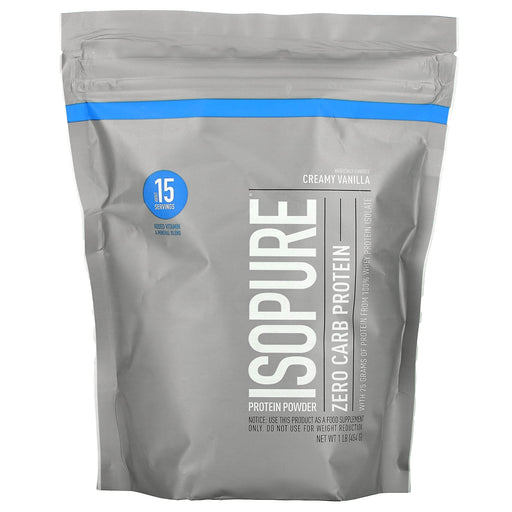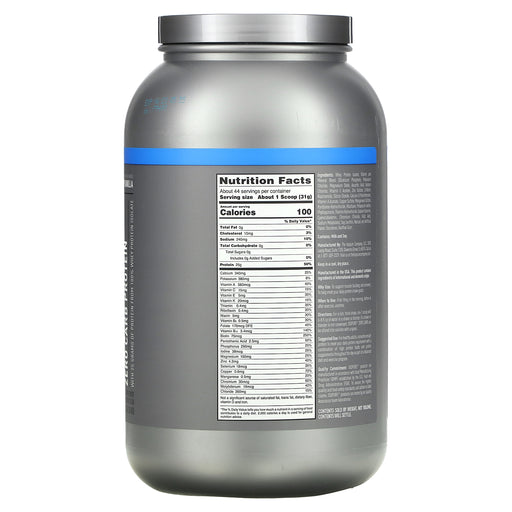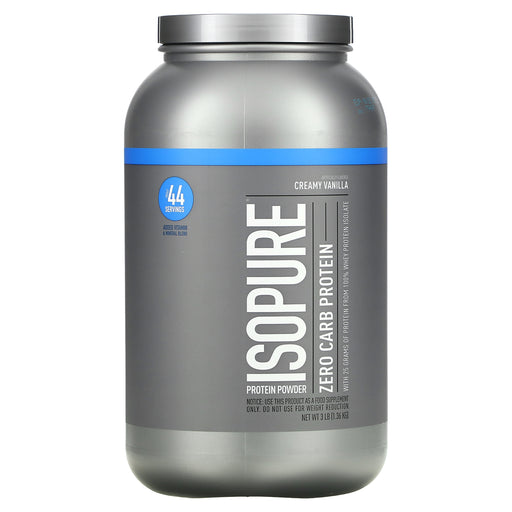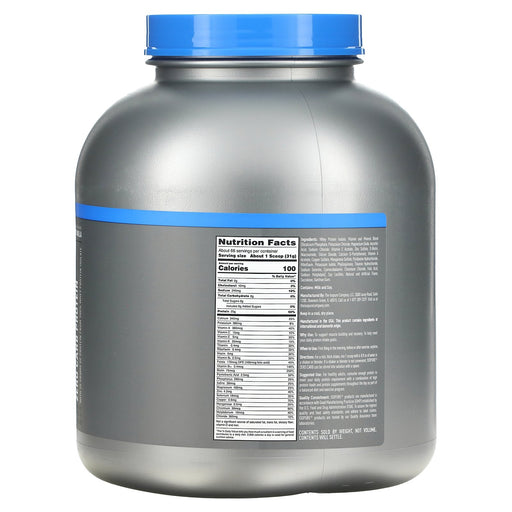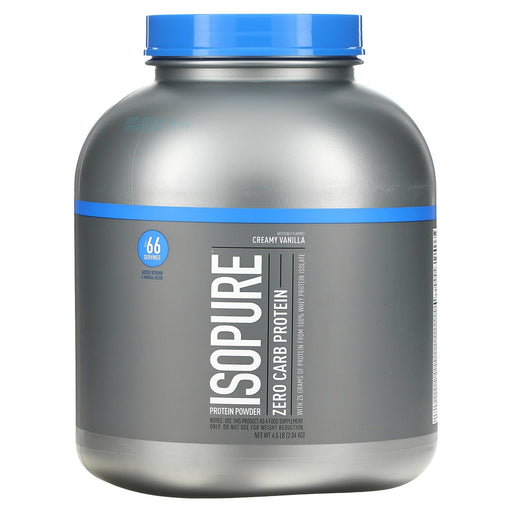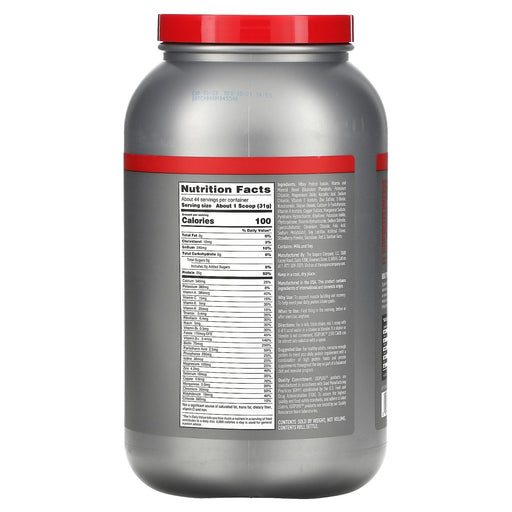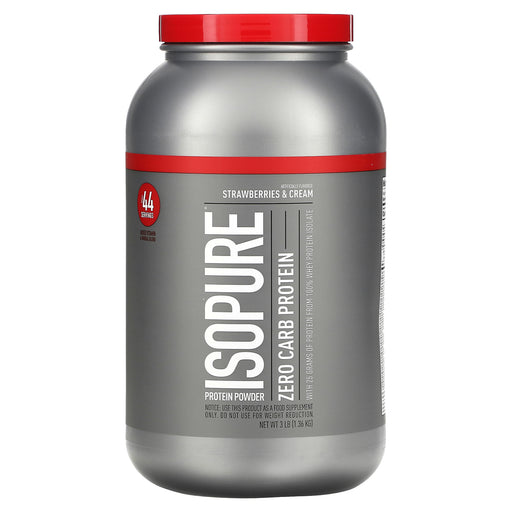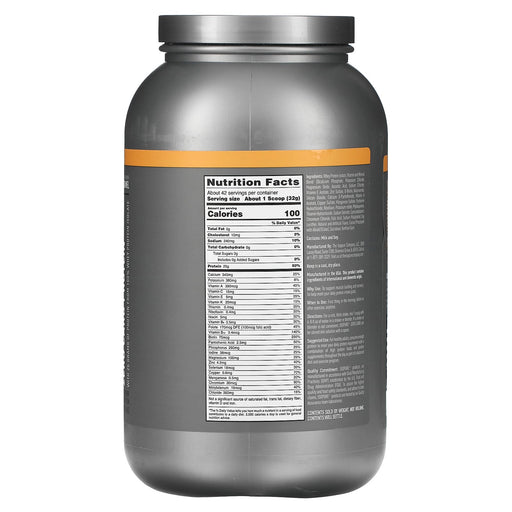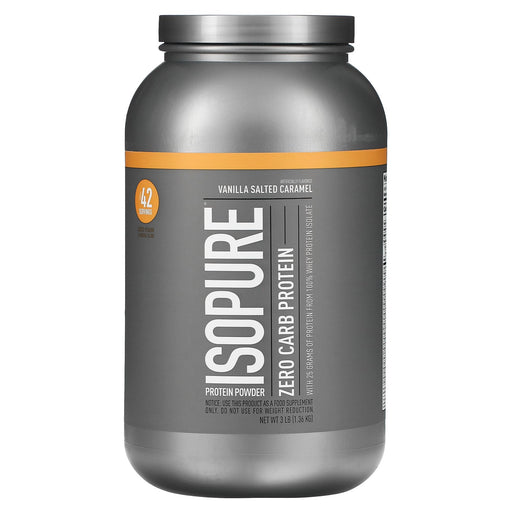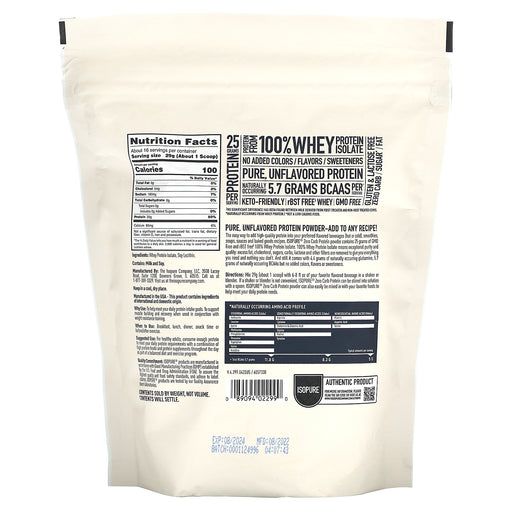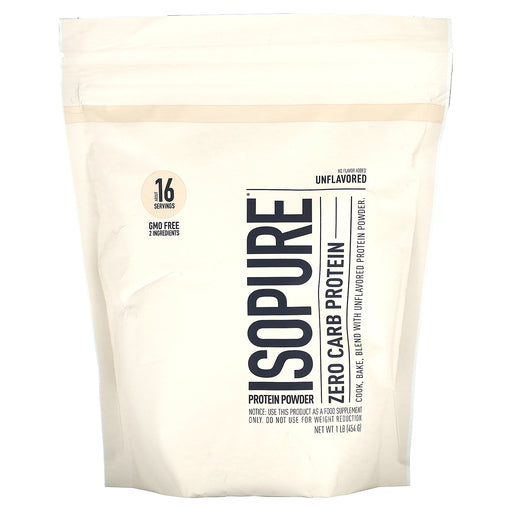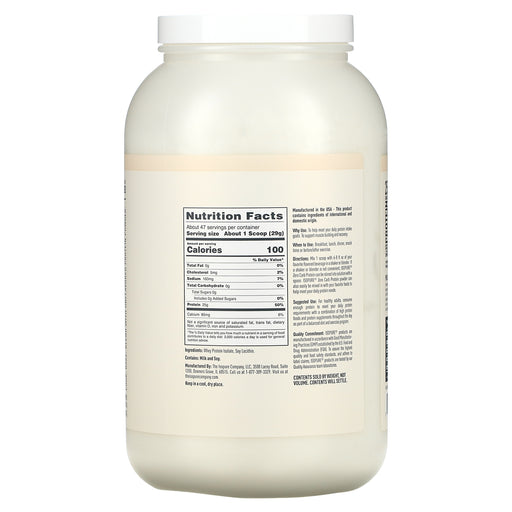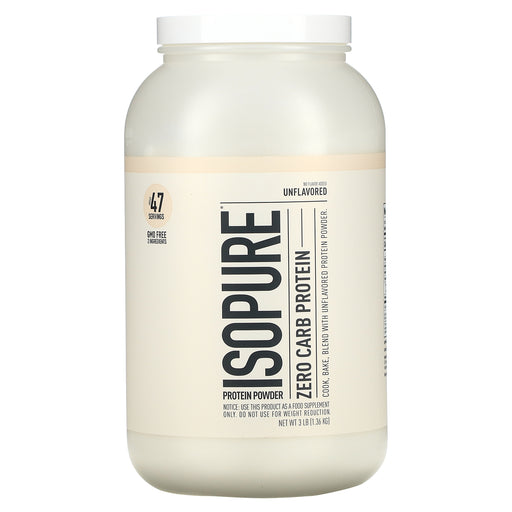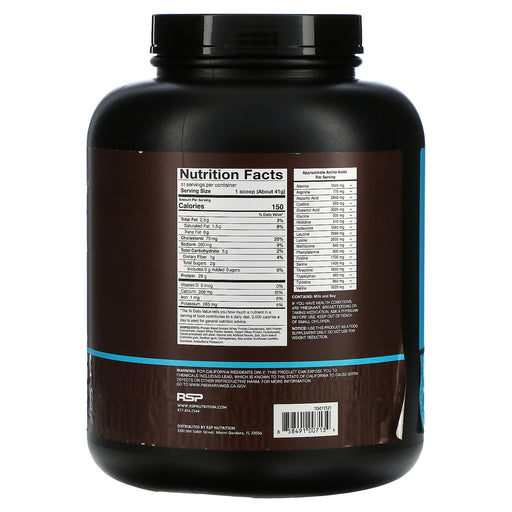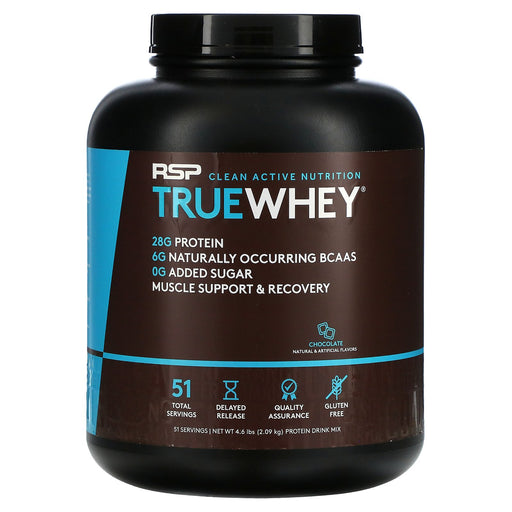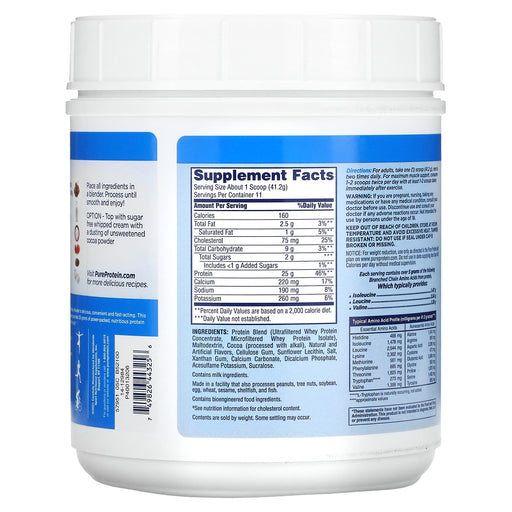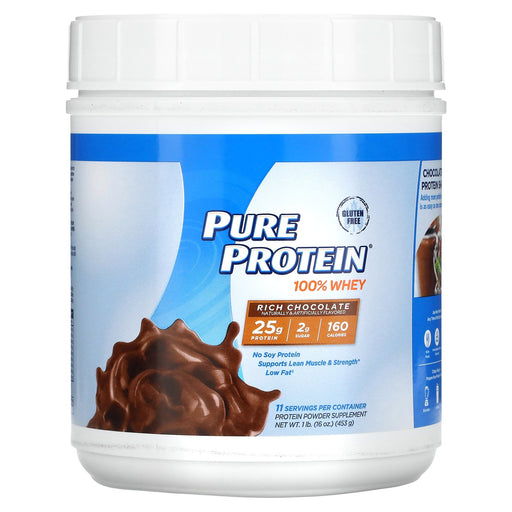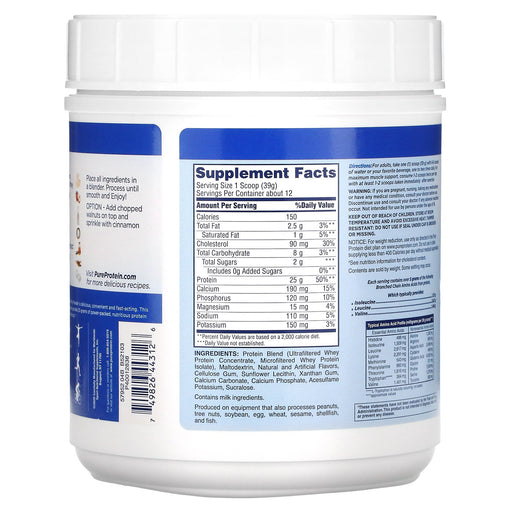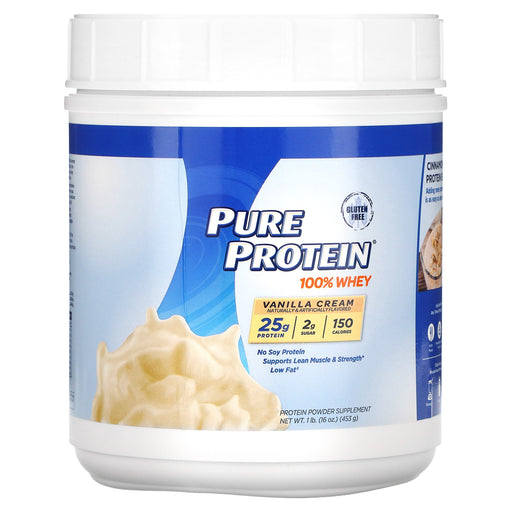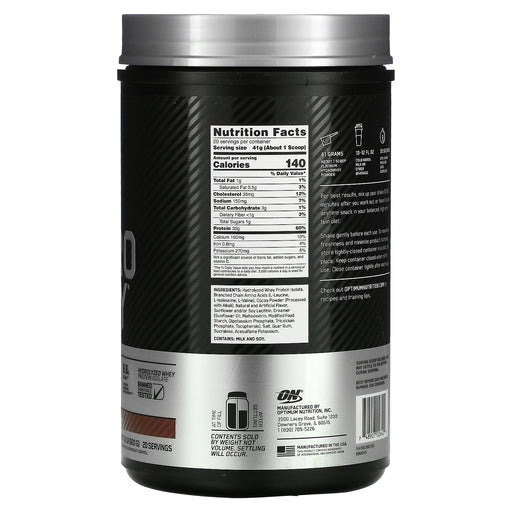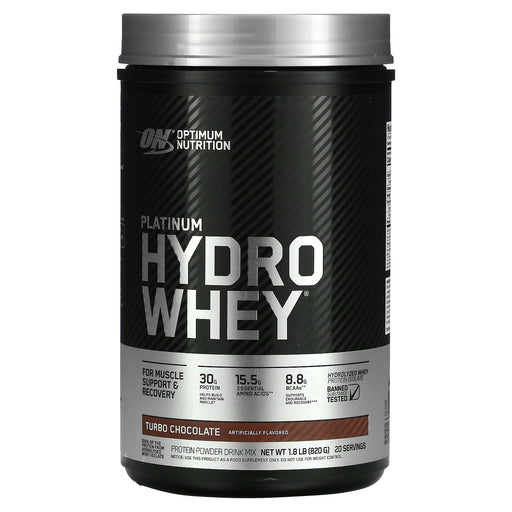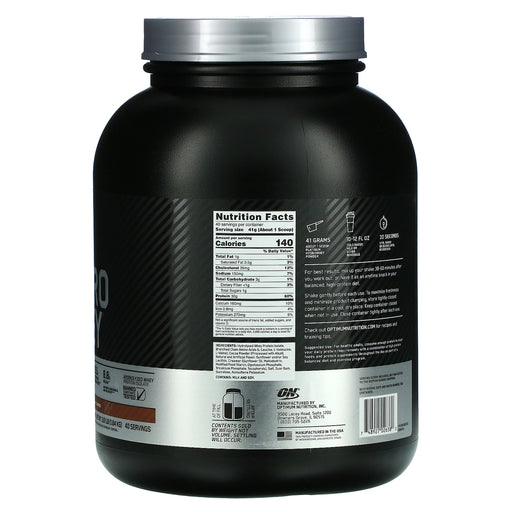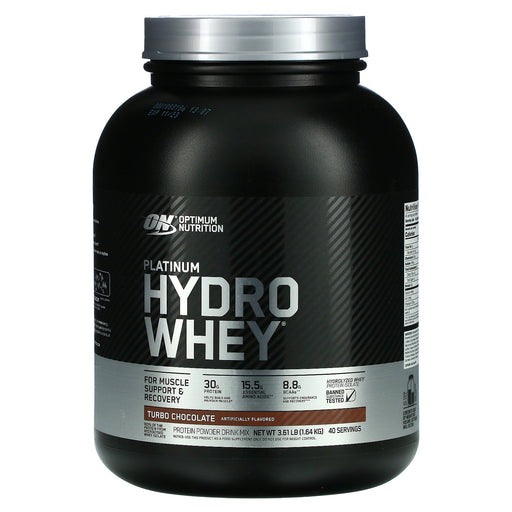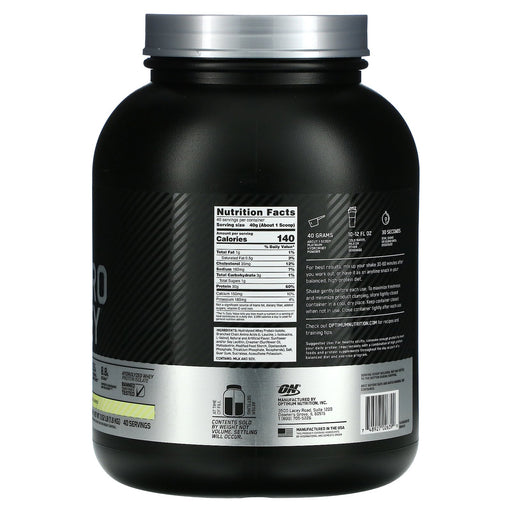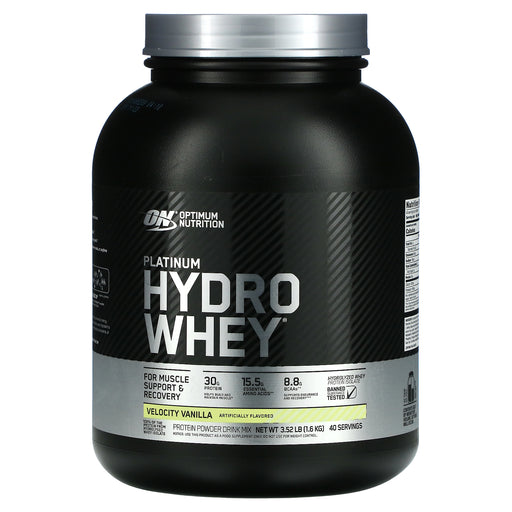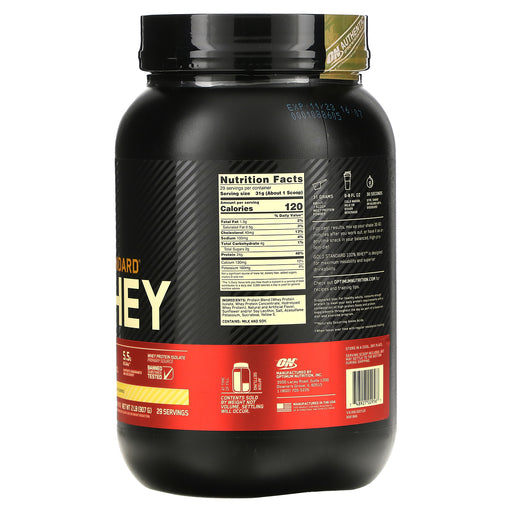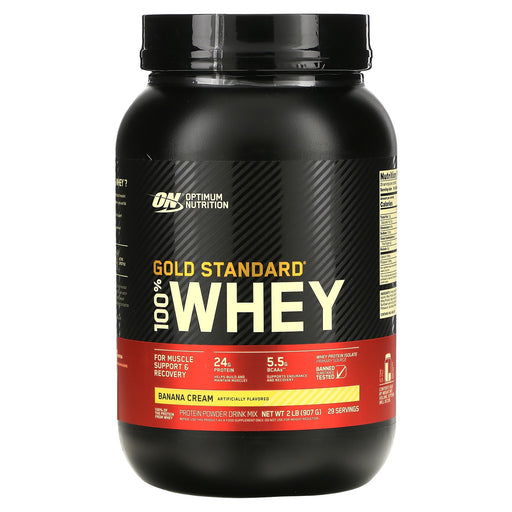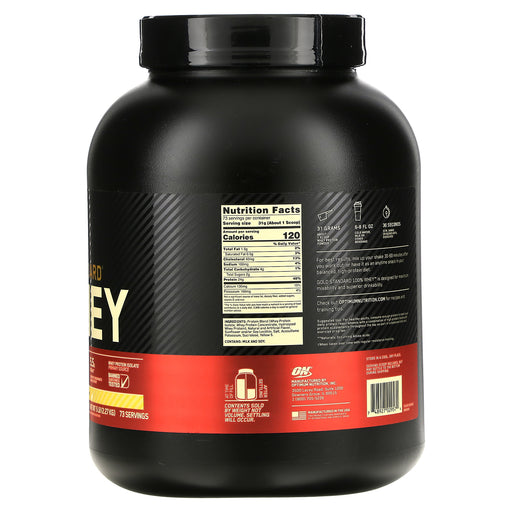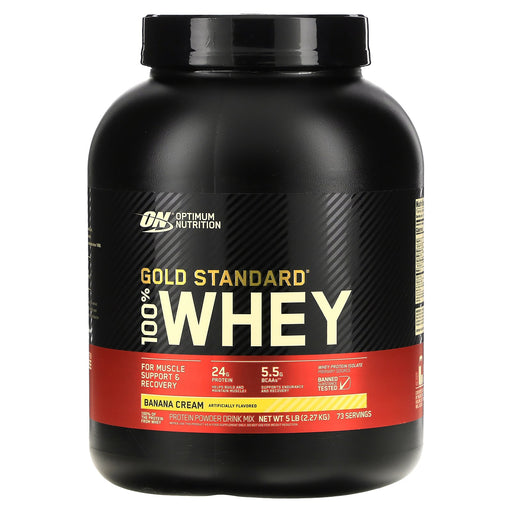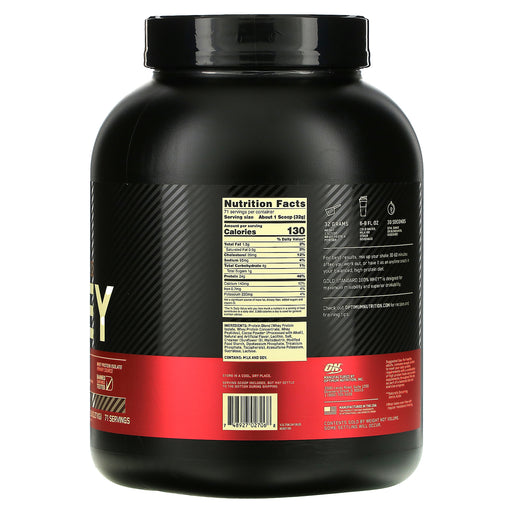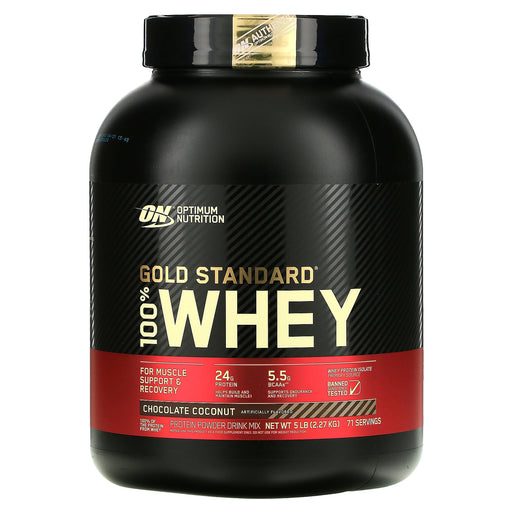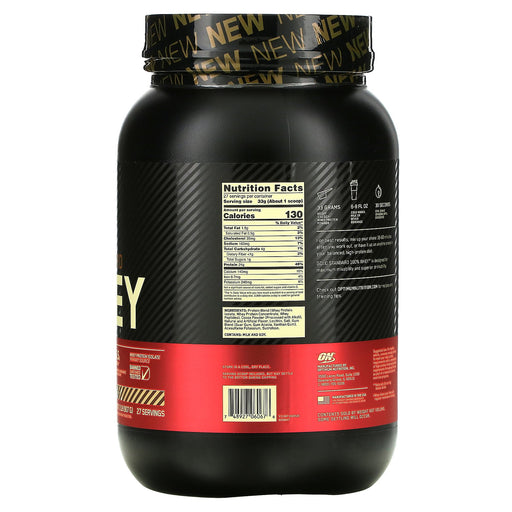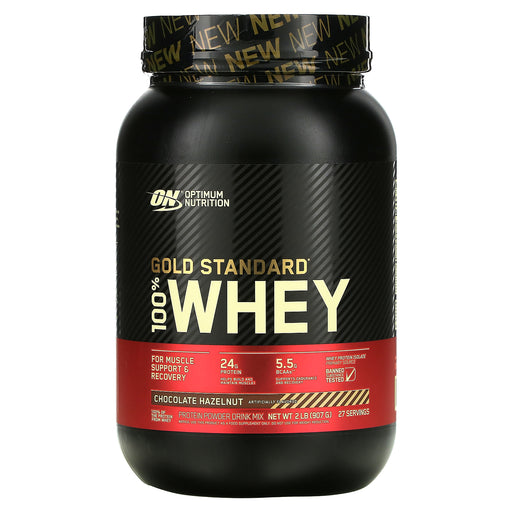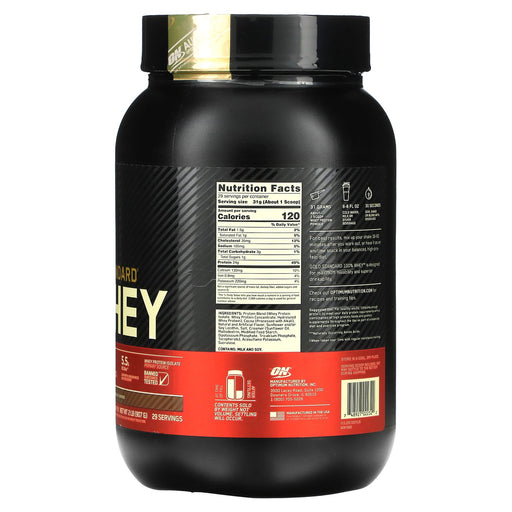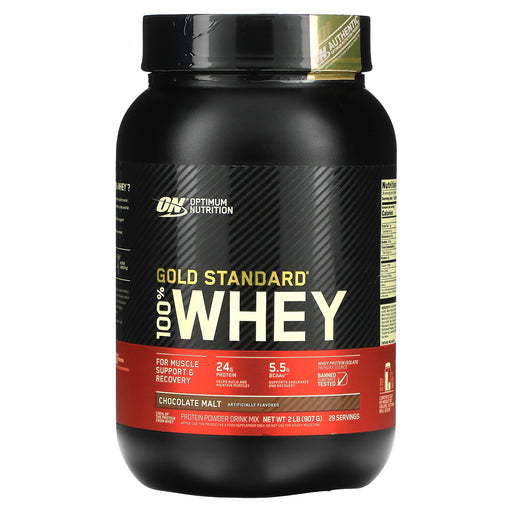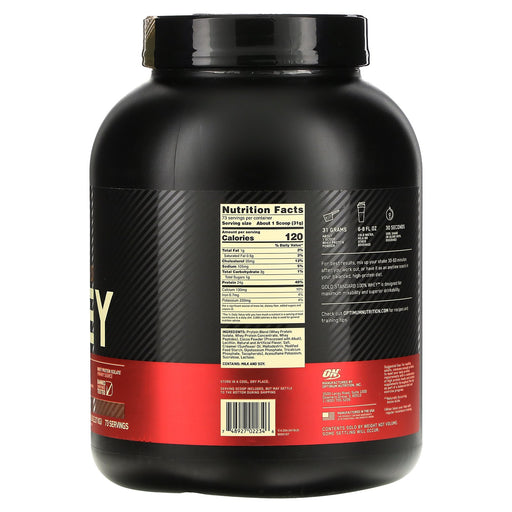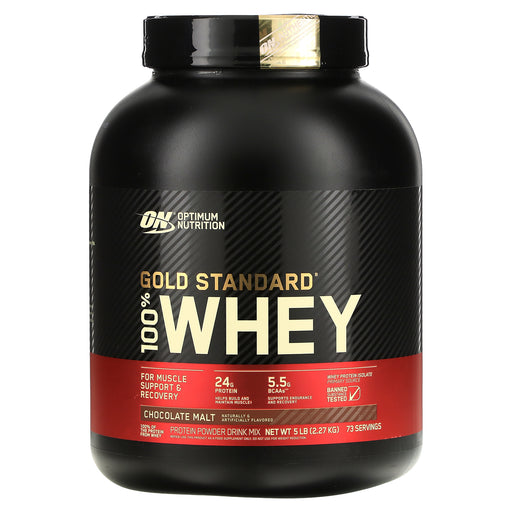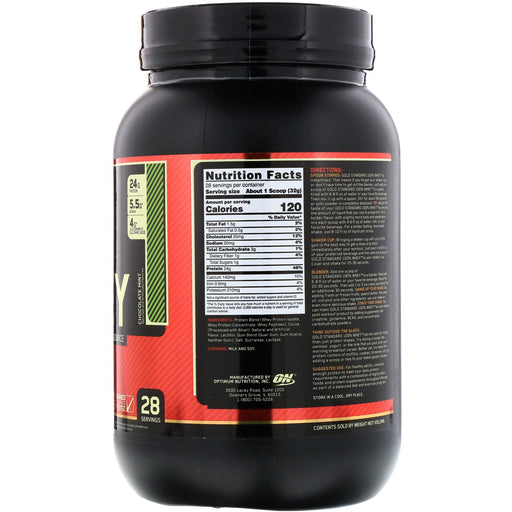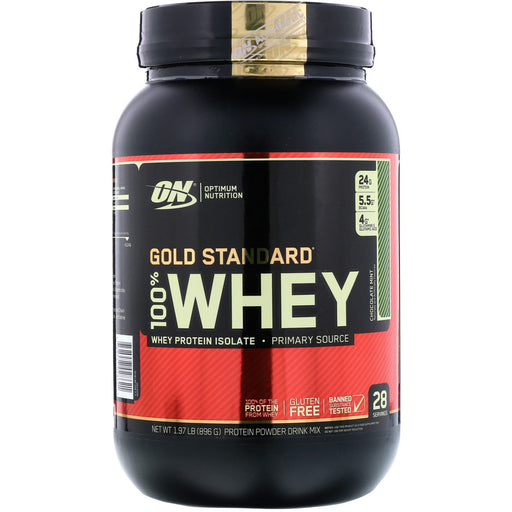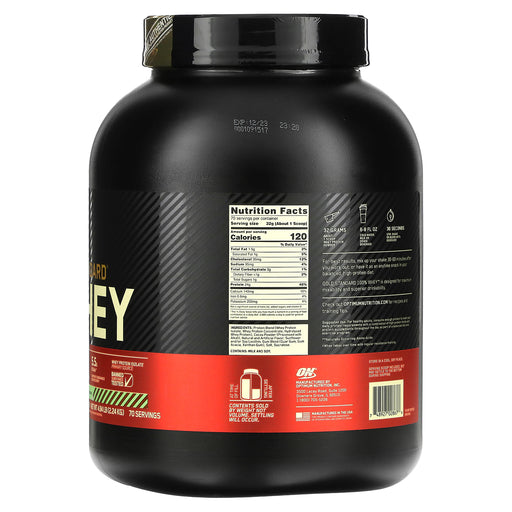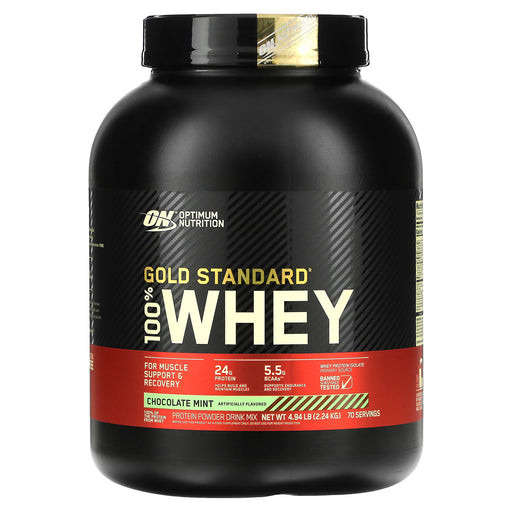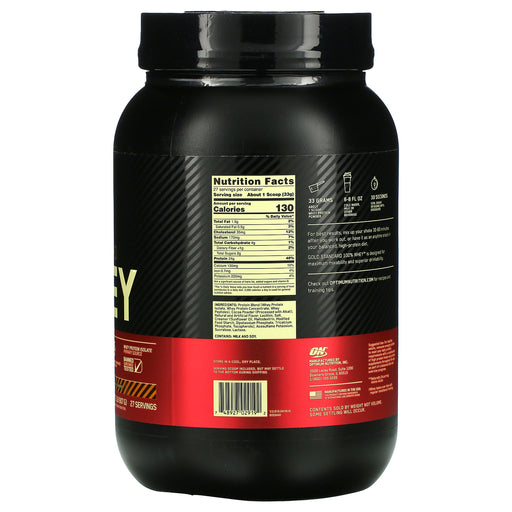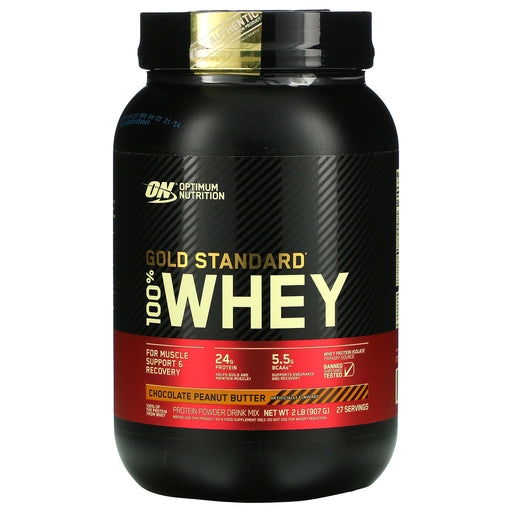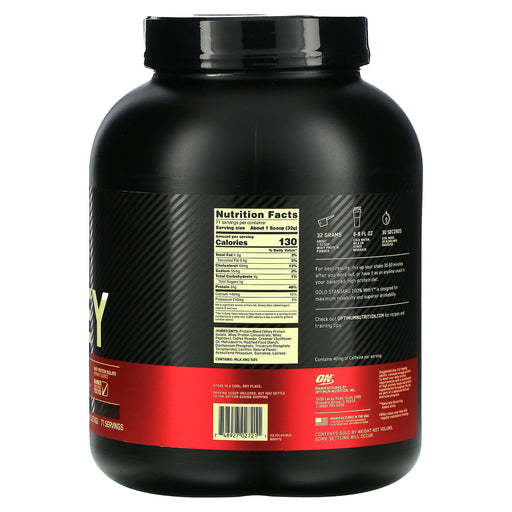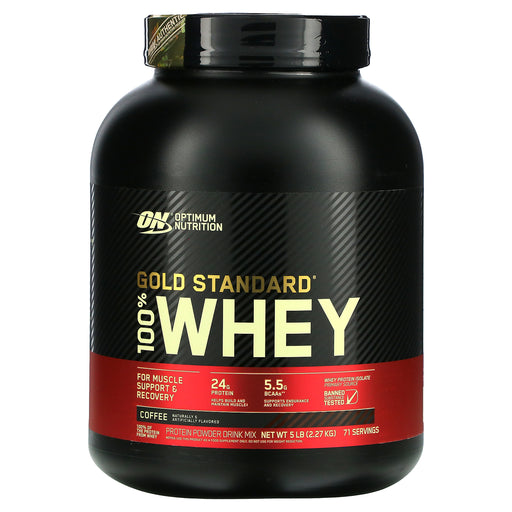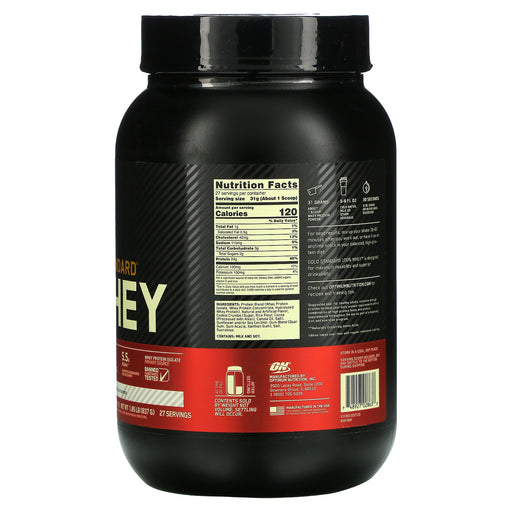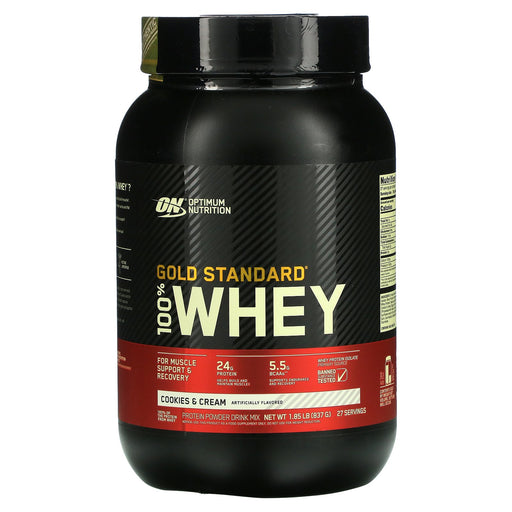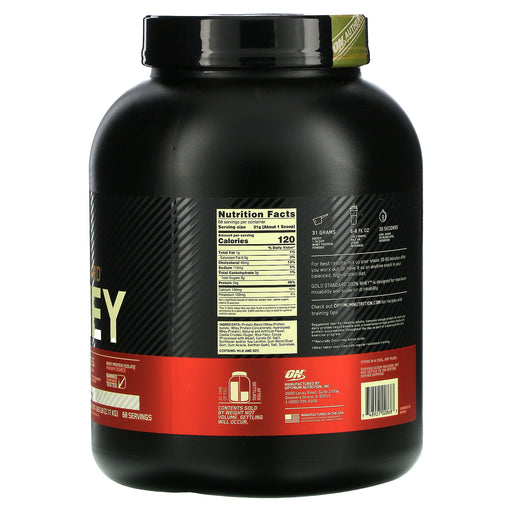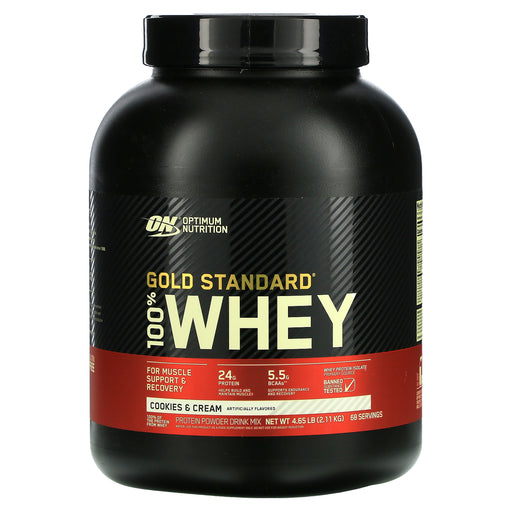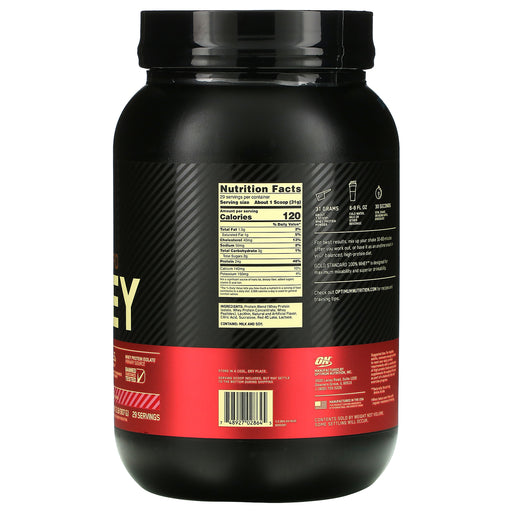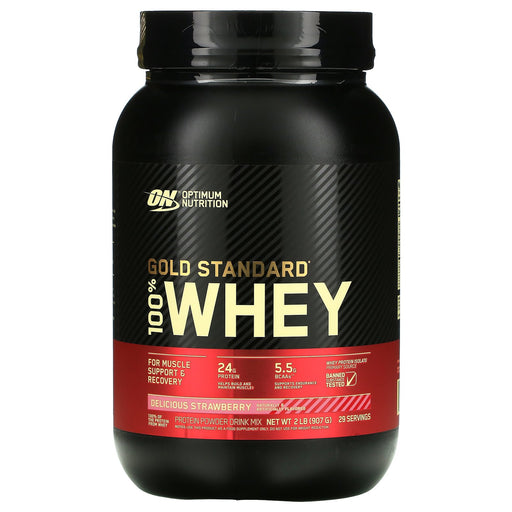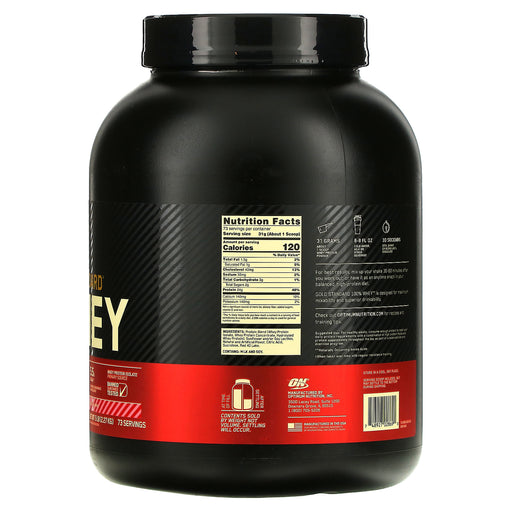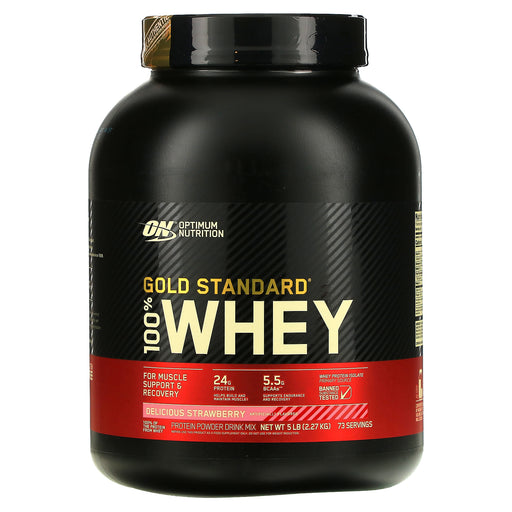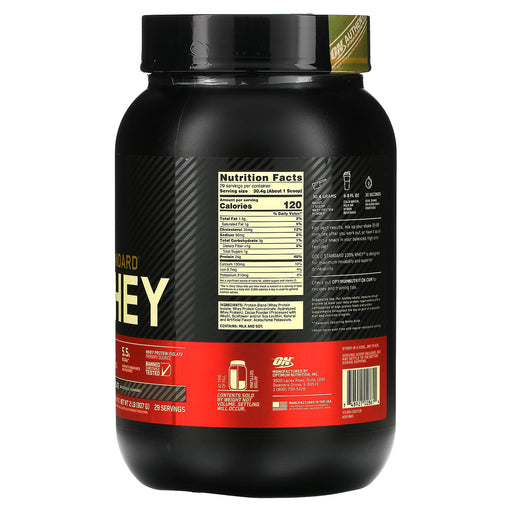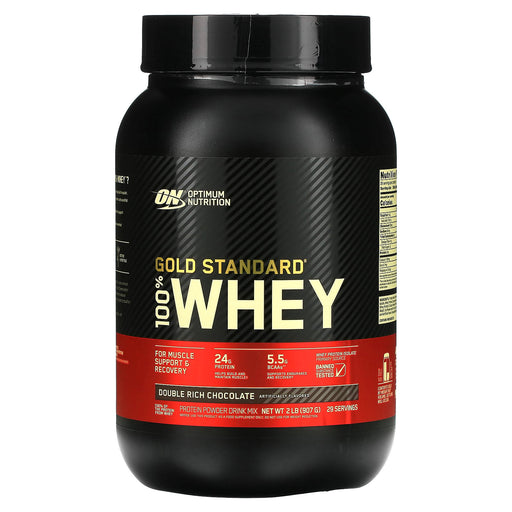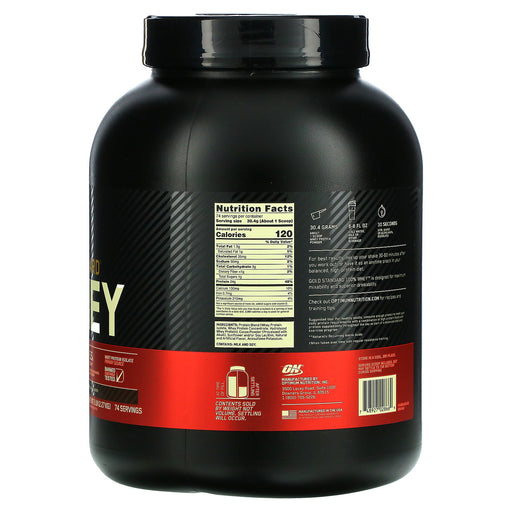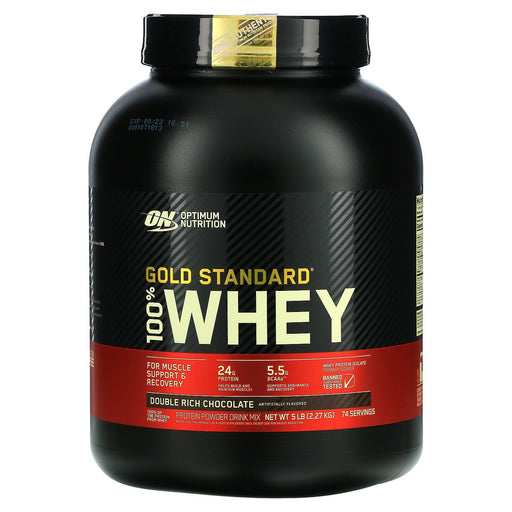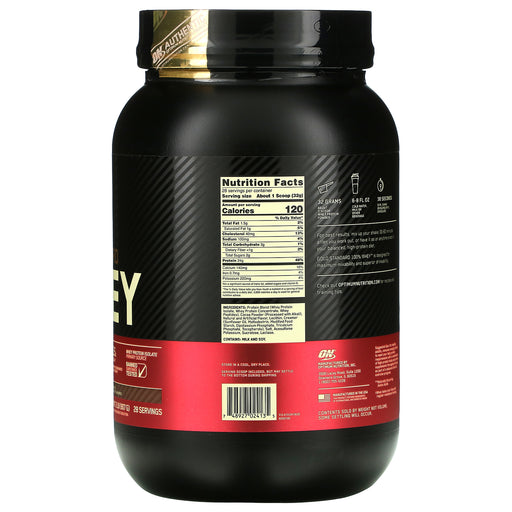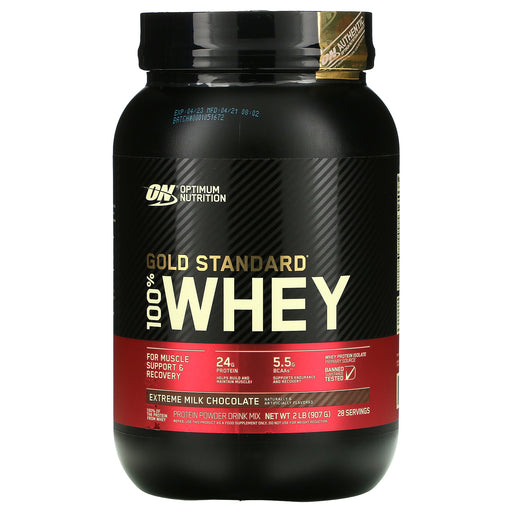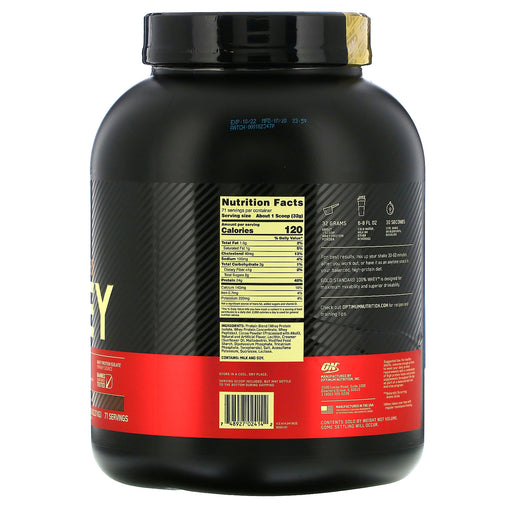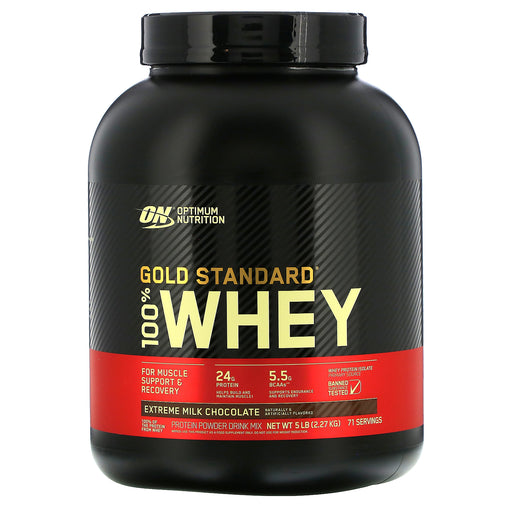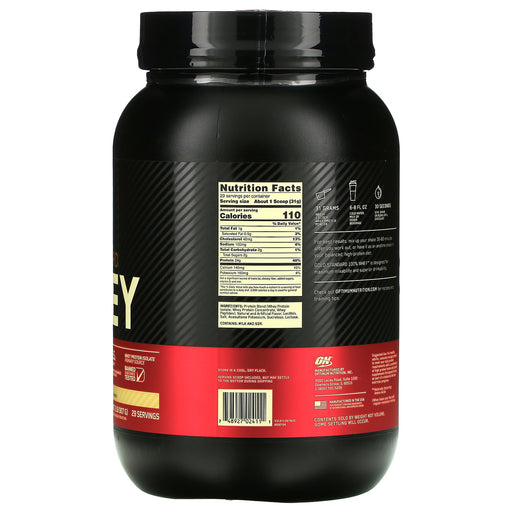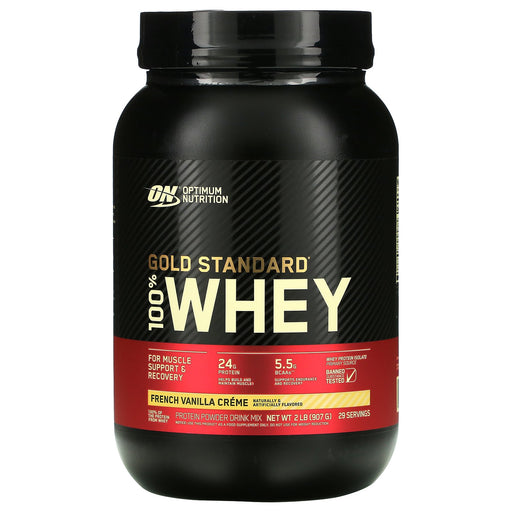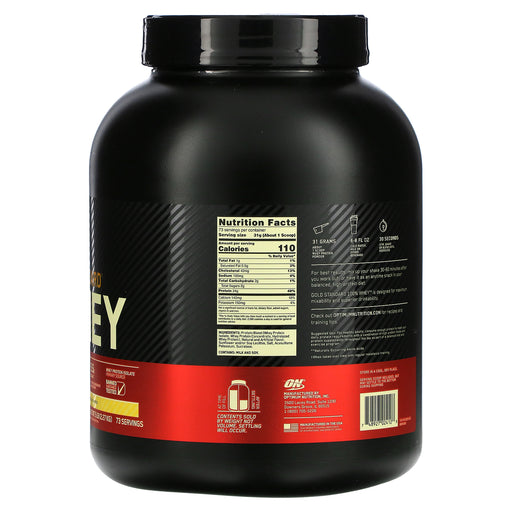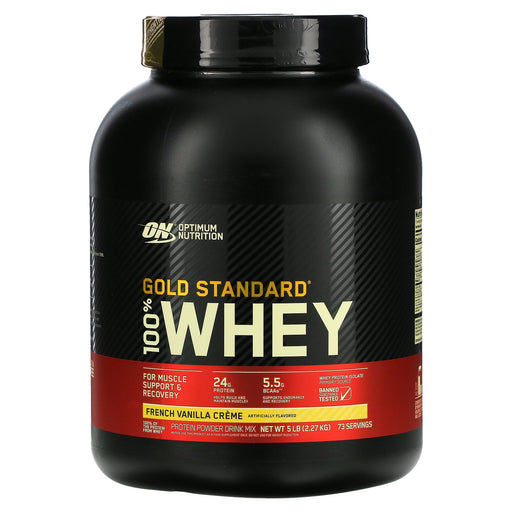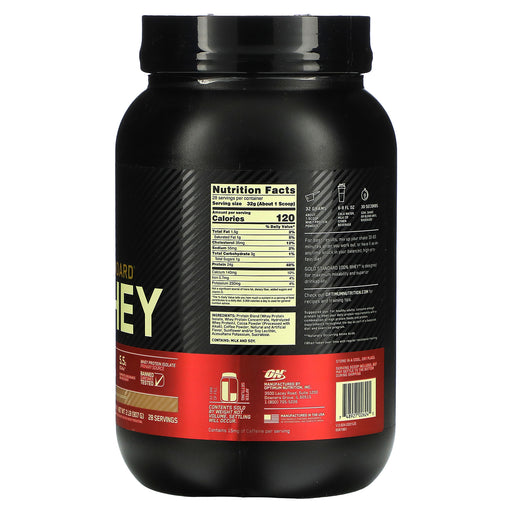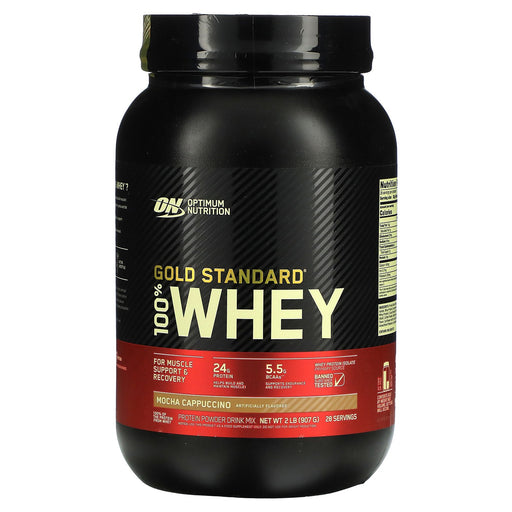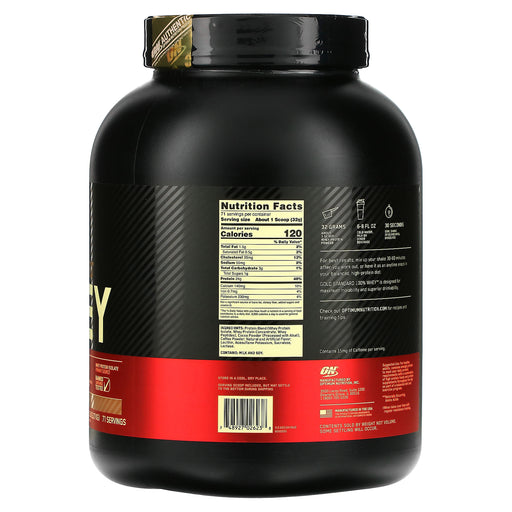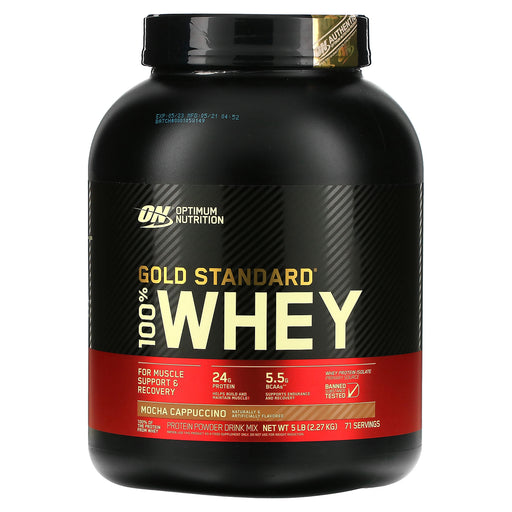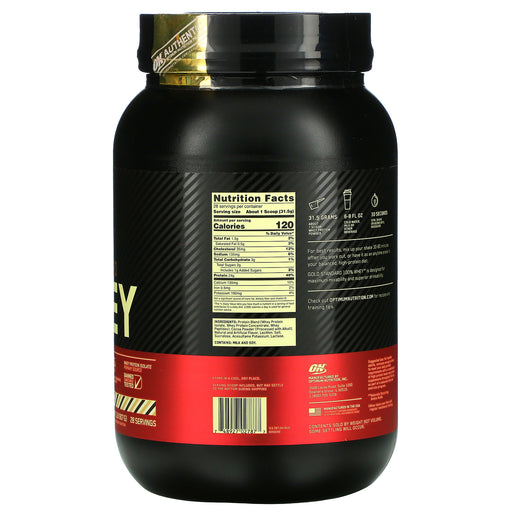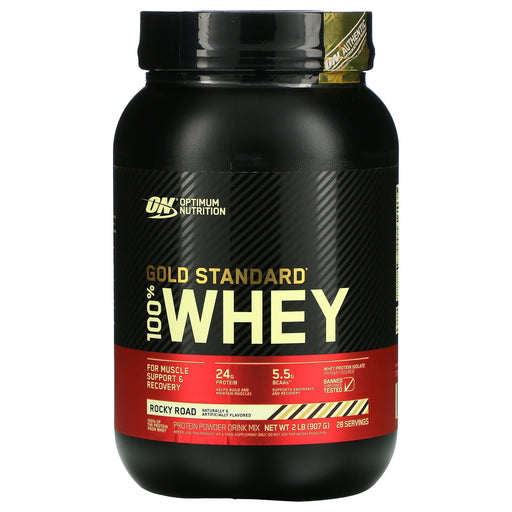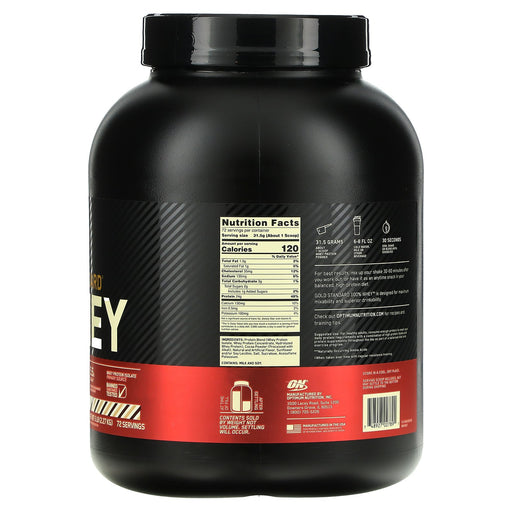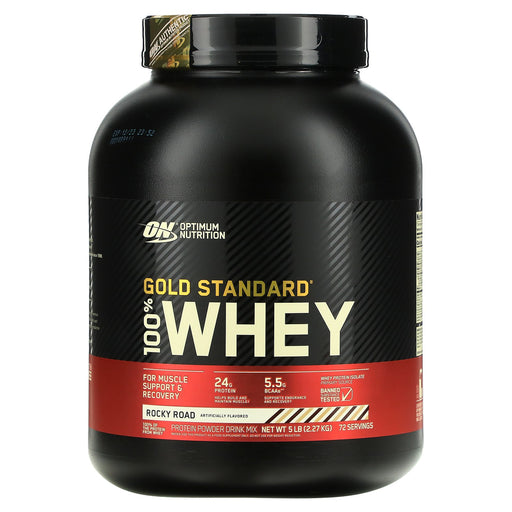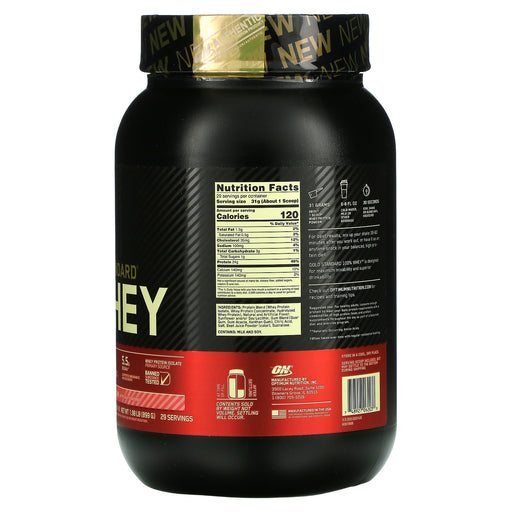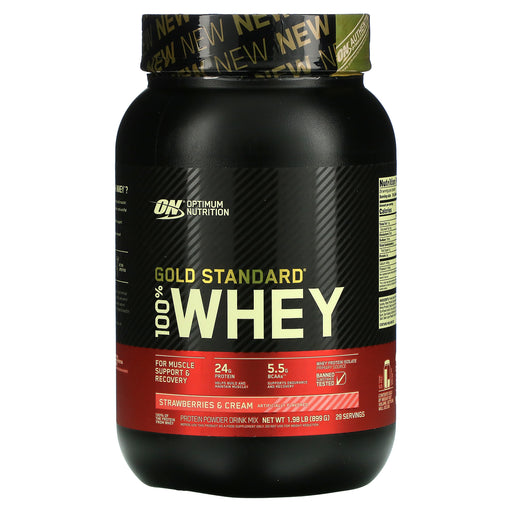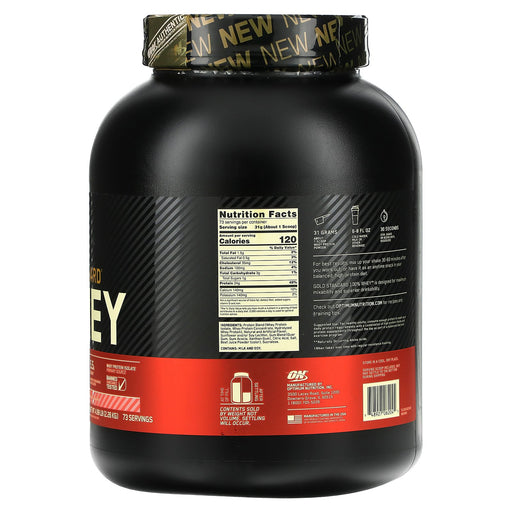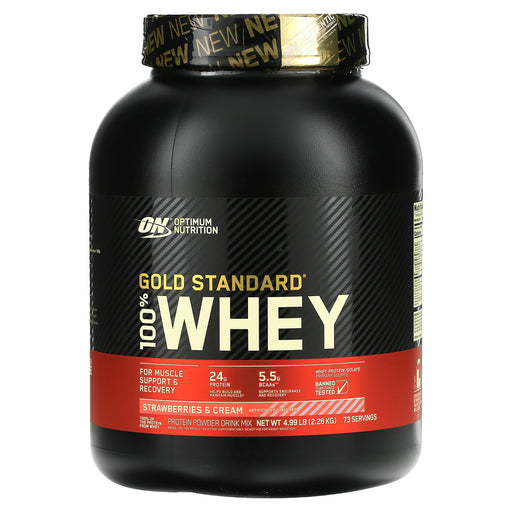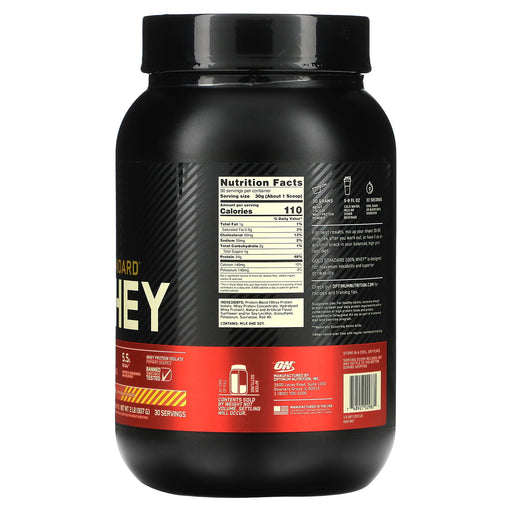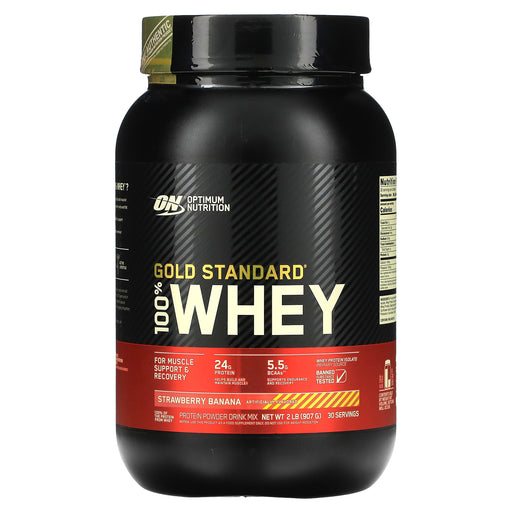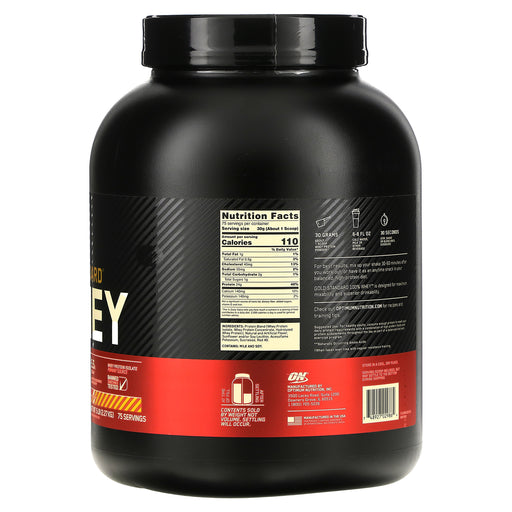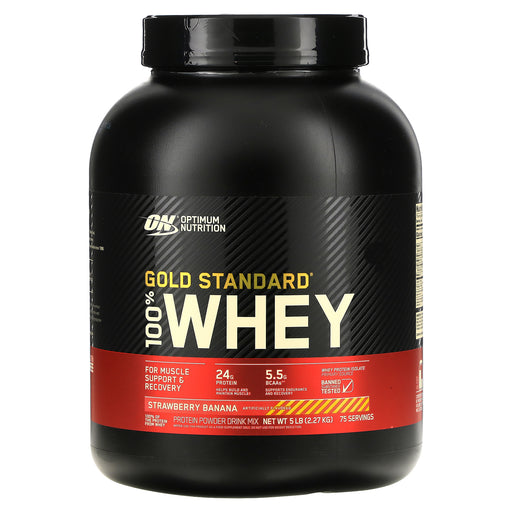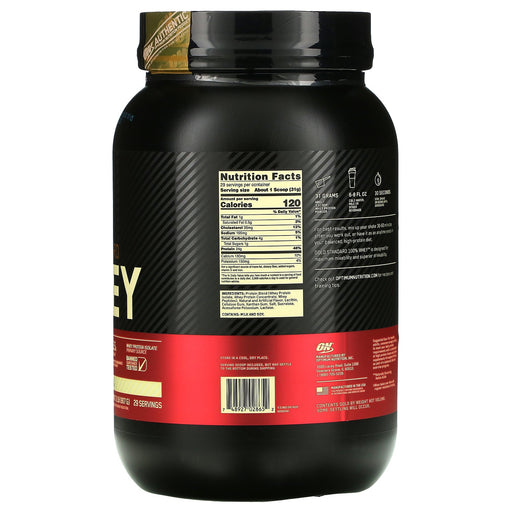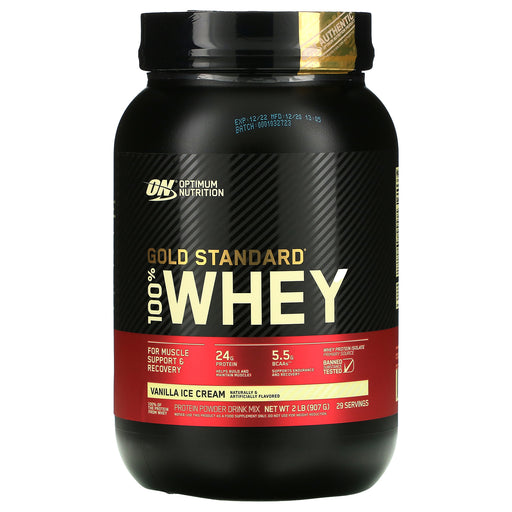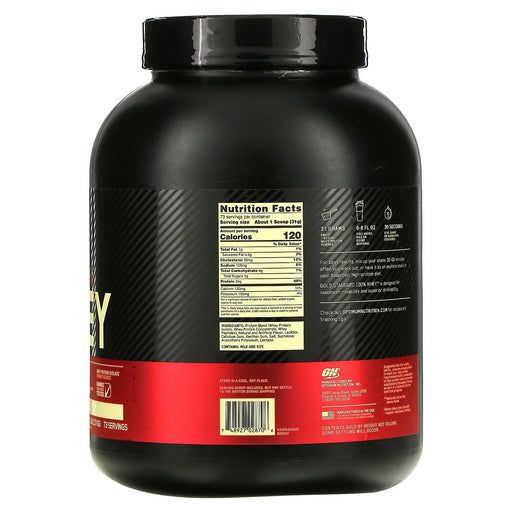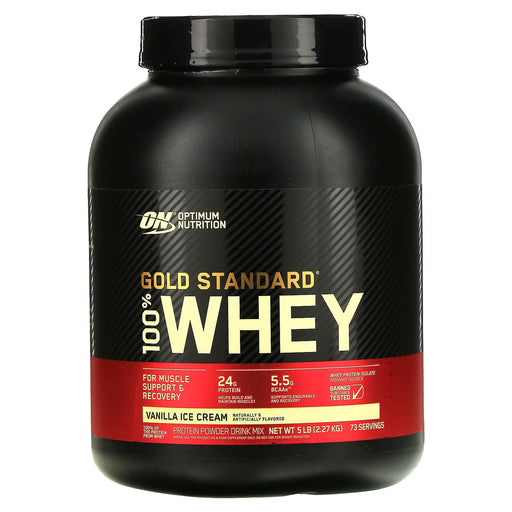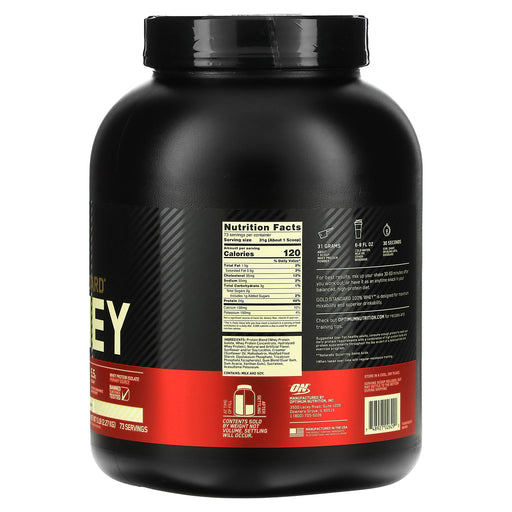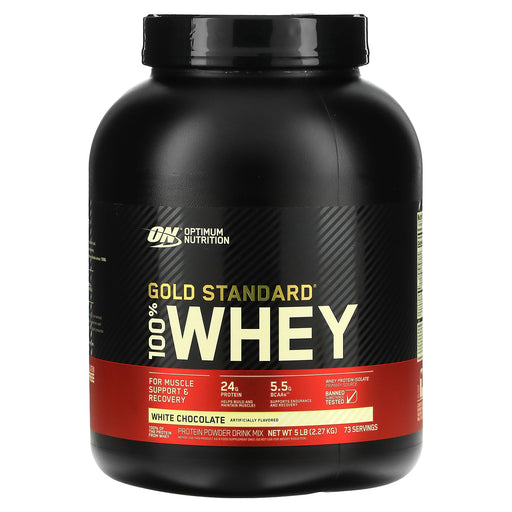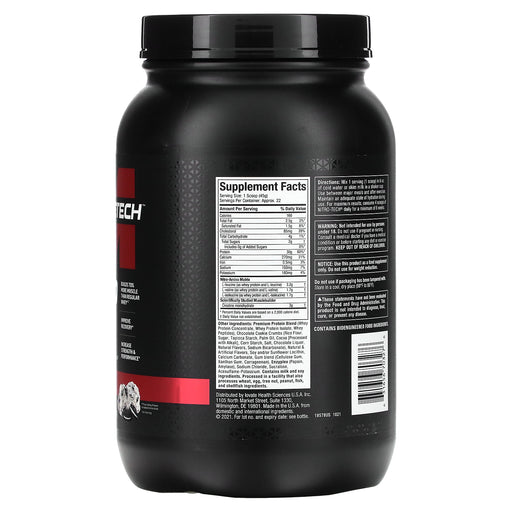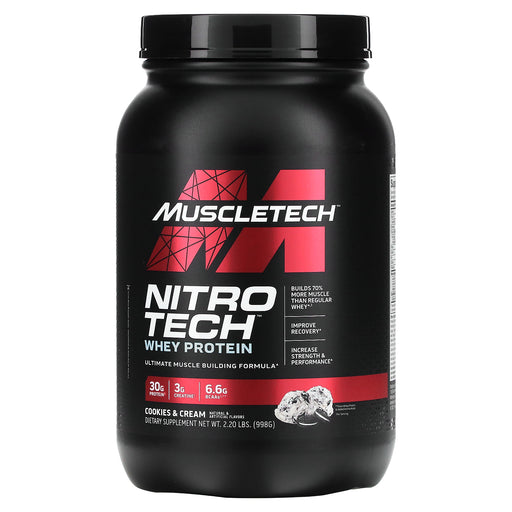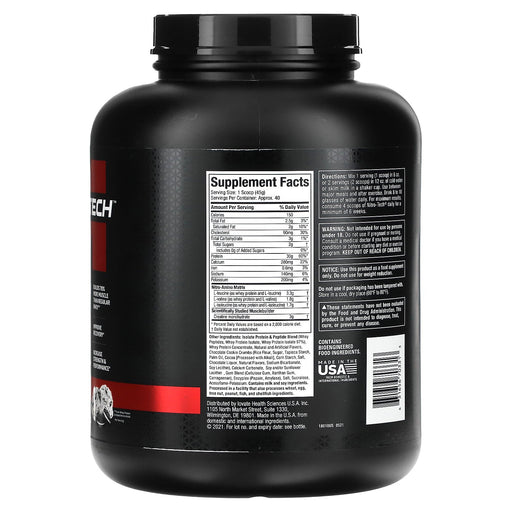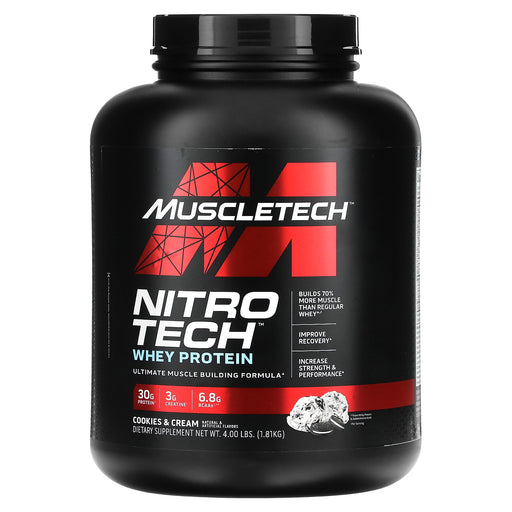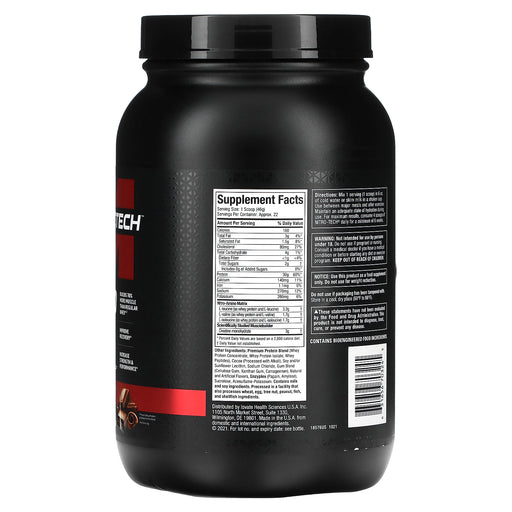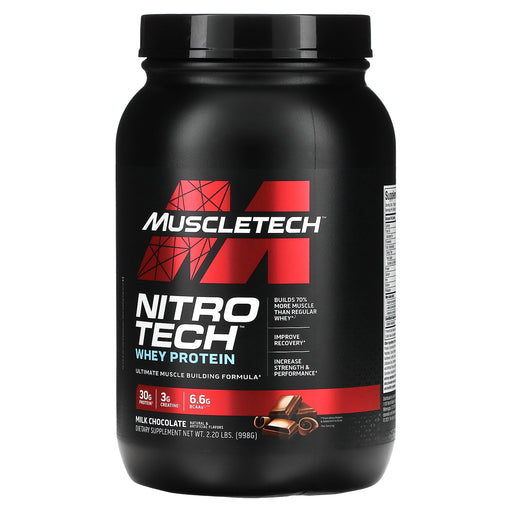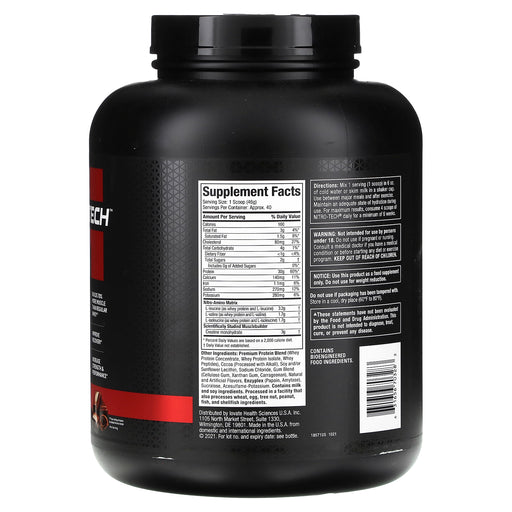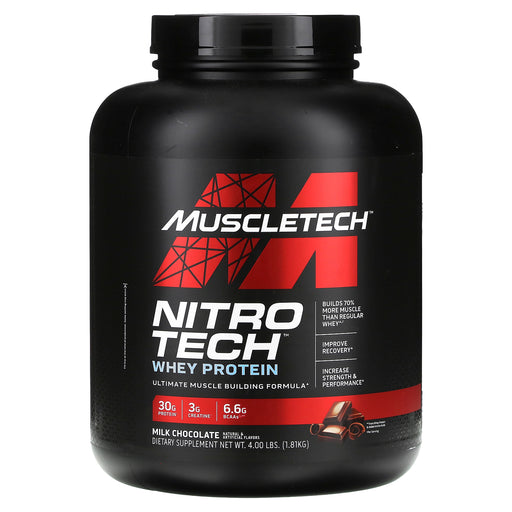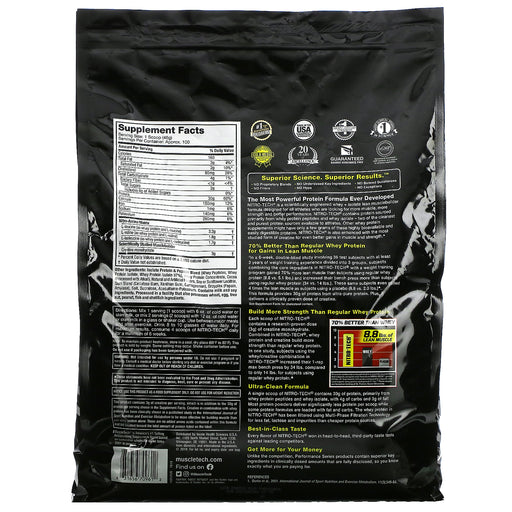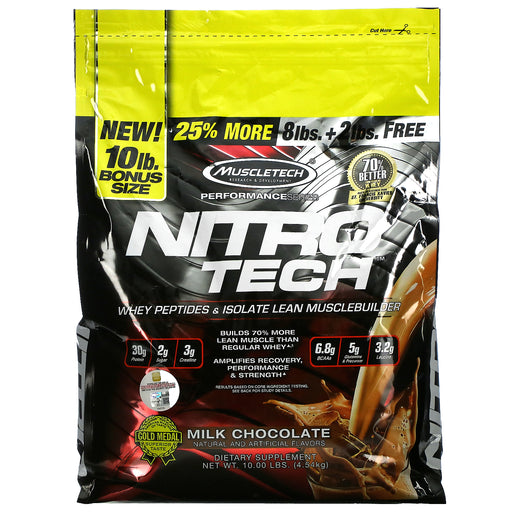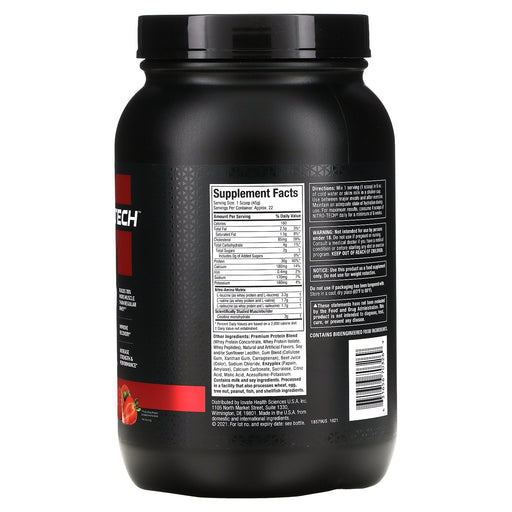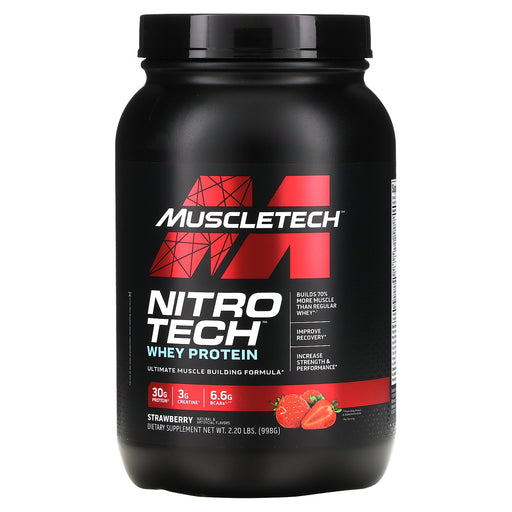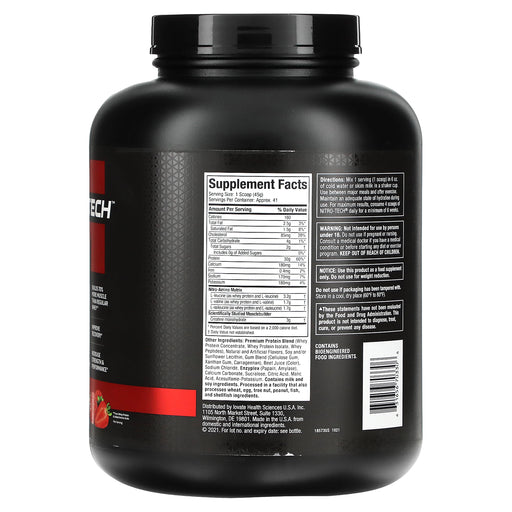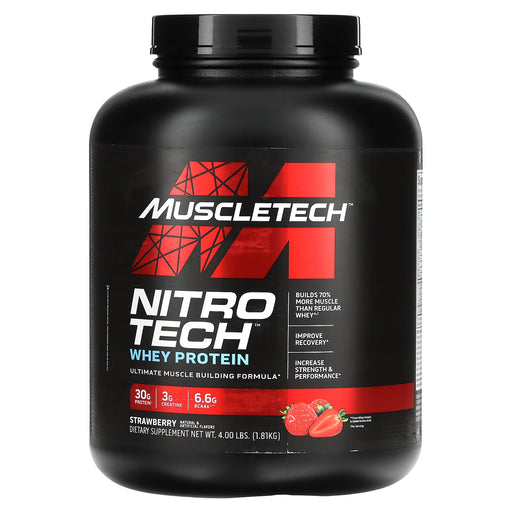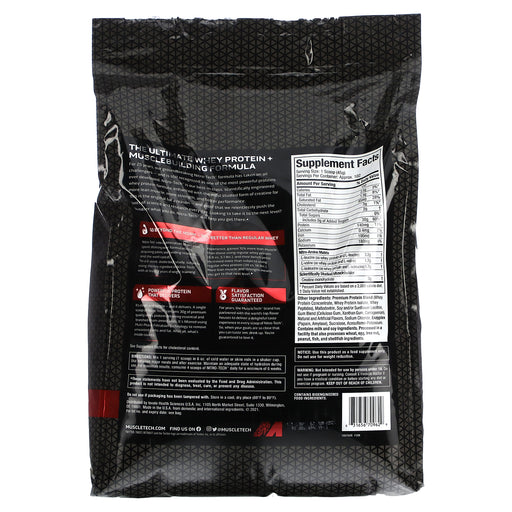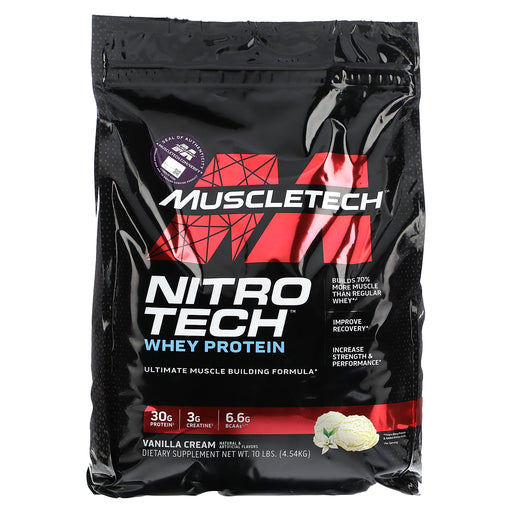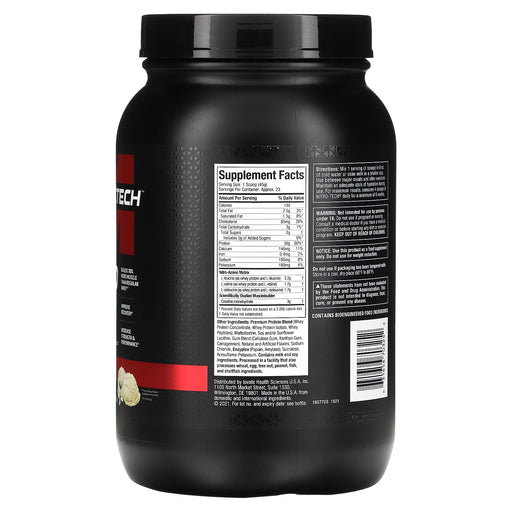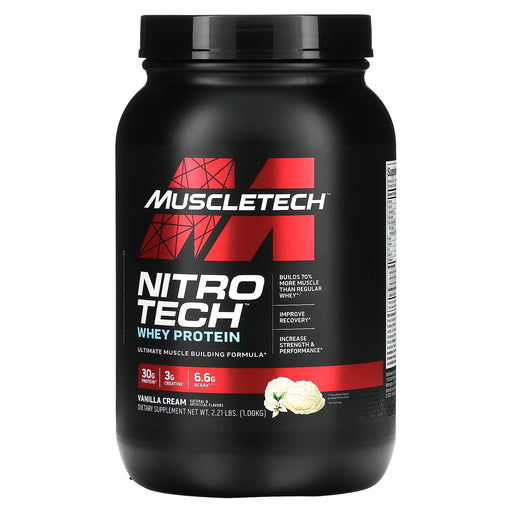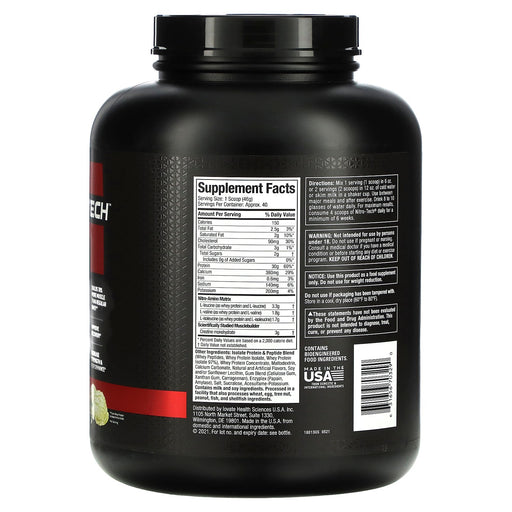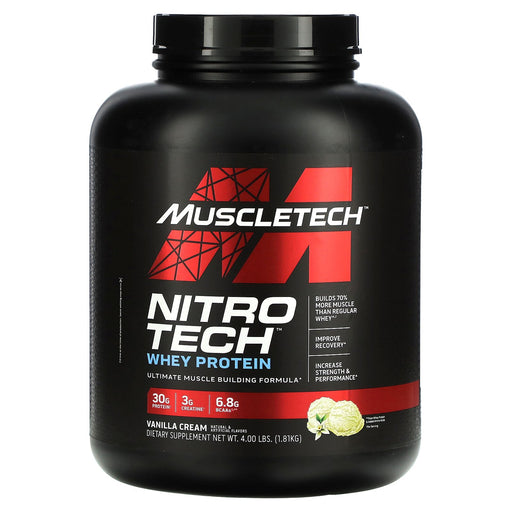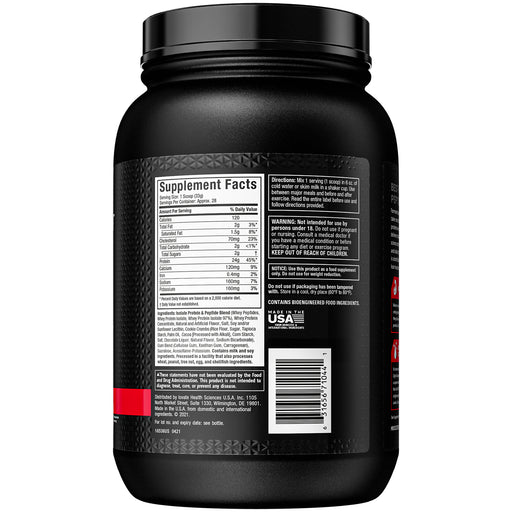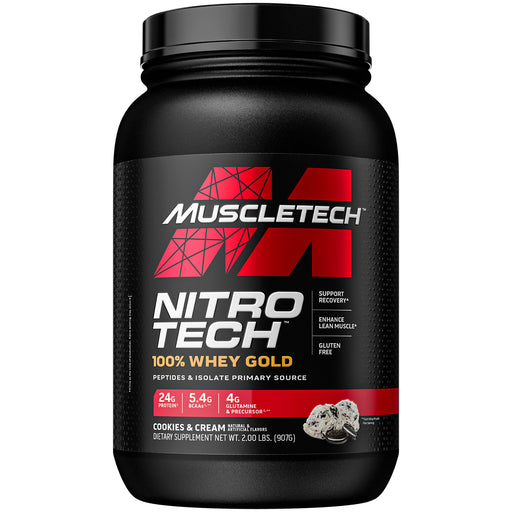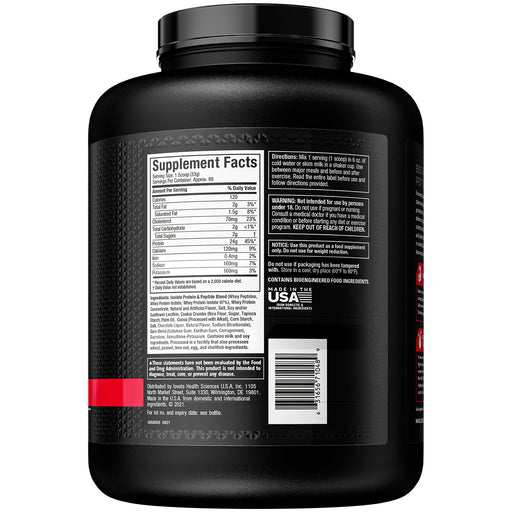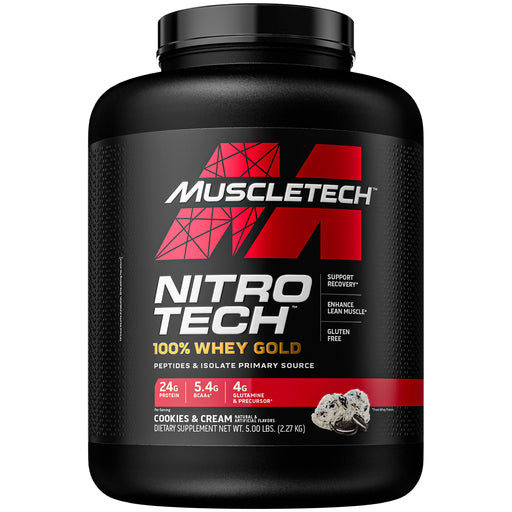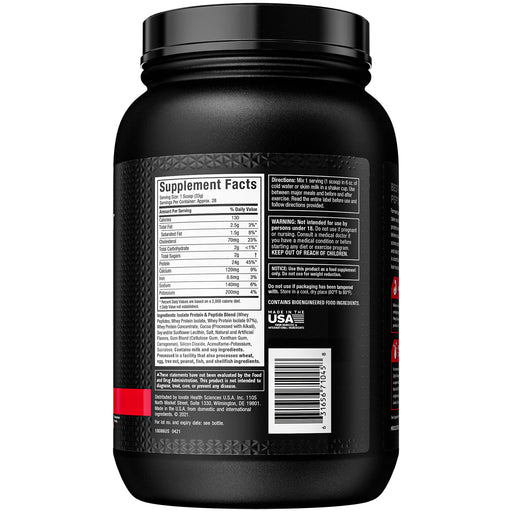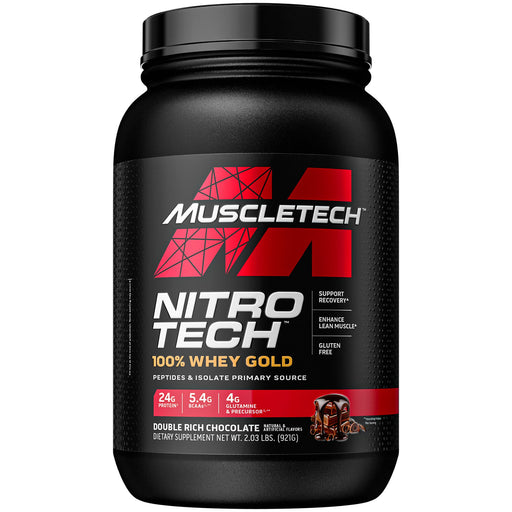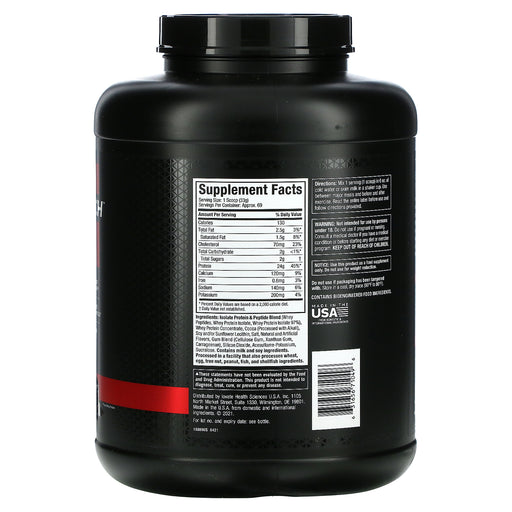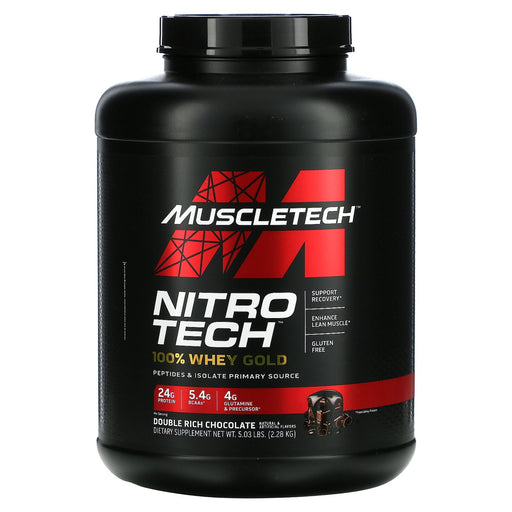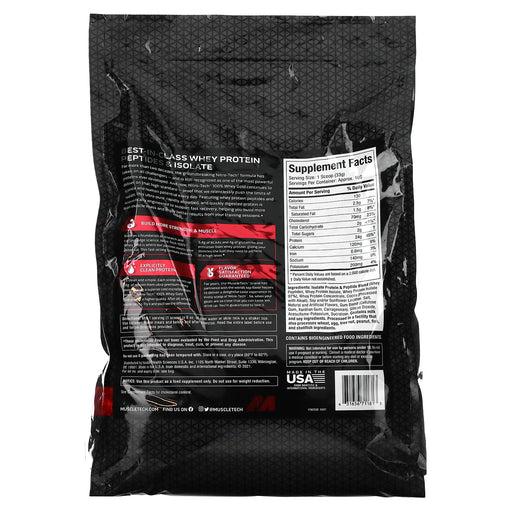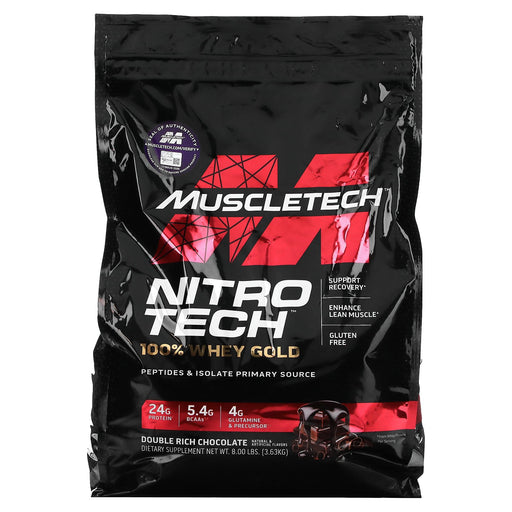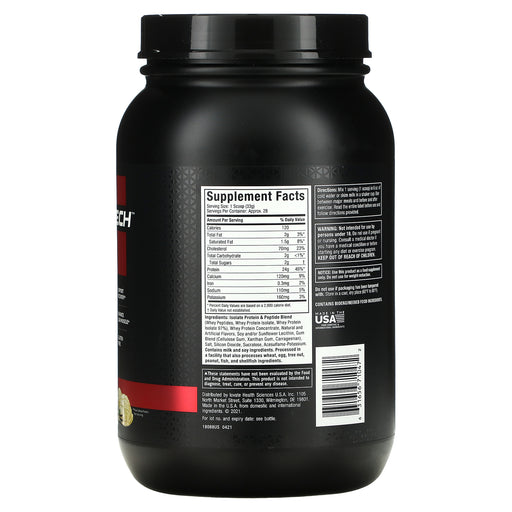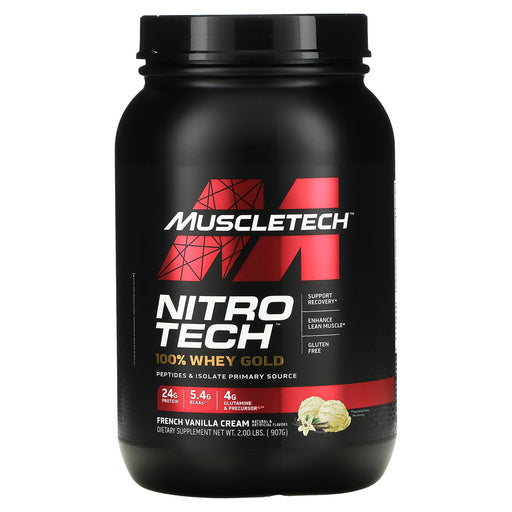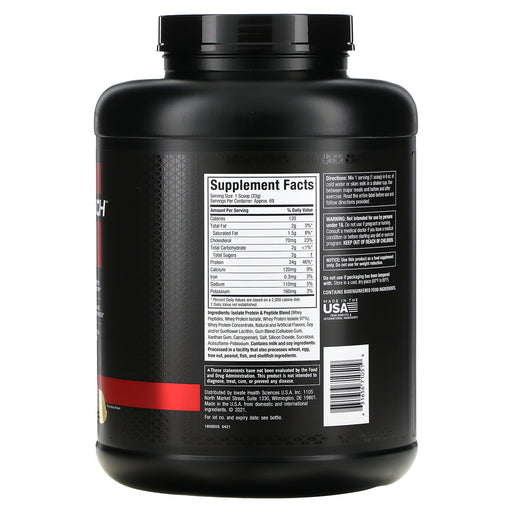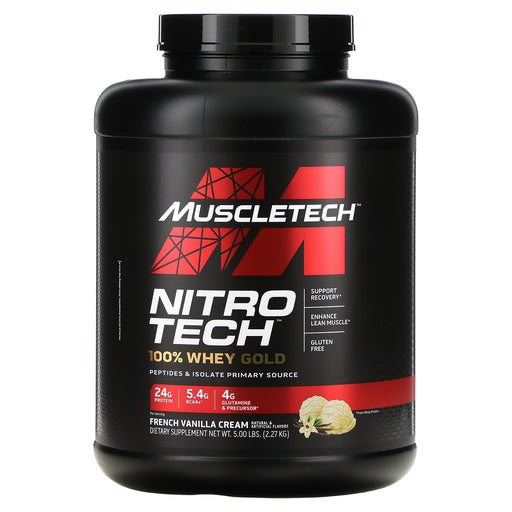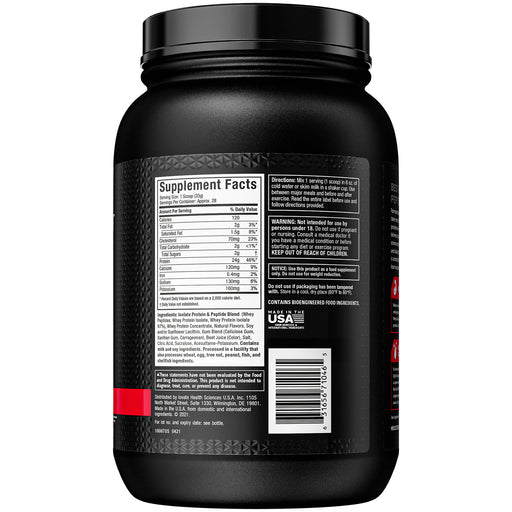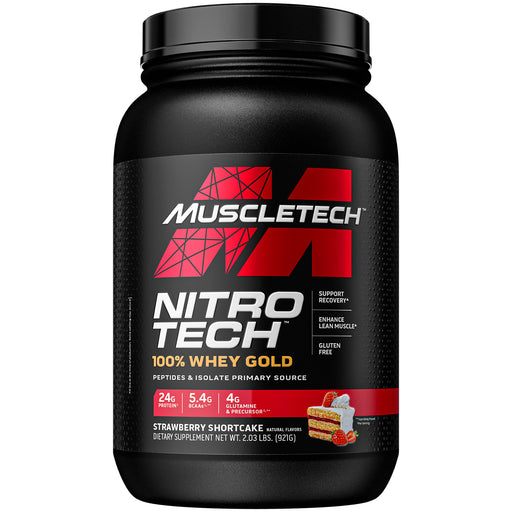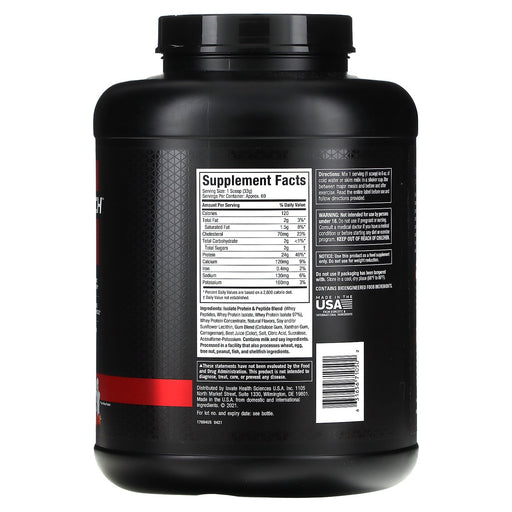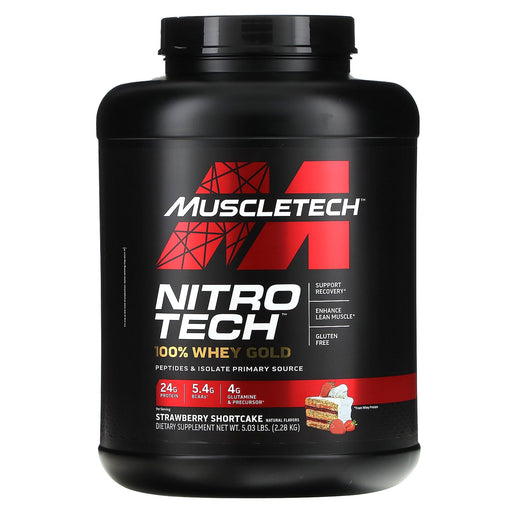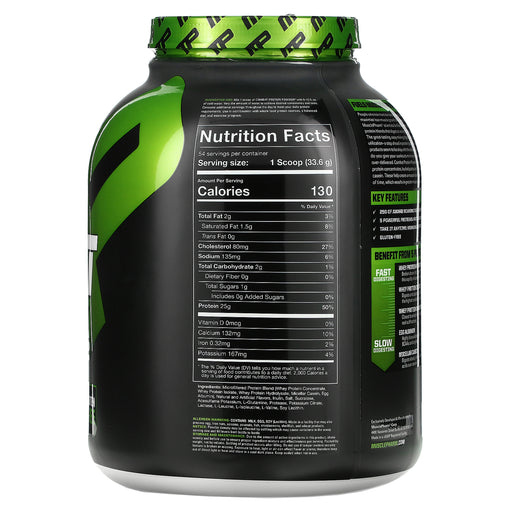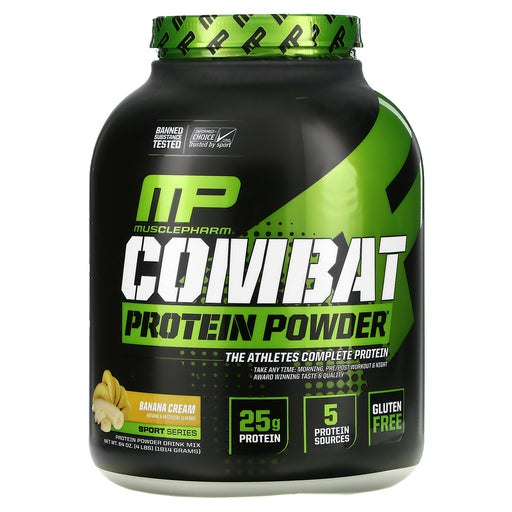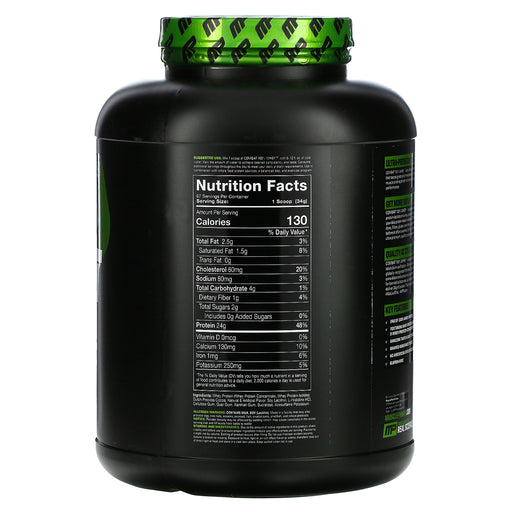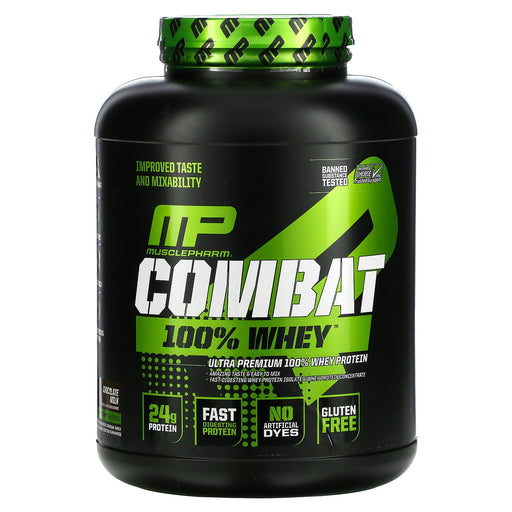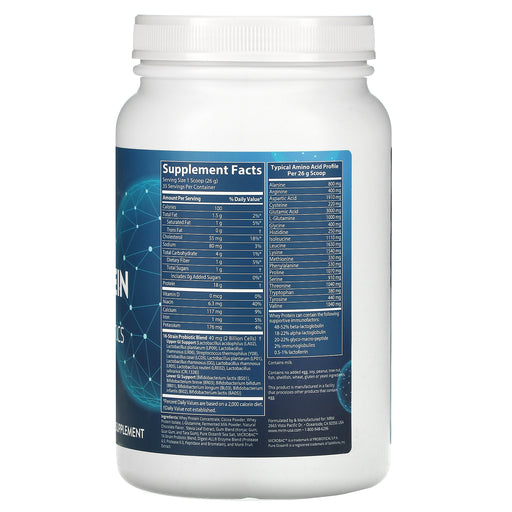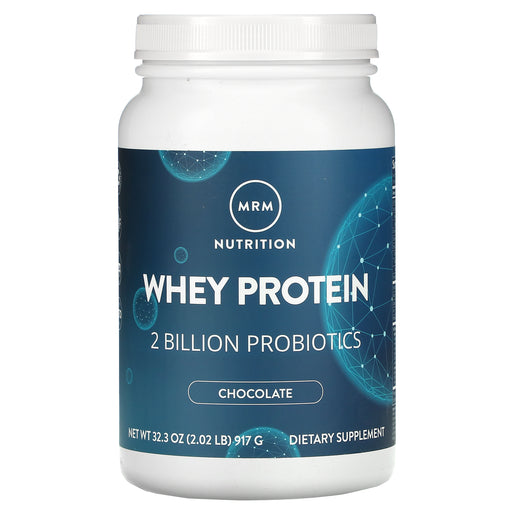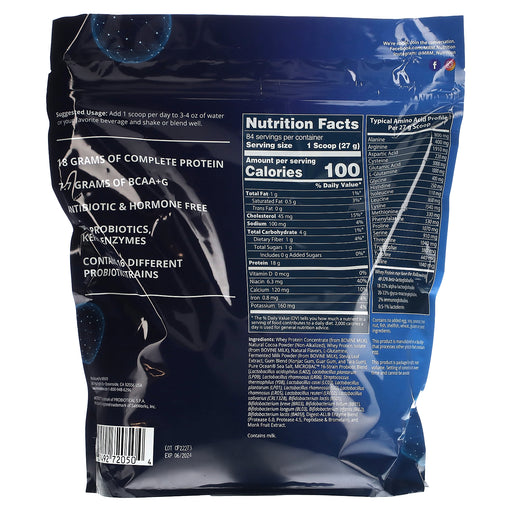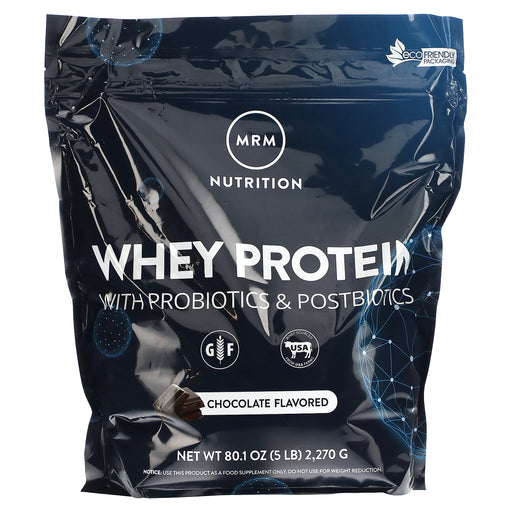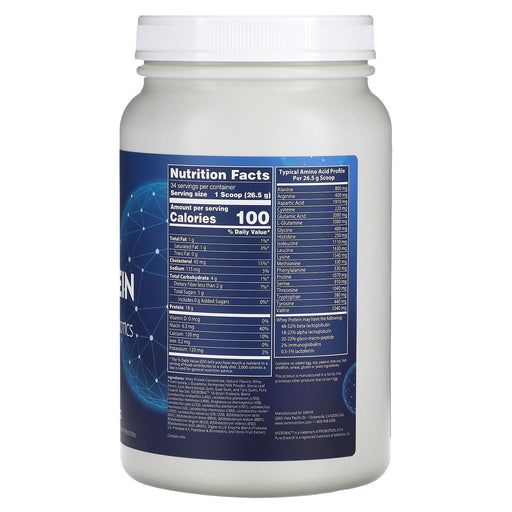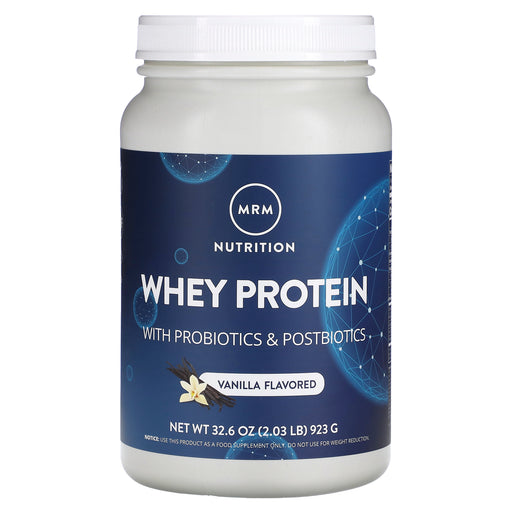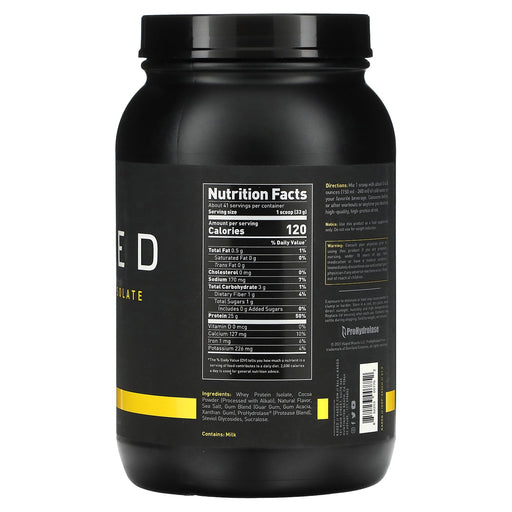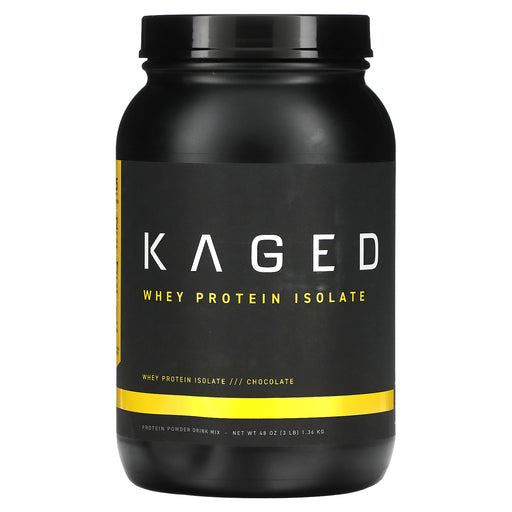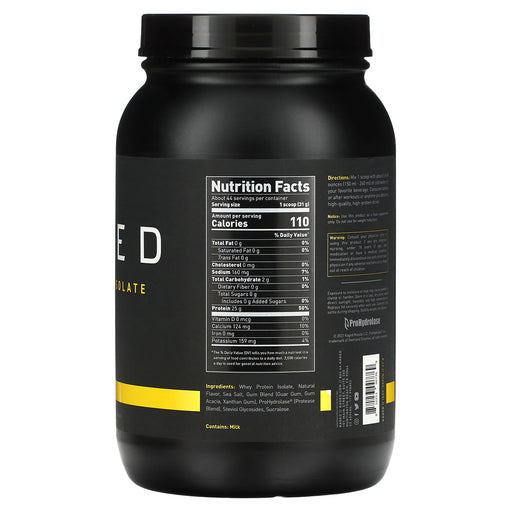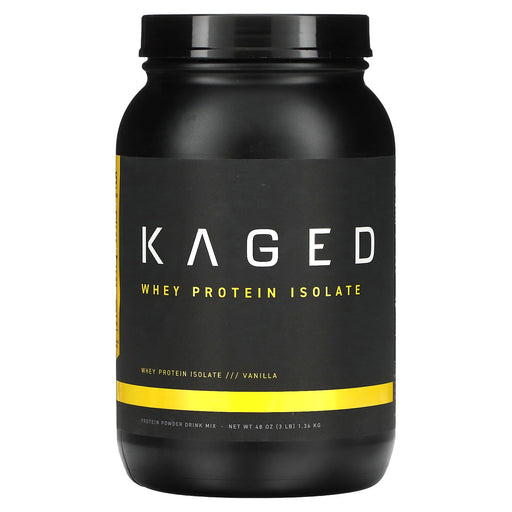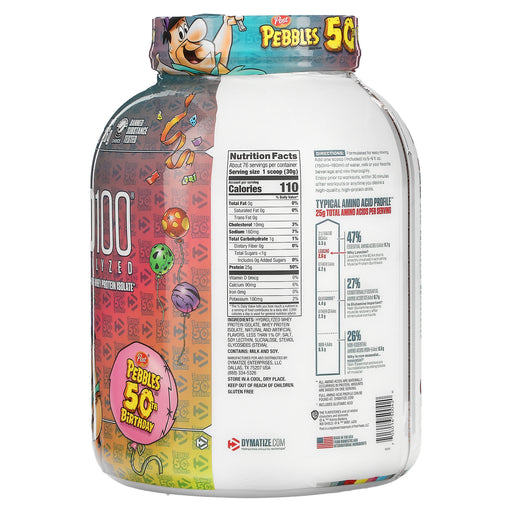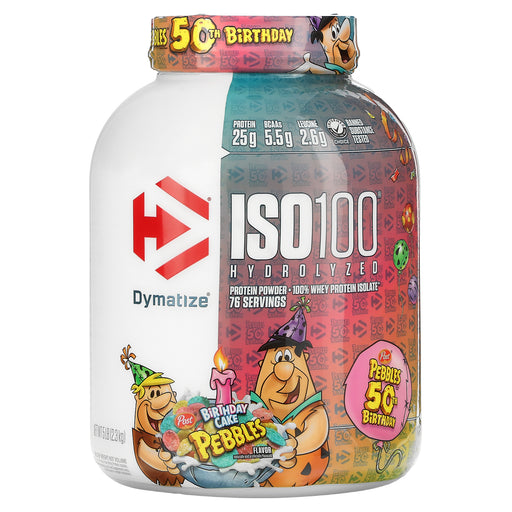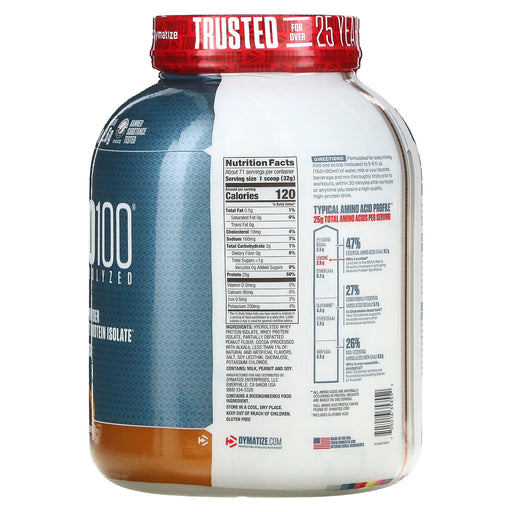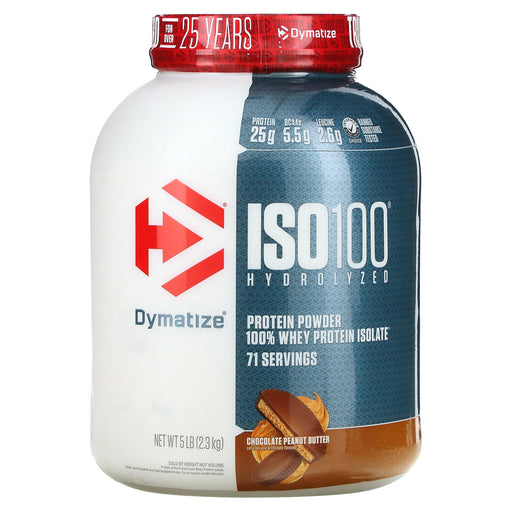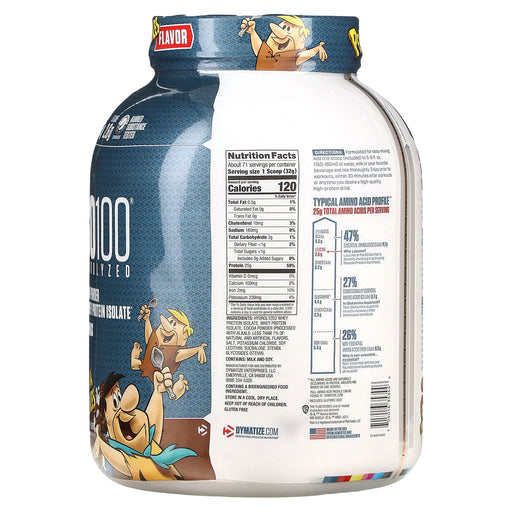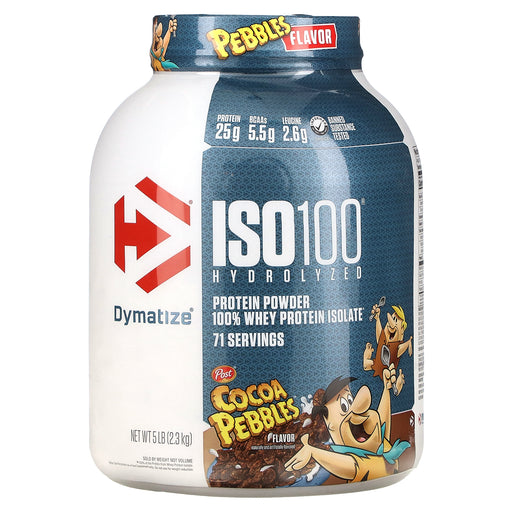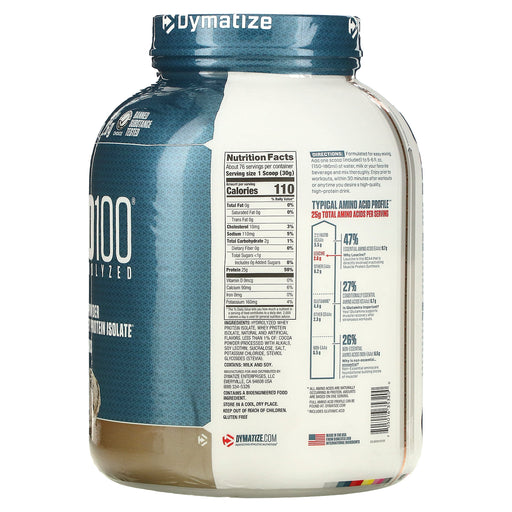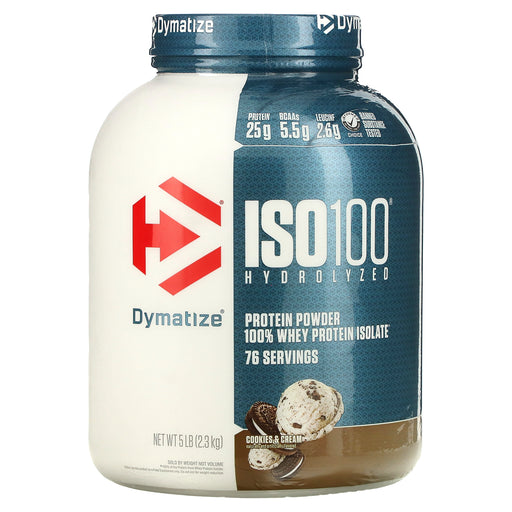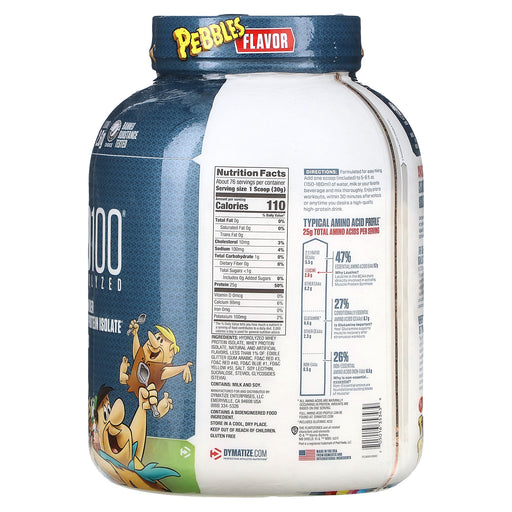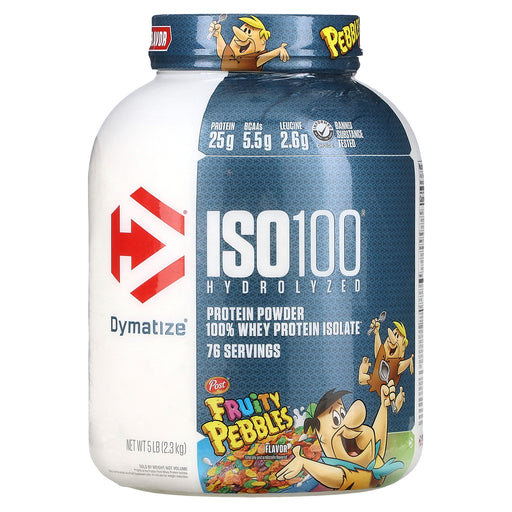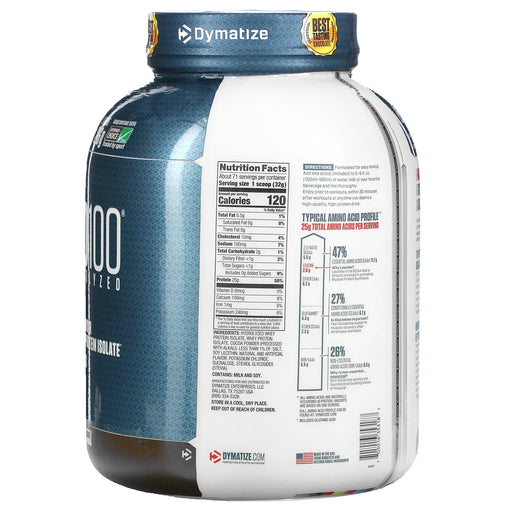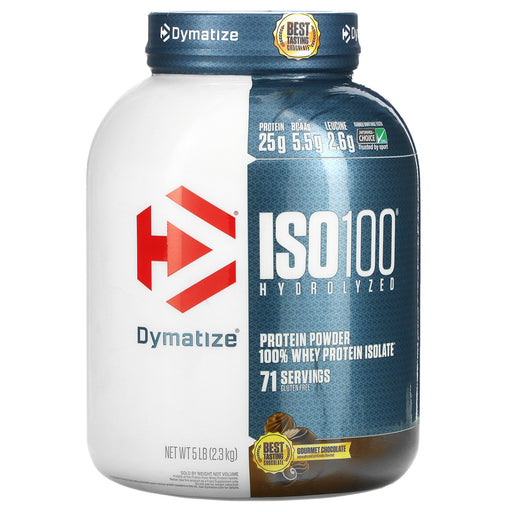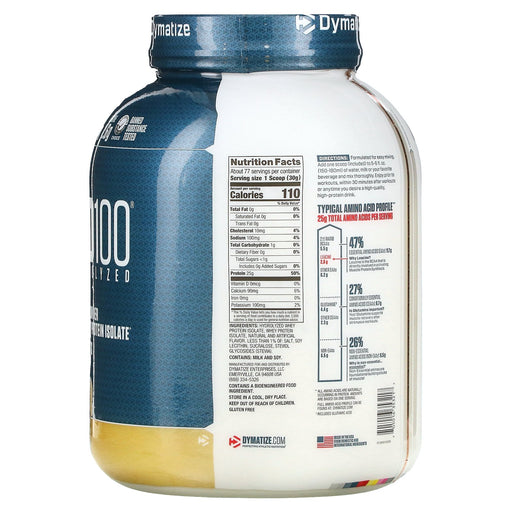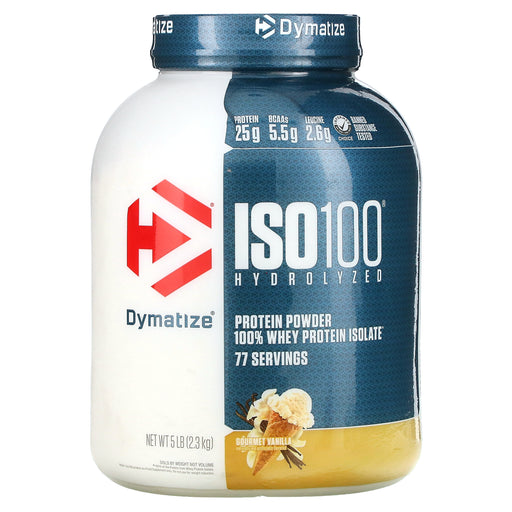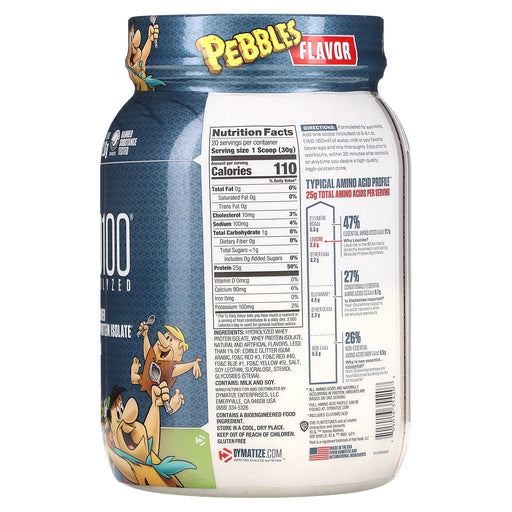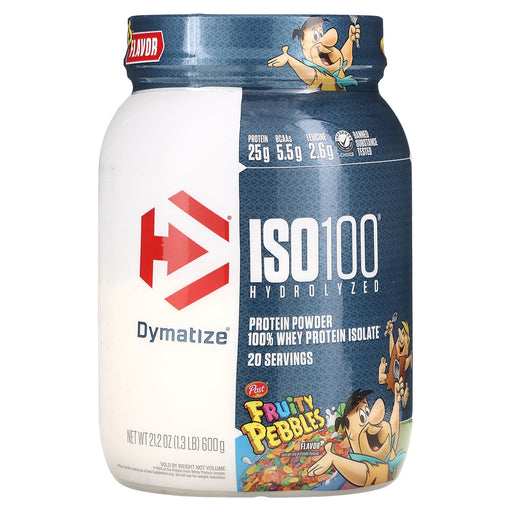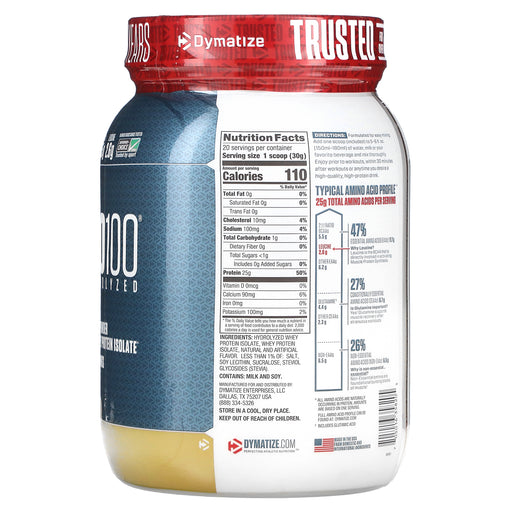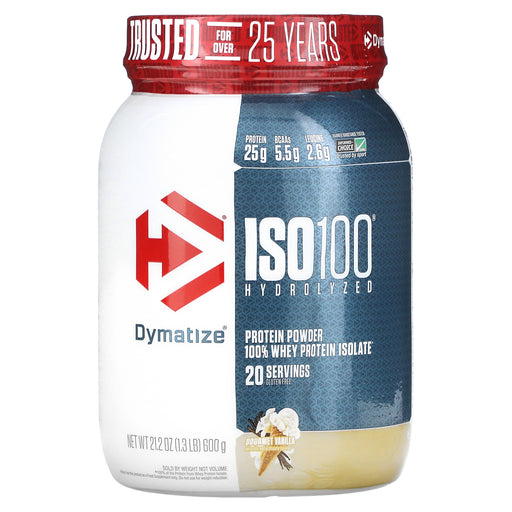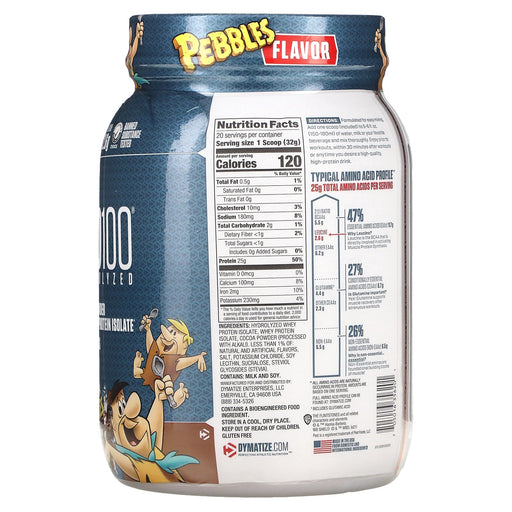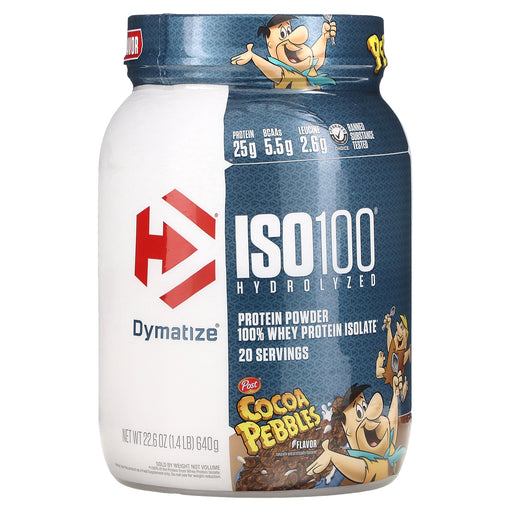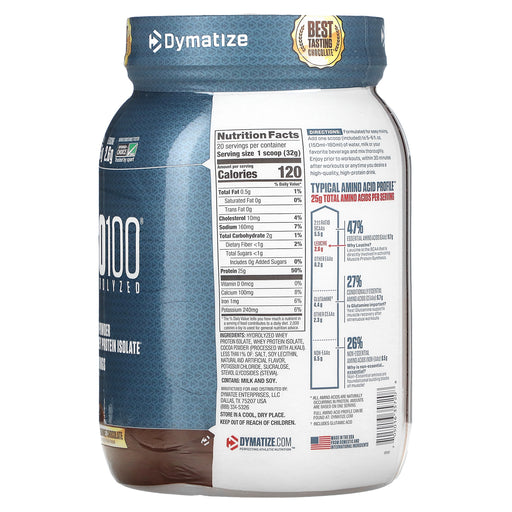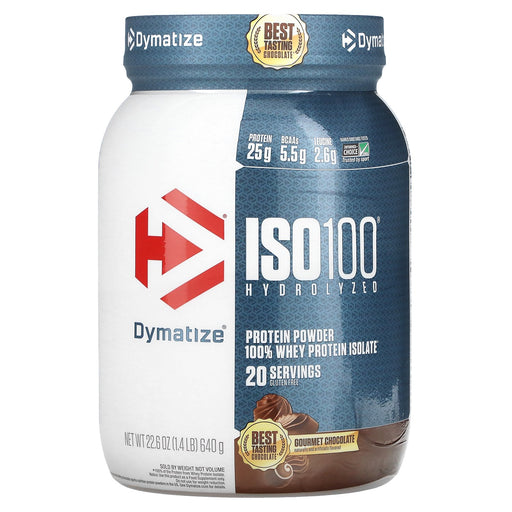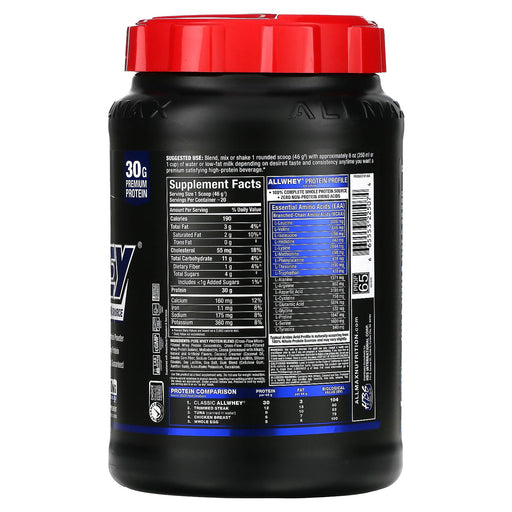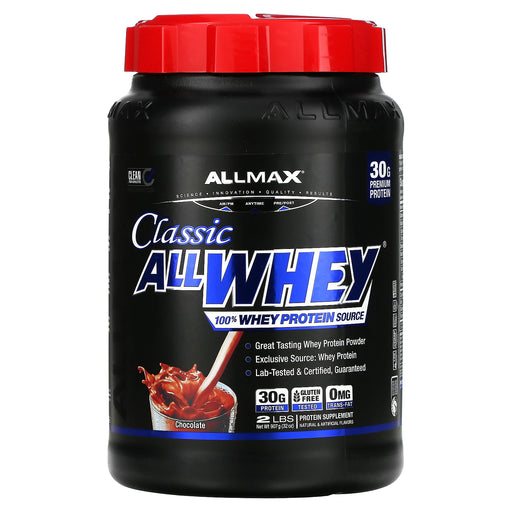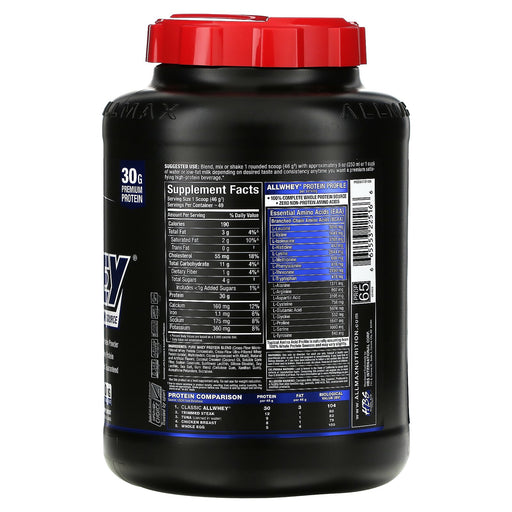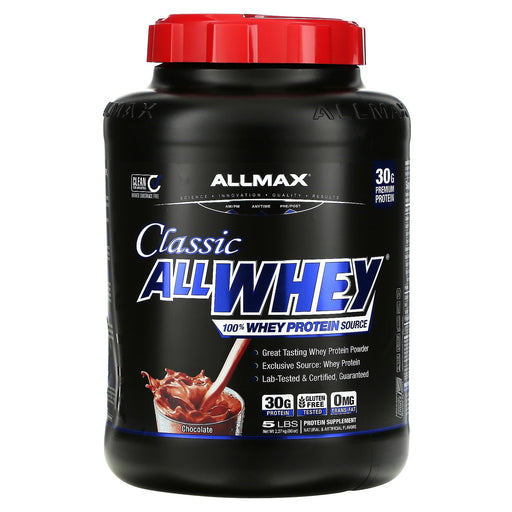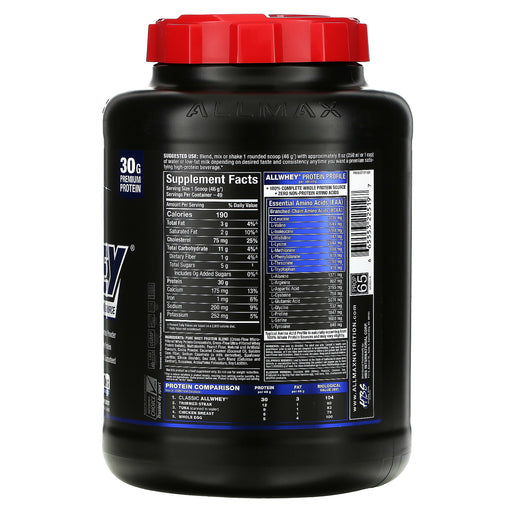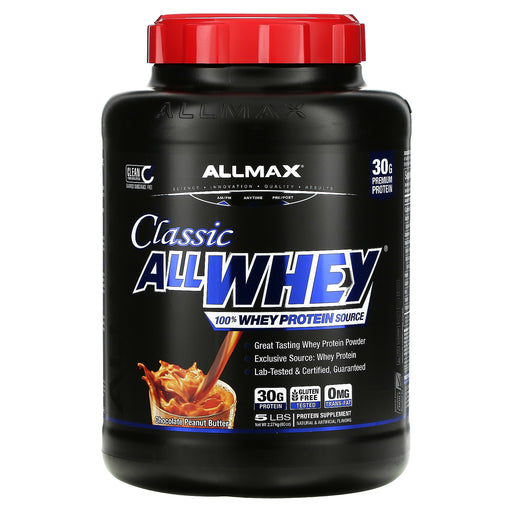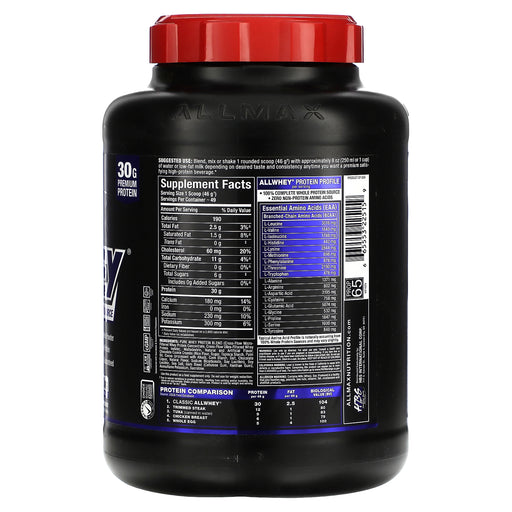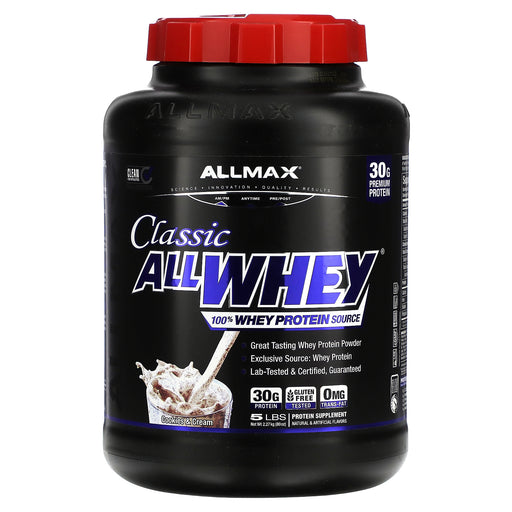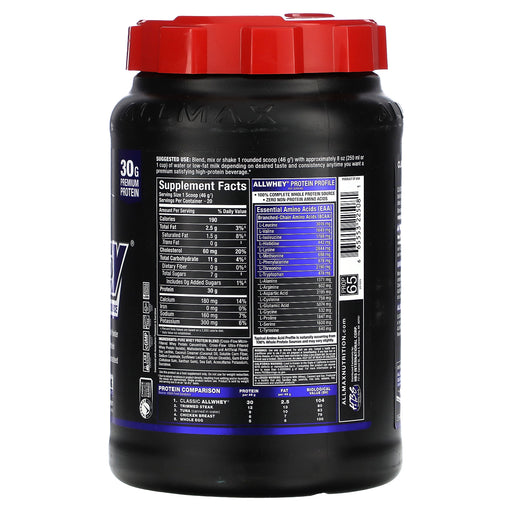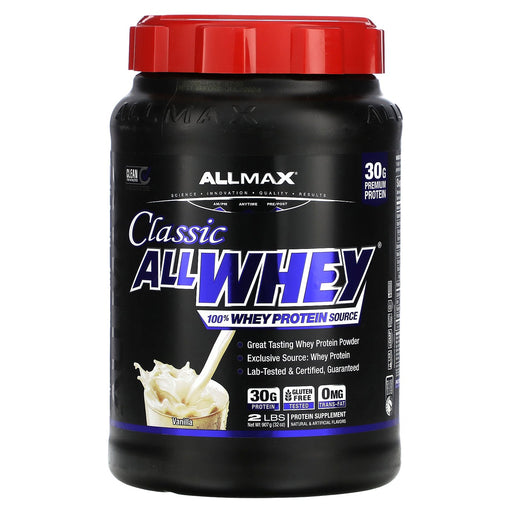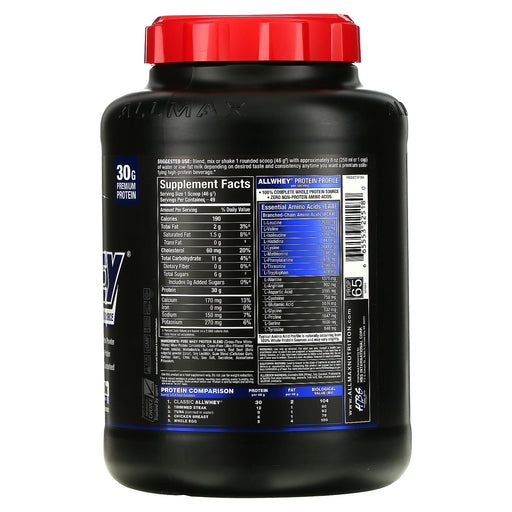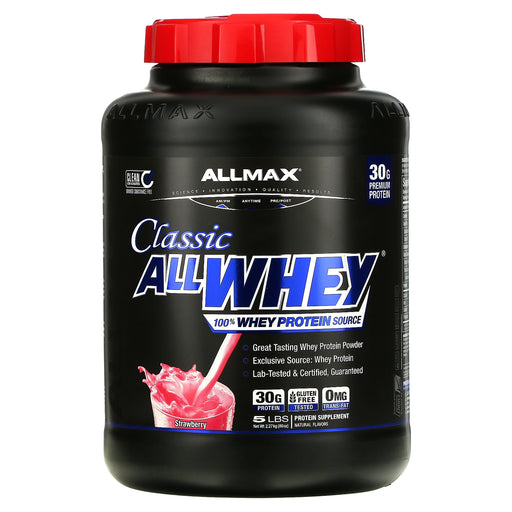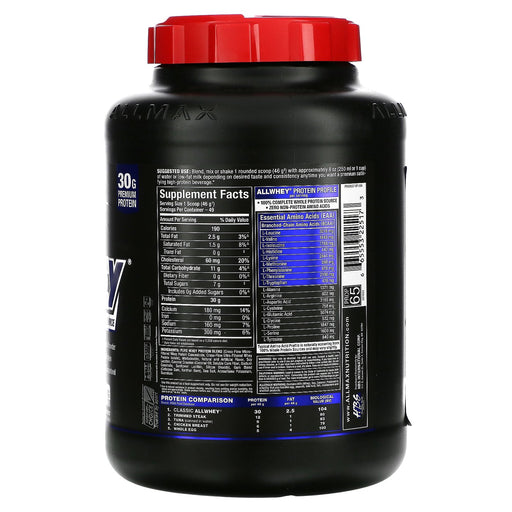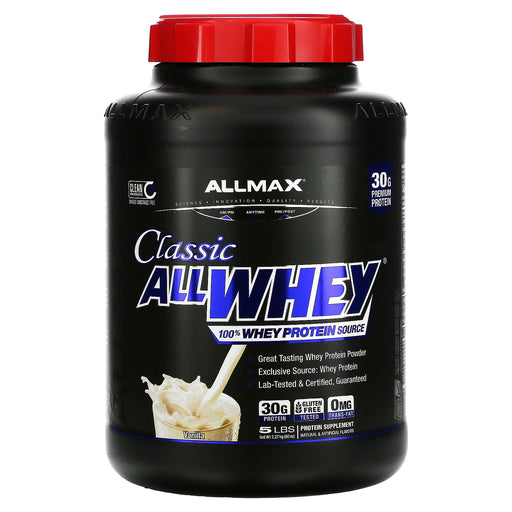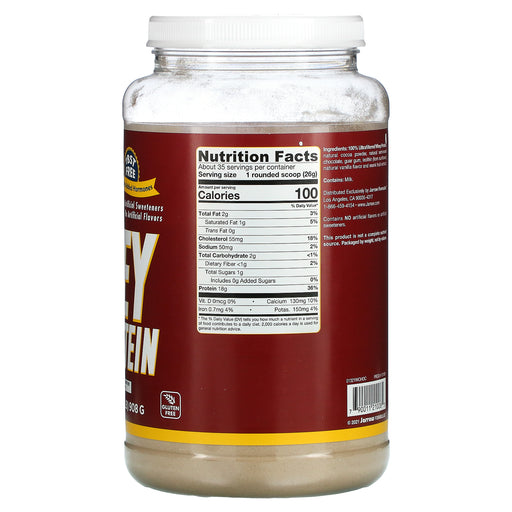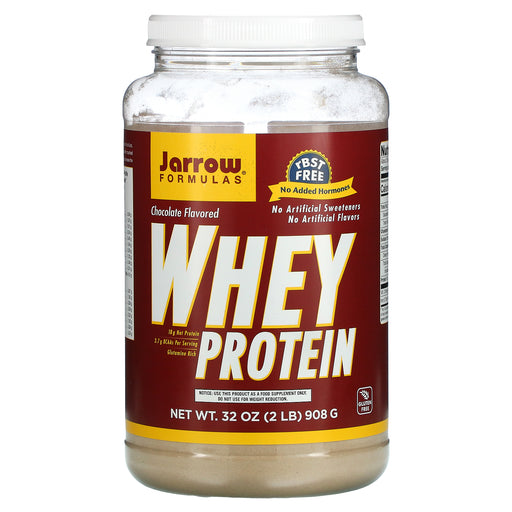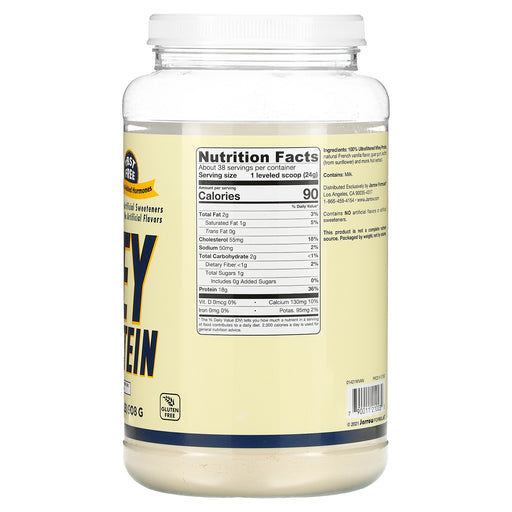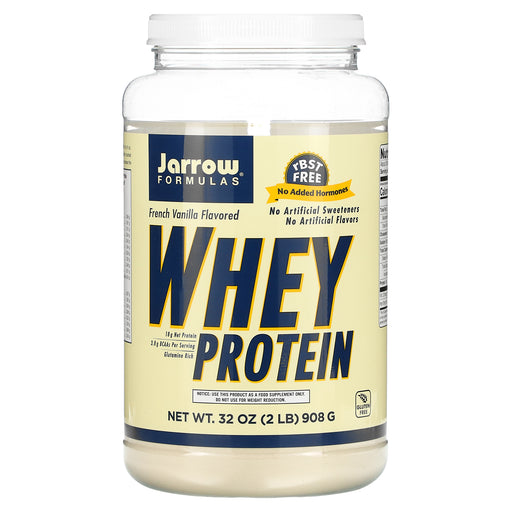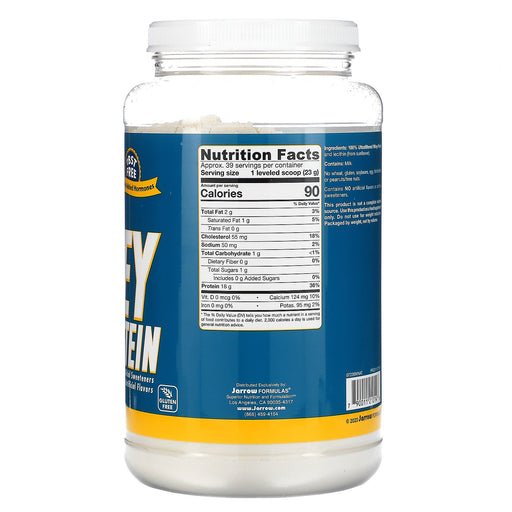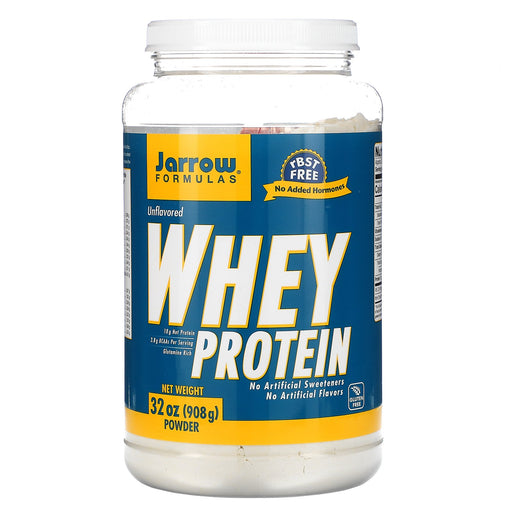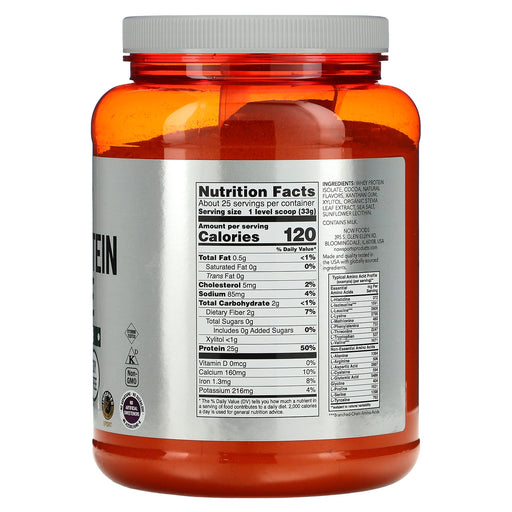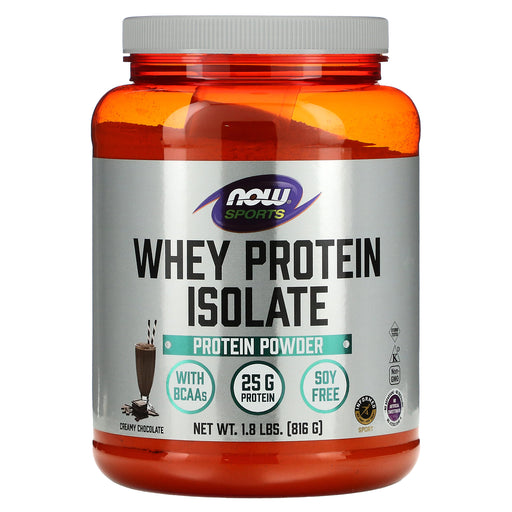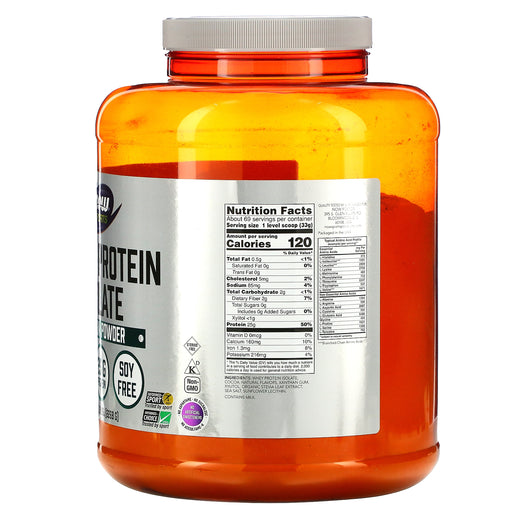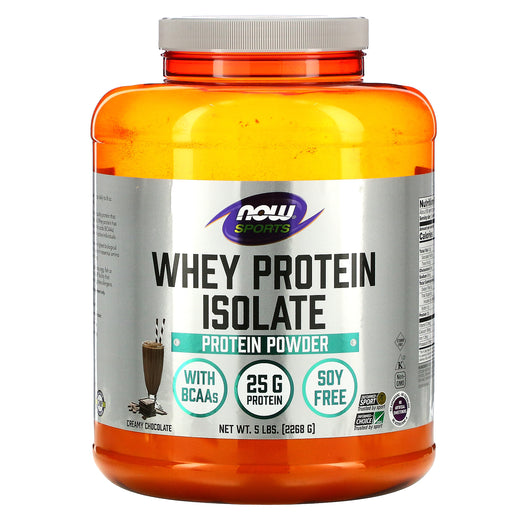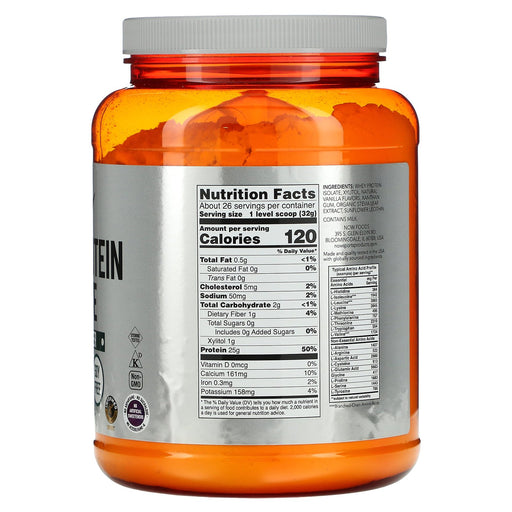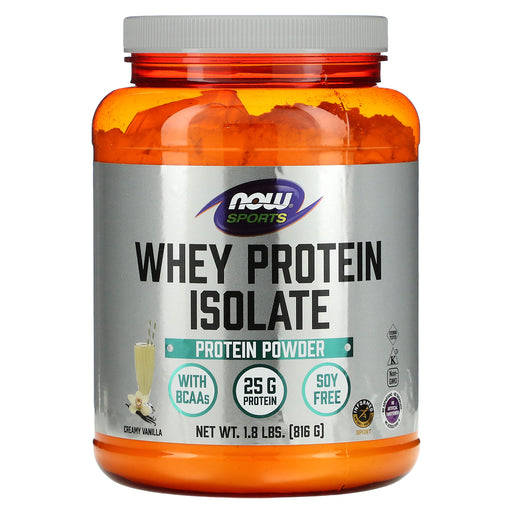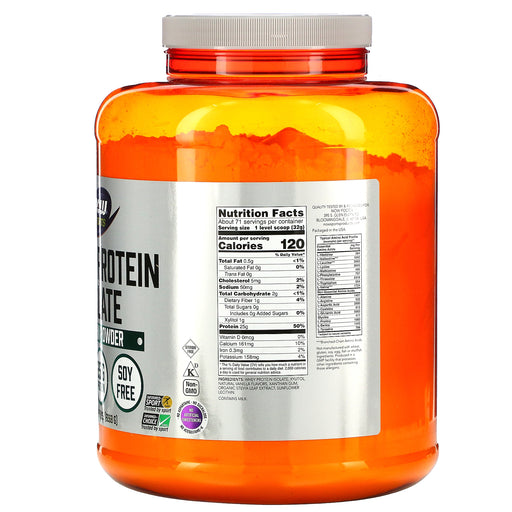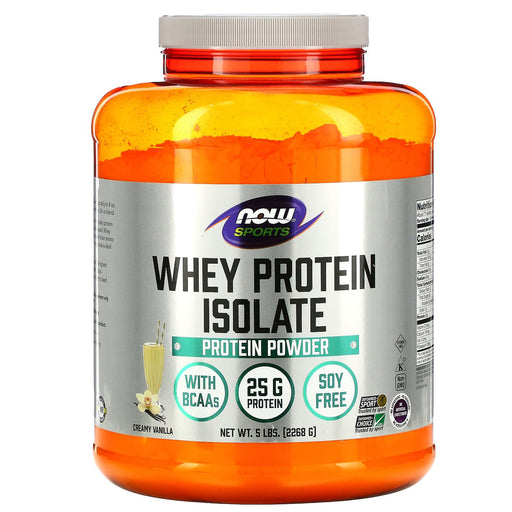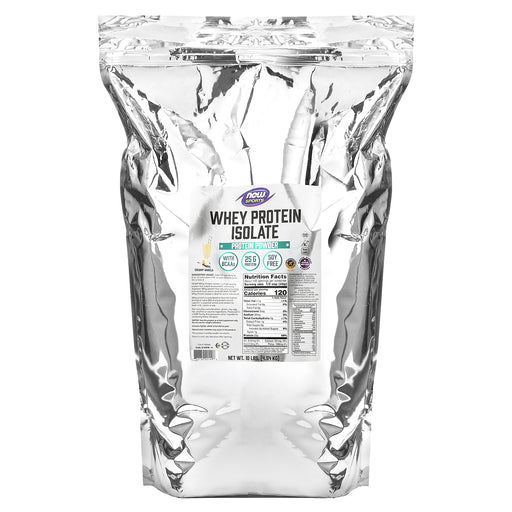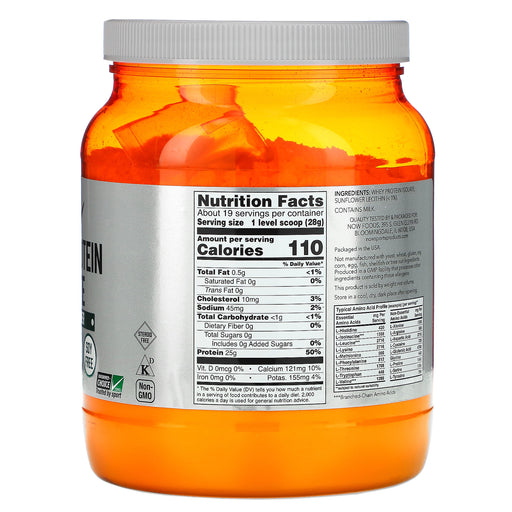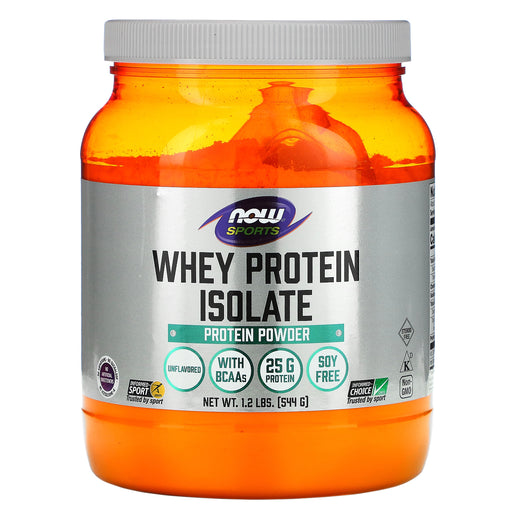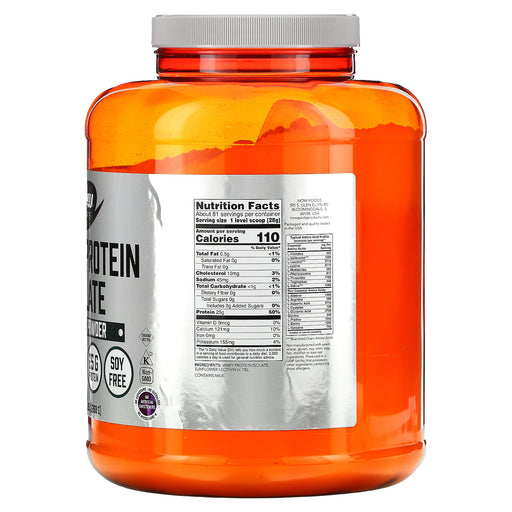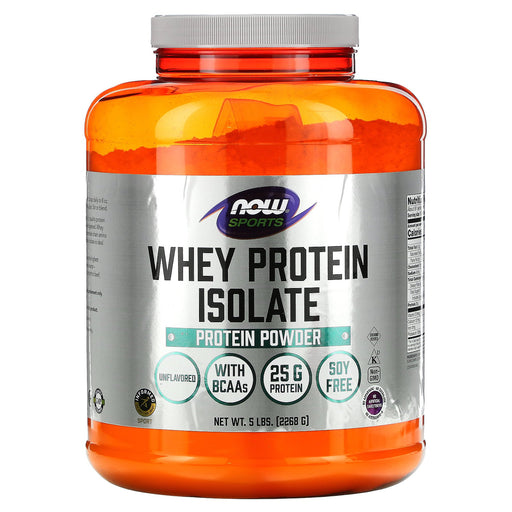
Whey Protein
Support lean muscle growth, recovery, and overall fitness with our selection of whey protein supplements. Whey protein is a fast-digesting, complete protein source that provides all the essential amino acids needed for muscle repair and growth. We offer a range of whey protein powders and blends from trusted brands, all independently tested for purity and quality. Compare prices and quality grades to find the best whey protein supplement for your individual needs at the best value.
-
 The Quality Grade for this product is "NT" (Not Tested). We aim to test all the products Health Orchard offers, and will publish the Quality Testing results on each product’s page once they are available. Our goal is to empower our customers with the information they need to find safe and high-quality health supplements.Original price $17.37 - Original price $21.00Original price$17.37$17.37 - $21.00Current price $17.37| /$0.03 /g of Protein
The Quality Grade for this product is "NT" (Not Tested). We aim to test all the products Health Orchard offers, and will publish the Quality Testing results on each product’s page once they are available. Our goal is to empower our customers with the information they need to find safe and high-quality health supplements.Original price $17.37 - Original price $21.00Original price$17.37$17.37 - $21.00Current price $17.37| /$0.03 /g of ProteinSIXSTAR, 100% Whey Protein Plus - Cookies & Cream / 30 g / 839 g
SIXSTARDescription Fuel your workouts with SIXSTAR 100% Whey Protein Plus, a high-quality whey protein powder. 100% Whey Protein Plus is a clinically adva...
View full details -
 The Quality Grade for this product is "NT" (Not Tested). We aim to test all the products Health Orchard offers, and will publish the Quality Testing results on each product’s page once they are available. Our goal is to empower our customers with the information they need to find safe and high-quality health supplements.Original price $17.37 - Original price $21.00Original price$21.00$17.37 - $21.00Current price $21.00| /$0.04 /g of Protein
The Quality Grade for this product is "NT" (Not Tested). We aim to test all the products Health Orchard offers, and will publish the Quality Testing results on each product’s page once they are available. Our goal is to empower our customers with the information they need to find safe and high-quality health supplements.Original price $17.37 - Original price $21.00Original price$21.00$17.37 - $21.00Current price $21.00| /$0.04 /g of ProteinSIXSTAR, 100% Whey Protein Plus - Strawberry Smoothie / 30 g / 816 g
SIXSTARDescription Fuel your workouts with SIXSTAR 100% Whey Protein Plus, a high-quality whey protein powder. 100% Whey Protein Plus is a clinically adva...
View full details -
 The Quality Grade for this product is "NT" (Not Tested). We aim to test all the products Health Orchard offers, and will publish the Quality Testing results on each product’s page once they are available. Our goal is to empower our customers with the information they need to find safe and high-quality health supplements.Original price $17.37 - Original price $21.00Original price$19.76$17.37 - $21.00Current price $19.76| /$0.04 /g of Protein
The Quality Grade for this product is "NT" (Not Tested). We aim to test all the products Health Orchard offers, and will publish the Quality Testing results on each product’s page once they are available. Our goal is to empower our customers with the information they need to find safe and high-quality health supplements.Original price $17.37 - Original price $21.00Original price$19.76$17.37 - $21.00Current price $19.76| /$0.04 /g of ProteinSIXSTAR, 100% Whey Protein Plus - Triple Chocolate / 30 g / 826 g
SIXSTARDescription Fuel your workouts with SIXSTAR 100% Whey Protein Plus, a high-quality whey protein powder. 100% Whey Protein Plus is a clinically adva...
View full details -
 The Quality Grade for this product is "NT" (Not Tested). We aim to test all the products Health Orchard offers, and will publish the Quality Testing results on each product’s page once they are available. Our goal is to empower our customers with the information they need to find safe and high-quality health supplements.Original price $17.37 - Original price $21.00Original price$19.76$17.37 - $21.00Current price $19.76| /$0.04 /g of Protein
The Quality Grade for this product is "NT" (Not Tested). We aim to test all the products Health Orchard offers, and will publish the Quality Testing results on each product’s page once they are available. Our goal is to empower our customers with the information they need to find safe and high-quality health supplements.Original price $17.37 - Original price $21.00Original price$19.76$17.37 - $21.00Current price $19.76| /$0.04 /g of ProteinSIXSTAR, 100% Whey Protein Plus - Vanilla Cream / 30 g / 821 g
SIXSTARDescription Fuel your workouts with SIXSTAR 100% Whey Protein Plus, a high-quality whey protein powder. 100% Whey Protein Plus is a clinically adva...
View full details -
 The Quality Grade for this product is "NT" (Not Tested). We aim to test all the products Health Orchard offers, and will publish the Quality Testing results on each product’s page once they are available. Our goal is to empower our customers with the information they need to find safe and high-quality health supplements.Original price $65.99 - Original price $90.00Original price$90.00$65.99 - $90.00Current price $90.00| /$0.15 /g of Protein
The Quality Grade for this product is "NT" (Not Tested). We aim to test all the products Health Orchard offers, and will publish the Quality Testing results on each product’s page once they are available. Our goal is to empower our customers with the information they need to find safe and high-quality health supplements.Original price $65.99 - Original price $90.00Original price$90.00$65.99 - $90.00Current price $90.00| /$0.15 /g of ProteinOptimum Nutrition, Gold Standard 100% Isolate - Chocolate Bliss / 25 g / 744 g
Optimum NutritionDescription Maximize protein intake with Optimum Nutrition Gold Standard 100% Isolate, a high-quality whey isolate. Gold Standard 100% Isolate is a...
View full details -
 The Quality Grade for this product is "NT" (Not Tested). We aim to test all the products Health Orchard offers, and will publish the Quality Testing results on each product’s page once they are available. Our goal is to empower our customers with the information they need to find safe and high-quality health supplements.Original price $65.99 - Original price $90.00Original price$65.99$65.99 - $90.00Current price $65.99| /$0.06 /g of Protein
The Quality Grade for this product is "NT" (Not Tested). We aim to test all the products Health Orchard offers, and will publish the Quality Testing results on each product’s page once they are available. Our goal is to empower our customers with the information they need to find safe and high-quality health supplements.Original price $65.99 - Original price $90.00Original price$65.99$65.99 - $90.00Current price $65.99| /$0.06 /g of ProteinOptimum Nutrition, Gold Standard 100% Isolate - Chocolate Bliss / 25 g / 1,360 g
Optimum NutritionDescription Maximize protein intake with Optimum Nutrition Gold Standard 100% Isolate, a high-quality whey isolate. Gold Standard 100% Isolate is a...
View full details -
 The Quality Grade for this product is "NT" (Not Tested). We aim to test all the products Health Orchard offers, and will publish the Quality Testing results on each product’s page once they are available. Our goal is to empower our customers with the information they need to find safe and high-quality health supplements.Original price $65.99 - Original price $90.00Original price$69.99$65.99 - $90.00Current price $69.99| /$0.12 /g of Protein
The Quality Grade for this product is "NT" (Not Tested). We aim to test all the products Health Orchard offers, and will publish the Quality Testing results on each product’s page once they are available. Our goal is to empower our customers with the information they need to find safe and high-quality health supplements.Original price $65.99 - Original price $90.00Original price$69.99$65.99 - $90.00Current price $69.99| /$0.12 /g of ProteinOptimum Nutrition, Gold Standard 100% Isolate - Rich Vanilla / 25 g / 720 g
Optimum NutritionDescription Maximize protein intake with Optimum Nutrition Gold Standard 100% Isolate, a high-quality whey isolate. Gold Standard 100% Isolate is a...
View full details -
 The Quality Grade for this product is "NT" (Not Tested). We aim to test all the products Health Orchard offers, and will publish the Quality Testing results on each product’s page once they are available. Our goal is to empower our customers with the information they need to find safe and high-quality health supplements.Original price $65.99 - Original price $90.00Original price$69.99$65.99 - $90.00Current price $69.99| /$0.06 /g of Protein
The Quality Grade for this product is "NT" (Not Tested). We aim to test all the products Health Orchard offers, and will publish the Quality Testing results on each product’s page once they are available. Our goal is to empower our customers with the information they need to find safe and high-quality health supplements.Original price $65.99 - Original price $90.00Original price$69.99$65.99 - $90.00Current price $69.99| /$0.06 /g of ProteinOptimum Nutrition, Gold Standard 100% Isolate - Rich Vanilla / 25 g / 1,320 g
Optimum NutritionDescription Maximize protein intake with Optimum Nutrition Gold Standard 100% Isolate, a high-quality whey isolate. Gold Standard 100% Isolate is a...
View full details -
 The Quality Grade for this product is "NT" (Not Tested). We aim to test all the products Health Orchard offers, and will publish the Quality Testing results on each product’s page once they are available. Our goal is to empower our customers with the information they need to find safe and high-quality health supplements.Original price $19.99 - Original price $104.97Original price$78.99$19.99 - $104.97Current price $78.99| /$0.07 /g of Protein
The Quality Grade for this product is "NT" (Not Tested). We aim to test all the products Health Orchard offers, and will publish the Quality Testing results on each product’s page once they are available. Our goal is to empower our customers with the information they need to find safe and high-quality health supplements.Original price $19.99 - Original price $104.97Original price$78.99$19.99 - $104.97Current price $78.99| /$0.07 /g of ProteinIsopure, Zero Carb Protein Powder - Banana Cream / 25 g / 1,360 g
IsopureDescription Fuel your workouts with Isopure Zero Carb Protein Powder, a high-quality protein source for muscle recovery. Isopure Zero Carb Protein ...
View full details -
 The Quality Grade for this product is "NT" (Not Tested). We aim to test all the products Health Orchard offers, and will publish the Quality Testing results on each product’s page once they are available. Our goal is to empower our customers with the information they need to find safe and high-quality health supplements.Original price $19.99 - Original price $104.97Original price$19.99$19.99 - $104.97Current price $19.99| /$0.05 /g of Protein
The Quality Grade for this product is "NT" (Not Tested). We aim to test all the products Health Orchard offers, and will publish the Quality Testing results on each product’s page once they are available. Our goal is to empower our customers with the information they need to find safe and high-quality health supplements.Original price $19.99 - Original price $104.97Original price$19.99$19.99 - $104.97Current price $19.99| /$0.05 /g of ProteinIsopure, Zero Carb Protein Powder - Cookies & Cream / 25 g / 454 g
IsopureDescription Fuel your workouts with Isopure Zero Carb Protein Powder, a high-quality protein source for muscle recovery. Isopure Zero Carb Protein ...
View full details -
 The Quality Grade for this product is "NT" (Not Tested). We aim to test all the products Health Orchard offers, and will publish the Quality Testing results on each product’s page once they are available. Our goal is to empower our customers with the information they need to find safe and high-quality health supplements.Original price $19.99 - Original price $104.97Original price$59.97$19.99 - $104.97Current price $59.97| /$0.05 /g of Protein
The Quality Grade for this product is "NT" (Not Tested). We aim to test all the products Health Orchard offers, and will publish the Quality Testing results on each product’s page once they are available. Our goal is to empower our customers with the information they need to find safe and high-quality health supplements.Original price $19.99 - Original price $104.97Original price$59.97$19.99 - $104.97Current price $59.97| /$0.05 /g of ProteinIsopure, Zero Carb Protein Powder - Cookies & Cream / 25 g / 1,360 g
IsopureDescription Fuel your workouts with Isopure Zero Carb Protein Powder, a high-quality protein source for muscle recovery. Isopure Zero Carb Protein ...
View full details -
 The Quality Grade for this product is "NT" (Not Tested). We aim to test all the products Health Orchard offers, and will publish the Quality Testing results on each product’s page once they are available. Our goal is to empower our customers with the information they need to find safe and high-quality health supplements.Original price $19.99 - Original price $104.97Original price$24.99$19.99 - $104.97Current price $24.99| /$0.07 /g of Protein
The Quality Grade for this product is "NT" (Not Tested). We aim to test all the products Health Orchard offers, and will publish the Quality Testing results on each product’s page once they are available. Our goal is to empower our customers with the information they need to find safe and high-quality health supplements.Original price $19.99 - Original price $104.97Original price$24.99$19.99 - $104.97Current price $24.99| /$0.07 /g of ProteinIsopure, Zero Carb Protein Powder - Creamy Vanilla / 25 g / 454 g
IsopureDescription Fuel your workouts with Isopure Zero Carb Protein Powder, a high-quality protein source for muscle recovery. Isopure Zero Carb Protein ...
View full details -
 The Quality Grade for this product is "NT" (Not Tested). We aim to test all the products Health Orchard offers, and will publish the Quality Testing results on each product’s page once they are available. Our goal is to empower our customers with the information they need to find safe and high-quality health supplements.Original price $19.99 - Original price $104.97Original price$69.98$19.99 - $104.97Current price $69.98| /$0.06 /g of Protein
The Quality Grade for this product is "NT" (Not Tested). We aim to test all the products Health Orchard offers, and will publish the Quality Testing results on each product’s page once they are available. Our goal is to empower our customers with the information they need to find safe and high-quality health supplements.Original price $19.99 - Original price $104.97Original price$69.98$19.99 - $104.97Current price $69.98| /$0.06 /g of ProteinIsopure, Zero Carb Protein Powder - Creamy Vanilla / 25 g / 1,360 g
IsopureDescription Fuel your workouts with Isopure Zero Carb Protein Powder, a high-quality protein source for muscle recovery. Isopure Zero Carb Protein ...
View full details -
 The Quality Grade for this product is "NT" (Not Tested). We aim to test all the products Health Orchard offers, and will publish the Quality Testing results on each product’s page once they are available. Our goal is to empower our customers with the information they need to find safe and high-quality health supplements.Original price $19.99 - Original price $104.97Original price$104.97$19.99 - $104.97Current price $104.97| /$0.06 /g of Protein
The Quality Grade for this product is "NT" (Not Tested). We aim to test all the products Health Orchard offers, and will publish the Quality Testing results on each product’s page once they are available. Our goal is to empower our customers with the information they need to find safe and high-quality health supplements.Original price $19.99 - Original price $104.97Original price$104.97$19.99 - $104.97Current price $104.97| /$0.06 /g of ProteinIsopure, Zero Carb Protein Powder - Creamy Vanilla / 25 g / 2,040 g
IsopureDescription Fuel your workouts with Isopure Zero Carb Protein Powder, a high-quality protein source for muscle recovery. Isopure Zero Carb Protein ...
View full details -
 The Quality Grade for this product is "NT" (Not Tested). We aim to test all the products Health Orchard offers, and will publish the Quality Testing results on each product’s page once they are available. Our goal is to empower our customers with the information they need to find safe and high-quality health supplements.Original price $19.99 - Original price $104.97Original price$68.97$19.99 - $104.97Current price $68.97| /$0.06 /g of Protein
The Quality Grade for this product is "NT" (Not Tested). We aim to test all the products Health Orchard offers, and will publish the Quality Testing results on each product’s page once they are available. Our goal is to empower our customers with the information they need to find safe and high-quality health supplements.Original price $19.99 - Original price $104.97Original price$68.97$19.99 - $104.97Current price $68.97| /$0.06 /g of ProteinIsopure, Zero Carb Protein Powder - Strawberries & Cream / 25 g / 1,360 g
IsopureDescription Fuel your workouts with Isopure Zero Carb Protein Powder, a high-quality protein source for muscle recovery. Isopure Zero Carb Protein ...
View full details -
 The Quality Grade for this product is "NT" (Not Tested). We aim to test all the products Health Orchard offers, and will publish the Quality Testing results on each product’s page once they are available. Our goal is to empower our customers with the information they need to find safe and high-quality health supplements.Original price $19.99 - Original price $104.97Original price$69.98$19.99 - $104.97Current price $69.98| /$0.07 /g of Protein
The Quality Grade for this product is "NT" (Not Tested). We aim to test all the products Health Orchard offers, and will publish the Quality Testing results on each product’s page once they are available. Our goal is to empower our customers with the information they need to find safe and high-quality health supplements.Original price $19.99 - Original price $104.97Original price$69.98$19.99 - $104.97Current price $69.98| /$0.07 /g of ProteinIsopure, Zero Carb Protein Powder - Vanilla Salted Caramel / 25 g / 1,360 g
IsopureDescription Fuel your workouts with Isopure Zero Carb Protein Powder, a high-quality protein source for muscle recovery. Isopure Zero Carb Protein ...
View full details -
 The Quality Grade for this product is "NT" (Not Tested). We aim to test all the products Health Orchard offers, and will publish the Quality Testing results on each product’s page once they are available. Our goal is to empower our customers with the information they need to find safe and high-quality health supplements.Original price $23.99 - Original price $66.79Original price$23.99$23.99 - $66.79Current price $23.99| /$0.06 /g of Protein
The Quality Grade for this product is "NT" (Not Tested). We aim to test all the products Health Orchard offers, and will publish the Quality Testing results on each product’s page once they are available. Our goal is to empower our customers with the information they need to find safe and high-quality health supplements.Original price $23.99 - Original price $66.79Original price$23.99$23.99 - $66.79Current price $23.99| /$0.06 /g of ProteinIsopure, Isopure Protein Powder, Zero Carb Protein - Powder / 25 g / 454 g
IsopureDescription Fuel your workouts and muscle recovery with Isopure Protein Powder, a high-quality zero-carb protein supplement for fitness enthusiasts...
View full details -
 The Quality Grade for this product is "NT" (Not Tested). We aim to test all the products Health Orchard offers, and will publish the Quality Testing results on each product’s page once they are available. Our goal is to empower our customers with the information they need to find safe and high-quality health supplements.Original price $23.99 - Original price $66.79Original price$66.79$23.99 - $66.79Current price $66.79| /$0.06 /g of Protein
The Quality Grade for this product is "NT" (Not Tested). We aim to test all the products Health Orchard offers, and will publish the Quality Testing results on each product’s page once they are available. Our goal is to empower our customers with the information they need to find safe and high-quality health supplements.Original price $23.99 - Original price $66.79Original price$66.79$23.99 - $66.79Current price $66.79| /$0.06 /g of ProteinIsopure, Isopure Protein Powder, Zero Carb Protein - Powder / 25 g / 1,360 g
IsopureDescription Fuel your workouts and muscle recovery with Isopure Protein Powder, a high-quality zero-carb protein supplement for fitness enthusiasts...
View full details -
 The Quality Grade for this product is "NT" (Not Tested). We aim to test all the products Health Orchard offers, and will publish the Quality Testing results on each product’s page once they are available. Our goal is to empower our customers with the information they need to find safe and high-quality health supplements.Original price $18.91 - Original price $76.66Original price$19.99$18.91 - $76.66Current price $19.99| /$0.03 /g of Protein
The Quality Grade for this product is "NT" (Not Tested). We aim to test all the products Health Orchard offers, and will publish the Quality Testing results on each product’s page once they are available. Our goal is to empower our customers with the information they need to find safe and high-quality health supplements.Original price $18.91 - Original price $76.66Original price$19.99$18.91 - $76.66Current price $19.99| /$0.03 /g of ProteinEVLution Nutrition, 100% Isolate Protein - Double Rich Chocolate / 25 g / 726 g
EVLution NutritionDescriptionFuel your workouts with EVLution Nutrition 100% Isolate Protein, a high-quality protein source for muscle recovery.EVLution Nutrition 10...
View full details -
 The Quality Grade for this product is "NT" (Not Tested). We aim to test all the products Health Orchard offers, and will publish the Quality Testing results on each product’s page once they are available. Our goal is to empower our customers with the information they need to find safe and high-quality health supplements.Original price $18.91 - Original price $76.66Original price$76.66$18.91 - $76.66Current price $76.66| /$0.04 /g of Protein
The Quality Grade for this product is "NT" (Not Tested). We aim to test all the products Health Orchard offers, and will publish the Quality Testing results on each product’s page once they are available. Our goal is to empower our customers with the information they need to find safe and high-quality health supplements.Original price $18.91 - Original price $76.66Original price$76.66$18.91 - $76.66Current price $76.66| /$0.04 /g of ProteinEVLution Nutrition, 100% Isolate Protein - Double Rich Chocolate / 25 g / 2,268 g
EVLution NutritionDescriptionFuel your workouts with EVLution Nutrition 100% Isolate Protein, a high-quality protein source for muscle recovery.EVLution Nutrition 10...
View full details -
 The Quality Grade for this product is "NT" (Not Tested). We aim to test all the products Health Orchard offers, and will publish the Quality Testing results on each product’s page once they are available. Our goal is to empower our customers with the information they need to find safe and high-quality health supplements.Original price $18.91 - Original price $76.66Original price$18.91$18.91 - $76.66Current price $18.91| /$0.05 /g of Protein
The Quality Grade for this product is "NT" (Not Tested). We aim to test all the products Health Orchard offers, and will publish the Quality Testing results on each product’s page once they are available. Our goal is to empower our customers with the information they need to find safe and high-quality health supplements.Original price $18.91 - Original price $76.66Original price$18.91$18.91 - $76.66Current price $18.91| /$0.05 /g of ProteinEVLution Nutrition, 100% Isolate Protein - Unflavored / 25 g / 454 g
EVLution NutritionDescriptionFuel your workouts with EVLution Nutrition 100% Isolate Protein, a high-quality protein source for muscle recovery.EVLution Nutrition 10...
View full details -
 The Quality Grade for this product is "NT" (Not Tested). We aim to test all the products Health Orchard offers, and will publish the Quality Testing results on each product’s page once they are available. Our goal is to empower our customers with the information they need to find safe and high-quality health supplements.Original price $18.91 - Original price $76.66Original price$19.99$18.91 - $76.66Current price $19.99| /$0.03 /g of Protein
The Quality Grade for this product is "NT" (Not Tested). We aim to test all the products Health Orchard offers, and will publish the Quality Testing results on each product’s page once they are available. Our goal is to empower our customers with the information they need to find safe and high-quality health supplements.Original price $18.91 - Original price $76.66Original price$19.99$18.91 - $76.66Current price $19.99| /$0.03 /g of ProteinEVLution Nutrition, 100% Isolate Protein - Vanilla Ice Cream / 25 g / 726 g
EVLution NutritionDescriptionFuel your workouts with EVLution Nutrition 100% Isolate Protein, a high-quality protein source for muscle recovery.EVLution Nutrition 10...
View full details -
 The Quality Grade for this product is "NT" (Not Tested). We aim to test all the products Health Orchard offers, and will publish the Quality Testing results on each product’s page once they are available. Our goal is to empower our customers with the information they need to find safe and high-quality health supplements.Original price $18.91 - Original price $76.66Original price$24.99$18.91 - $76.66Current price $24.99| /$0.01 /g of Protein
The Quality Grade for this product is "NT" (Not Tested). We aim to test all the products Health Orchard offers, and will publish the Quality Testing results on each product’s page once they are available. Our goal is to empower our customers with the information they need to find safe and high-quality health supplements.Original price $18.91 - Original price $76.66Original price$24.99$18.91 - $76.66Current price $24.99| /$0.01 /g of ProteinEVLution Nutrition, 100% Isolate Protein - Vanilla Ice Cream / 25 g / 2,268 g
EVLution NutritionDescriptionFuel your workouts with EVLution Nutrition 100% Isolate Protein, a high-quality protein source for muscle recovery.EVLution Nutrition 10...
View full details -
 The Quality Grade for this product is "NT" (Not Tested). We aim to test all the products Health Orchard offers, and will publish the Quality Testing results on each product’s page once they are available. Our goal is to empower our customers with the information they need to find safe and high-quality health supplements.Original price $31.60 - Original price $52.99Original price$31.60$31.60 - $52.99Current price $31.60| /$0.04 /g of Protein
The Quality Grade for this product is "NT" (Not Tested). We aim to test all the products Health Orchard offers, and will publish the Quality Testing results on each product’s page once they are available. Our goal is to empower our customers with the information they need to find safe and high-quality health supplements.Original price $31.60 - Original price $52.99Original price$31.60$31.60 - $52.99Current price $31.60| /$0.04 /g of ProteinALLMAX, Isoflex, Pure Whey Protein Isolate - Birthday Cake / 27 g / 907 g
ALLMAXDescriptionOptimize your post-workout recovery with ALLMAX Isoflex, a Pure Whey Protein Isolate for fast absorption and muscle repair.Isoflex from...
View full details -
 The Quality Grade for this product is "NT" (Not Tested). We aim to test all the products Health Orchard offers, and will publish the Quality Testing results on each product’s page once they are available. Our goal is to empower our customers with the information they need to find safe and high-quality health supplements.Original price $31.60 - Original price $52.99Original price$44.99$31.60 - $52.99Current price $44.99| /$0.06 /g of Protein
The Quality Grade for this product is "NT" (Not Tested). We aim to test all the products Health Orchard offers, and will publish the Quality Testing results on each product’s page once they are available. Our goal is to empower our customers with the information they need to find safe and high-quality health supplements.Original price $31.60 - Original price $52.99Original price$44.99$31.60 - $52.99Current price $44.99| /$0.06 /g of ProteinALLMAX, Isoflex, Pure Whey Protein Isolate - Caramel Macchiato / 27 g / 907 g
ALLMAXDescriptionOptimize your post-workout recovery with ALLMAX Isoflex, a Pure Whey Protein Isolate for fast absorption and muscle repair.Isoflex from...
View full details -
 The Quality Grade for this product is "NT" (Not Tested). We aim to test all the products Health Orchard offers, and will publish the Quality Testing results on each product’s page once they are available. Our goal is to empower our customers with the information they need to find safe and high-quality health supplements.Original price $31.60 - Original price $52.99Original price$43.24$31.60 - $52.99Current price $43.24| /$0.05 /g of Protein
The Quality Grade for this product is "NT" (Not Tested). We aim to test all the products Health Orchard offers, and will publish the Quality Testing results on each product’s page once they are available. Our goal is to empower our customers with the information they need to find safe and high-quality health supplements.Original price $31.60 - Original price $52.99Original price$43.24$31.60 - $52.99Current price $43.24| /$0.05 /g of ProteinALLMAX, Isoflex, Pure Whey Protein Isolate - Chocolate / 27 g / 907 g
ALLMAXDescriptionOptimize your post-workout recovery with ALLMAX Isoflex, a Pure Whey Protein Isolate for fast absorption and muscle repair.Isoflex from...
View full details -
 The Quality Grade for this product is "NT" (Not Tested). We aim to test all the products Health Orchard offers, and will publish the Quality Testing results on each product’s page once they are available. Our goal is to empower our customers with the information they need to find safe and high-quality health supplements.Original price $31.60 - Original price $52.99Original price$52.99$31.60 - $52.99Current price $52.99| /$0.03 /g of Protein
The Quality Grade for this product is "NT" (Not Tested). We aim to test all the products Health Orchard offers, and will publish the Quality Testing results on each product’s page once they are available. Our goal is to empower our customers with the information they need to find safe and high-quality health supplements.Original price $31.60 - Original price $52.99Original price$52.99$31.60 - $52.99Current price $52.99| /$0.03 /g of ProteinALLMAX, Isoflex, Pure Whey Protein Isolate - Chocolate / 27 g / 2,270 g
ALLMAXDescriptionOptimize your post-workout recovery with ALLMAX Isoflex, a Pure Whey Protein Isolate for fast absorption and muscle repair.Isoflex from...
View full details -
 The Quality Grade for this product is "NT" (Not Tested). We aim to test all the products Health Orchard offers, and will publish the Quality Testing results on each product’s page once they are available. Our goal is to empower our customers with the information they need to find safe and high-quality health supplements.Original price $31.60 - Original price $52.99Original price$39.30$31.60 - $52.99Current price $39.30| /$0.05 /g of Protein
The Quality Grade for this product is "NT" (Not Tested). We aim to test all the products Health Orchard offers, and will publish the Quality Testing results on each product’s page once they are available. Our goal is to empower our customers with the information they need to find safe and high-quality health supplements.Original price $31.60 - Original price $52.99Original price$39.30$31.60 - $52.99Current price $39.30| /$0.05 /g of ProteinALLMAX, Isoflex, Pure Whey Protein Isolate - Chocolate Peanut Butter / 27 g / 907 g
ALLMAXDescriptionOptimize your post-workout recovery with ALLMAX Isoflex, a Pure Whey Protein Isolate for fast absorption and muscle repair.Isoflex from...
View full details -
 The Quality Grade for this product is "NT" (Not Tested). We aim to test all the products Health Orchard offers, and will publish the Quality Testing results on each product’s page once they are available. Our goal is to empower our customers with the information they need to find safe and high-quality health supplements.Original price $31.60 - Original price $52.99Original price$52.99$31.60 - $52.99Current price $52.99| /$0.03 /g of Protein
The Quality Grade for this product is "NT" (Not Tested). We aim to test all the products Health Orchard offers, and will publish the Quality Testing results on each product’s page once they are available. Our goal is to empower our customers with the information they need to find safe and high-quality health supplements.Original price $31.60 - Original price $52.99Original price$52.99$31.60 - $52.99Current price $52.99| /$0.03 /g of ProteinALLMAX, Isoflex, Pure Whey Protein Isolate - Chocolate Peanut Butter / 27 g / 2,270 g
ALLMAXDescriptionOptimize your post-workout recovery with ALLMAX Isoflex, a Pure Whey Protein Isolate for fast absorption and muscle repair.Isoflex from...
View full details -
 The Quality Grade for this product is "NT" (Not Tested). We aim to test all the products Health Orchard offers, and will publish the Quality Testing results on each product’s page once they are available. Our goal is to empower our customers with the information they need to find safe and high-quality health supplements.Original price $31.60 - Original price $52.99Original price$32.99$31.60 - $52.99Current price $32.99| /$0.04 /g of Protein
The Quality Grade for this product is "NT" (Not Tested). We aim to test all the products Health Orchard offers, and will publish the Quality Testing results on each product’s page once they are available. Our goal is to empower our customers with the information they need to find safe and high-quality health supplements.Original price $31.60 - Original price $52.99Original price$32.99$31.60 - $52.99Current price $32.99| /$0.04 /g of ProteinALLMAX, Isoflex, Pure Whey Protein Isolate - Chocolate Peanut Butter / 27 g / 425 g
ALLMAXDescriptionOptimize your post-workout recovery with ALLMAX Isoflex, a Pure Whey Protein Isolate for fast absorption and muscle repair.Isoflex from...
View full details -
 The Quality Grade for this product is "NT" (Not Tested). We aim to test all the products Health Orchard offers, and will publish the Quality Testing results on each product’s page once they are available. Our goal is to empower our customers with the information they need to find safe and high-quality health supplements.Original price $31.60 - Original price $52.99Original price$52.99$31.60 - $52.99Current price $52.99| /$0.03 /g of Protein
The Quality Grade for this product is "NT" (Not Tested). We aim to test all the products Health Orchard offers, and will publish the Quality Testing results on each product’s page once they are available. Our goal is to empower our customers with the information they need to find safe and high-quality health supplements.Original price $31.60 - Original price $52.99Original price$52.99$31.60 - $52.99Current price $52.99| /$0.03 /g of ProteinALLMAX, Isoflex, Pure Whey Protein Isolate - Cookies & Cream / 27 g / 2,270 g
ALLMAXDescriptionOptimize your post-workout recovery with ALLMAX Isoflex, a Pure Whey Protein Isolate for fast absorption and muscle repair.Isoflex from...
View full details -
 The Quality Grade for this product is "NT" (Not Tested). We aim to test all the products Health Orchard offers, and will publish the Quality Testing results on each product’s page once they are available. Our goal is to empower our customers with the information they need to find safe and high-quality health supplements.Original price $31.60 - Original price $52.99Original price$36.90$31.60 - $52.99Current price $36.90| /$0.05 /g of Protein
The Quality Grade for this product is "NT" (Not Tested). We aim to test all the products Health Orchard offers, and will publish the Quality Testing results on each product’s page once they are available. Our goal is to empower our customers with the information they need to find safe and high-quality health supplements.Original price $31.60 - Original price $52.99Original price$36.90$31.60 - $52.99Current price $36.90| /$0.05 /g of ProteinALLMAX, Isoflex, Pure Whey Protein Isolate - Pineapple Coconut / 27 g / 907 g
ALLMAXDescriptionOptimize your post-workout recovery with ALLMAX Isoflex, a Pure Whey Protein Isolate for fast absorption and muscle repair.Isoflex from...
View full details -
 The Quality Grade for this product is "NT" (Not Tested). We aim to test all the products Health Orchard offers, and will publish the Quality Testing results on each product’s page once they are available. Our goal is to empower our customers with the information they need to find safe and high-quality health supplements.Original price $31.60 - Original price $52.99Original price$41.20$31.60 - $52.99Current price $41.20| /$0.05 /g of Protein
The Quality Grade for this product is "NT" (Not Tested). We aim to test all the products Health Orchard offers, and will publish the Quality Testing results on each product’s page once they are available. Our goal is to empower our customers with the information they need to find safe and high-quality health supplements.Original price $31.60 - Original price $52.99Original price$41.20$31.60 - $52.99Current price $41.20| /$0.05 /g of ProteinALLMAX, Isoflex, Pure Whey Protein Isolate - Strawberry / 27 g / 907 g
ALLMAXDescriptionOptimize your post-workout recovery with ALLMAX Isoflex, a Pure Whey Protein Isolate for fast absorption and muscle repair.Isoflex from...
View full details -
 The Quality Grade for this product is "NT" (Not Tested). We aim to test all the products Health Orchard offers, and will publish the Quality Testing results on each product’s page once they are available. Our goal is to empower our customers with the information they need to find safe and high-quality health supplements.Original price $31.60 - Original price $52.99Original price$52.99$31.60 - $52.99Current price $52.99| /$0.03 /g of Protein
The Quality Grade for this product is "NT" (Not Tested). We aim to test all the products Health Orchard offers, and will publish the Quality Testing results on each product’s page once they are available. Our goal is to empower our customers with the information they need to find safe and high-quality health supplements.Original price $31.60 - Original price $52.99Original price$52.99$31.60 - $52.99Current price $52.99| /$0.03 /g of ProteinALLMAX, Isoflex, Pure Whey Protein Isolate - Strawberry / 27 g / 2,270 g
ALLMAXDescriptionOptimize your post-workout recovery with ALLMAX Isoflex, a Pure Whey Protein Isolate for fast absorption and muscle repair.Isoflex from...
View full details -
 The Quality Grade for this product is "NT" (Not Tested). We aim to test all the products Health Orchard offers, and will publish the Quality Testing results on each product’s page once they are available. Our goal is to empower our customers with the information they need to find safe and high-quality health supplements.Original price $31.60 - Original price $52.99Original price$44.99$31.60 - $52.99Current price $44.99| /$0.06 /g of Protein
The Quality Grade for this product is "NT" (Not Tested). We aim to test all the products Health Orchard offers, and will publish the Quality Testing results on each product’s page once they are available. Our goal is to empower our customers with the information they need to find safe and high-quality health supplements.Original price $31.60 - Original price $52.99Original price$44.99$31.60 - $52.99Current price $44.99| /$0.06 /g of ProteinALLMAX, Isoflex, Pure Whey Protein Isolate - Vanilla / 27 g / 907 g
ALLMAXDescriptionOptimize your post-workout recovery with ALLMAX Isoflex, a Pure Whey Protein Isolate for fast absorption and muscle repair.Isoflex from...
View full details -
 The Quality Grade for this product is "NT" (Not Tested). We aim to test all the products Health Orchard offers, and will publish the Quality Testing results on each product’s page once they are available. Our goal is to empower our customers with the information they need to find safe and high-quality health supplements.Original price $31.60 - Original price $52.99Original price$52.99$31.60 - $52.99Current price $52.99| /$0.03 /g of Protein
The Quality Grade for this product is "NT" (Not Tested). We aim to test all the products Health Orchard offers, and will publish the Quality Testing results on each product’s page once they are available. Our goal is to empower our customers with the information they need to find safe and high-quality health supplements.Original price $31.60 - Original price $52.99Original price$52.99$31.60 - $52.99Current price $52.99| /$0.03 /g of ProteinALLMAX, Isoflex, Pure Whey Protein Isolate - Vanilla / 27 g / 2,270 g
ALLMAXDescriptionOptimize your post-workout recovery with ALLMAX Isoflex, a Pure Whey Protein Isolate for fast absorption and muscle repair.Isoflex from...
View full details -
 The Quality Grade for this product is "NT" (Not Tested). We aim to test all the products Health Orchard offers, and will publish the Quality Testing results on each product’s page once they are available. Our goal is to empower our customers with the information they need to find safe and high-quality health supplements.Original price $25.99 - Original price $25.99Original price$25.99$25.99 - $25.99Current price $25.99| /$0.04 /g of Protein
The Quality Grade for this product is "NT" (Not Tested). We aim to test all the products Health Orchard offers, and will publish the Quality Testing results on each product’s page once they are available. Our goal is to empower our customers with the information they need to find safe and high-quality health supplements.Original price $25.99 - Original price $25.99Original price$25.99$25.99 - $25.99Current price $25.99| /$0.04 /g of ProteinALLMAX, Gold AllWhey, 100% Premium Whey Protein - Chocolate / 24 g / 907 g
ALLMAXDescriptionElevate your protein intake with ALLMAX Gold AllWhey, a premium 100% Whey Protein blend for superior results.Gold AllWhey from ALLMAX is...
View full details -
 The Quality Grade for this product is "NT" (Not Tested). We aim to test all the products Health Orchard offers, and will publish the Quality Testing results on each product’s page once they are available. Our goal is to empower our customers with the information they need to find safe and high-quality health supplements.Original price $25.99 - Original price $25.99Original price$25.99$25.99 - $25.99Current price $25.99| /$0.02 /g of Protein
The Quality Grade for this product is "NT" (Not Tested). We aim to test all the products Health Orchard offers, and will publish the Quality Testing results on each product’s page once they are available. Our goal is to empower our customers with the information they need to find safe and high-quality health supplements.Original price $25.99 - Original price $25.99Original price$25.99$25.99 - $25.99Current price $25.99| /$0.02 /g of ProteinALLMAX, Gold AllWhey, 100% Premium Whey Protein - Chocolate / 24 g / 2,270 g
ALLMAXDescriptionElevate your protein intake with ALLMAX Gold AllWhey, a premium 100% Whey Protein blend for superior results.Gold AllWhey from ALLMAX is...
View full details -
 The Quality Grade for this product is "NT" (Not Tested). We aim to test all the products Health Orchard offers, and will publish the Quality Testing results on each product’s page once they are available. Our goal is to empower our customers with the information they need to find safe and high-quality health supplements.Original price $25.99 - Original price $25.99Original price$25.99$25.99 - $25.99Current price $25.99| /$0.04 /g of Protein
The Quality Grade for this product is "NT" (Not Tested). We aim to test all the products Health Orchard offers, and will publish the Quality Testing results on each product’s page once they are available. Our goal is to empower our customers with the information they need to find safe and high-quality health supplements.Original price $25.99 - Original price $25.99Original price$25.99$25.99 - $25.99Current price $25.99| /$0.04 /g of ProteinALLMAX, Gold AllWhey, 100% Premium Whey Protein - Chocolate Peanut Butter / 24 g / 907 g
ALLMAXDescriptionElevate your protein intake with ALLMAX Gold AllWhey, a premium 100% Whey Protein blend for superior results.Gold AllWhey from ALLMAX is...
View full details -
 The Quality Grade for this product is "NT" (Not Tested). We aim to test all the products Health Orchard offers, and will publish the Quality Testing results on each product’s page once they are available. Our goal is to empower our customers with the information they need to find safe and high-quality health supplements.Original price $25.99 - Original price $25.99Original price$25.99$25.99 - $25.99Current price $25.99| /$0.02 /g of Protein
The Quality Grade for this product is "NT" (Not Tested). We aim to test all the products Health Orchard offers, and will publish the Quality Testing results on each product’s page once they are available. Our goal is to empower our customers with the information they need to find safe and high-quality health supplements.Original price $25.99 - Original price $25.99Original price$25.99$25.99 - $25.99Current price $25.99| /$0.02 /g of ProteinALLMAX, Gold AllWhey, 100% Premium Whey Protein - Chocolate Peanut Butter / 24 g / 2,270 g
ALLMAXDescriptionElevate your protein intake with ALLMAX Gold AllWhey, a premium 100% Whey Protein blend for superior results.Gold AllWhey from ALLMAX is...
View full details -
 The Quality Grade for this product is "NT" (Not Tested). We aim to test all the products Health Orchard offers, and will publish the Quality Testing results on each product’s page once they are available. Our goal is to empower our customers with the information they need to find safe and high-quality health supplements.Original price $25.99 - Original price $25.99Original price$25.99$25.99 - $25.99Current price $25.99| /$0.04 /g of Protein
The Quality Grade for this product is "NT" (Not Tested). We aim to test all the products Health Orchard offers, and will publish the Quality Testing results on each product’s page once they are available. Our goal is to empower our customers with the information they need to find safe and high-quality health supplements.Original price $25.99 - Original price $25.99Original price$25.99$25.99 - $25.99Current price $25.99| /$0.04 /g of ProteinALLMAX, Gold AllWhey, 100% Premium Whey Protein - Cookies & Cream / 24 g / 907 g
ALLMAXDescriptionElevate your protein intake with ALLMAX Gold AllWhey, a premium 100% Whey Protein blend for superior results.Gold AllWhey from ALLMAX is...
View full details -
 The Quality Grade for this product is "NT" (Not Tested). We aim to test all the products Health Orchard offers, and will publish the Quality Testing results on each product’s page once they are available. Our goal is to empower our customers with the information they need to find safe and high-quality health supplements.Original price $25.99 - Original price $25.99Original price$25.99$25.99 - $25.99Current price $25.99| /$0.02 /g of Protein
The Quality Grade for this product is "NT" (Not Tested). We aim to test all the products Health Orchard offers, and will publish the Quality Testing results on each product’s page once they are available. Our goal is to empower our customers with the information they need to find safe and high-quality health supplements.Original price $25.99 - Original price $25.99Original price$25.99$25.99 - $25.99Current price $25.99| /$0.02 /g of ProteinALLMAX, Gold AllWhey, 100% Premium Whey Protein - Cookies & Cream / 24 g / 2,270 g
ALLMAXDescriptionElevate your protein intake with ALLMAX Gold AllWhey, a premium 100% Whey Protein blend for superior results.Gold AllWhey from ALLMAX is...
View full details -
 The Quality Grade for this product is "NT" (Not Tested). We aim to test all the products Health Orchard offers, and will publish the Quality Testing results on each product’s page once they are available. Our goal is to empower our customers with the information they need to find safe and high-quality health supplements.Original price $25.99 - Original price $25.99Original price$25.99$25.99 - $25.99Current price $25.99| /$0.04 /g of Protein
The Quality Grade for this product is "NT" (Not Tested). We aim to test all the products Health Orchard offers, and will publish the Quality Testing results on each product’s page once they are available. Our goal is to empower our customers with the information they need to find safe and high-quality health supplements.Original price $25.99 - Original price $25.99Original price$25.99$25.99 - $25.99Current price $25.99| /$0.04 /g of ProteinALLMAX, Gold AllWhey, 100% Premium Whey Protein - French Vanilla / 24 g / 907 g
ALLMAXDescriptionElevate your protein intake with ALLMAX Gold AllWhey, a premium 100% Whey Protein blend for superior results.Gold AllWhey from ALLMAX is...
View full details -
 The Quality Grade for this product is "NT" (Not Tested). We aim to test all the products Health Orchard offers, and will publish the Quality Testing results on each product’s page once they are available. Our goal is to empower our customers with the information they need to find safe and high-quality health supplements.Original price $25.99 - Original price $25.99Original price$25.99$25.99 - $25.99Current price $25.99| /$0.02 /g of Protein
The Quality Grade for this product is "NT" (Not Tested). We aim to test all the products Health Orchard offers, and will publish the Quality Testing results on each product’s page once they are available. Our goal is to empower our customers with the information they need to find safe and high-quality health supplements.Original price $25.99 - Original price $25.99Original price$25.99$25.99 - $25.99Current price $25.99| /$0.02 /g of ProteinALLMAX, Gold AllWhey, 100% Premium Whey Protein - French Vanilla / 24 g / 2,270 g
ALLMAXDescriptionElevate your protein intake with ALLMAX Gold AllWhey, a premium 100% Whey Protein blend for superior results.Gold AllWhey from ALLMAX is...
View full details -
 The Quality Grade for this product is "NT" (Not Tested). We aim to test all the products Health Orchard offers, and will publish the Quality Testing results on each product’s page once they are available. Our goal is to empower our customers with the information they need to find safe and high-quality health supplements.Original price $25.99 - Original price $25.99Original price$25.99$25.99 - $25.99Current price $25.99| /$0.04 /g of Protein
The Quality Grade for this product is "NT" (Not Tested). We aim to test all the products Health Orchard offers, and will publish the Quality Testing results on each product’s page once they are available. Our goal is to empower our customers with the information they need to find safe and high-quality health supplements.Original price $25.99 - Original price $25.99Original price$25.99$25.99 - $25.99Current price $25.99| /$0.04 /g of ProteinALLMAX, Gold AllWhey, 100% Premium Whey Protein - Strawberry / 24 g / 907 g
ALLMAXDescriptionElevate your protein intake with ALLMAX Gold AllWhey, a premium 100% Whey Protein blend for superior results.Gold AllWhey from ALLMAX is...
View full details -
 The Quality Grade for this product is "NT" (Not Tested). We aim to test all the products Health Orchard offers, and will publish the Quality Testing results on each product’s page once they are available. Our goal is to empower our customers with the information they need to find safe and high-quality health supplements.Original price $25.99 - Original price $25.99Original price$25.99$25.99 - $25.99Current price $25.99| /$0.02 /g of Protein
The Quality Grade for this product is "NT" (Not Tested). We aim to test all the products Health Orchard offers, and will publish the Quality Testing results on each product’s page once they are available. Our goal is to empower our customers with the information they need to find safe and high-quality health supplements.Original price $25.99 - Original price $25.99Original price$25.99$25.99 - $25.99Current price $25.99| /$0.02 /g of ProteinALLMAX, Gold AllWhey, 100% Premium Whey Protein - Strawberry / 24 g / 2,270 g
ALLMAXDescriptionElevate your protein intake with ALLMAX Gold AllWhey, a premium 100% Whey Protein blend for superior results.Gold AllWhey from ALLMAX is...
View full details -
 The Quality Grade for this product is "NT" (Not Tested). We aim to test all the products Health Orchard offers, and will publish the Quality Testing results on each product’s page once they are available. Our goal is to empower our customers with the information they need to find safe and high-quality health supplements.Original price $54.38 - Original price $54.38Original price$54.38$54.38 - $54.38Current price $54.38| /$0.03 /g of Protein
The Quality Grade for this product is "NT" (Not Tested). We aim to test all the products Health Orchard offers, and will publish the Quality Testing results on each product’s page once they are available. Our goal is to empower our customers with the information they need to find safe and high-quality health supplements.Original price $54.38 - Original price $54.38Original price$54.38$54.38 - $54.38Current price $54.38| /$0.03 /g of ProteinXtend, Pro, Whey Isolate, Chocolate Lava Cake
XtendDescription Fuel your workouts with Xtend Pro Whey Isolate in Chocolate Lava Cake flavor, a protein powder. Xtend Pro is a whey protein isolate sup...
View full details -
 The Quality Grade for this product is "NT" (Not Tested). We aim to test all the products Health Orchard offers, and will publish the Quality Testing results on each product’s page once they are available. Our goal is to empower our customers with the information they need to find safe and high-quality health supplements.Original price $25.99 - Original price $25.99Original price$25.99$25.99 - $25.99Current price $25.99| /$0.02 /g of Protein
The Quality Grade for this product is "NT" (Not Tested). We aim to test all the products Health Orchard offers, and will publish the Quality Testing results on each product’s page once they are available. Our goal is to empower our customers with the information they need to find safe and high-quality health supplements.Original price $25.99 - Original price $25.99Original price$25.99$25.99 - $25.99Current price $25.99| /$0.02 /g of ProteinUniversal Nutrition, Ultra Whey Pro, Protein Powder
Universal NutritionDescription Fuel your workouts with Universal Nutrition Ultra Whey Pro, a high-quality protein powder. Ultra Whey Pro is a fast-acting whey protein...
View full details -
 The Quality Grade for this product is "NT" (Not Tested). We aim to test all the products Health Orchard offers, and will publish the Quality Testing results on each product’s page once they are available. Our goal is to empower our customers with the information they need to find safe and high-quality health supplements.Original price $88.50 - Original price $88.50Original price$88.50$88.50 - $88.50Current price $88.50| /$0.06 /g of Protein
The Quality Grade for this product is "NT" (Not Tested). We aim to test all the products Health Orchard offers, and will publish the Quality Testing results on each product’s page once they are available. Our goal is to empower our customers with the information they need to find safe and high-quality health supplements.Original price $88.50 - Original price $88.50Original price$88.50$88.50 - $88.50Current price $88.50| /$0.06 /g of ProteinSports Research, Whey Protein Isolate
Sports ResearchDescription Fuel your workouts with Sports Research Whey Protein Isolate, a high-quality protein supplement. Whey Protein Isolate is a high-quality...
View full details -
 The Quality Grade for this product is "NT" (Not Tested). We aim to test all the products Health Orchard offers, and will publish the Quality Testing results on each product’s page once they are available. Our goal is to empower our customers with the information they need to find safe and high-quality health supplements.Original price $39.97 - Original price $39.97Original price$39.97$39.97 - $39.97Current price $39.97| /$0.03 /g of Protein
The Quality Grade for this product is "NT" (Not Tested). We aim to test all the products Health Orchard offers, and will publish the Quality Testing results on each product’s page once they are available. Our goal is to empower our customers with the information they need to find safe and high-quality health supplements.Original price $39.97 - Original price $39.97Original price$39.97$39.97 - $39.97Current price $39.97| /$0.03 /g of ProteinRSP Nutrition, TrueWhey, Chocolate
RSP NutritionDescription Satisfy your chocolate cravings with RSP Nutrition TrueWhey, a delicious chocolate-flavored protein. TrueWhey is a gluten-free, delayed...
View full details -
 The Quality Grade for this product is "NT" (Not Tested). We aim to test all the products Health Orchard offers, and will publish the Quality Testing results on each product’s page once they are available. Our goal is to empower our customers with the information they need to find safe and high-quality health supplements.Original price $18.99 - Original price $21.59Original price$18.99$18.99 - $21.59Current price $18.99| /$0.07 /g of Protein
The Quality Grade for this product is "NT" (Not Tested). We aim to test all the products Health Orchard offers, and will publish the Quality Testing results on each product’s page once they are available. Our goal is to empower our customers with the information they need to find safe and high-quality health supplements.Original price $18.99 - Original price $21.59Original price$18.99$18.99 - $21.59Current price $18.99| /$0.07 /g of ProteinPure Protein, 100% Whey Pure Protein - Rich Chocolate / 25 g / 453 g
Pure ProteinDescription Fuel your workouts with Pure Protein 100% Whey Pure Protein, a pure whey protein powder. 100% Whey Pure Protein is a gluten-free, low-f...
View full details -
 The Quality Grade for this product is "NT" (Not Tested). We aim to test all the products Health Orchard offers, and will publish the Quality Testing results on each product’s page once they are available. Our goal is to empower our customers with the information they need to find safe and high-quality health supplements.Original price $18.99 - Original price $21.59Original price$21.59$18.99 - $21.59Current price $21.59| /$0.07 /g of Protein
The Quality Grade for this product is "NT" (Not Tested). We aim to test all the products Health Orchard offers, and will publish the Quality Testing results on each product’s page once they are available. Our goal is to empower our customers with the information they need to find safe and high-quality health supplements.Original price $18.99 - Original price $21.59Original price$21.59$18.99 - $21.59Current price $21.59| /$0.07 /g of ProteinPure Protein, 100% Whey Pure Protein - Vanilla Cream / 25 g / 453 g
Pure ProteinDescription Fuel your workouts with Pure Protein 100% Whey Pure Protein, a pure whey protein powder. 100% Whey Pure Protein is a gluten-free, low-f...
View full details -
 The Quality Grade for this product is "NT" (Not Tested). We aim to test all the products Health Orchard offers, and will publish the Quality Testing results on each product’s page once they are available. Our goal is to empower our customers with the information they need to find safe and high-quality health supplements.Original price $42.99 - Original price $42.99Original price$42.99$42.99 - $42.99Current price $42.99| /$0.07 /g of Protein
The Quality Grade for this product is "NT" (Not Tested). We aim to test all the products Health Orchard offers, and will publish the Quality Testing results on each product’s page once they are available. Our goal is to empower our customers with the information they need to find safe and high-quality health supplements.Original price $42.99 - Original price $42.99Original price$42.99$42.99 - $42.99Current price $42.99| /$0.07 /g of ProteinOptimum Nutrition, Platinum Hydro Whey - Turbo Chocolate / 30 g / 820 g
Optimum NutritionDescription Fuel muscle growth with Optimum Nutrition Platinum Hydro Whey, a hydrolyzed whey protein. Platinum Hydro Whey is an advanced whey prote...
View full details -
 The Quality Grade for this product is "NT" (Not Tested). We aim to test all the products Health Orchard offers, and will publish the Quality Testing results on each product’s page once they are available. Our goal is to empower our customers with the information they need to find safe and high-quality health supplements.Original price $42.99 - Original price $42.99Original price$42.99$42.99 - $42.99Current price $42.99| /$0.04 /g of Protein
The Quality Grade for this product is "NT" (Not Tested). We aim to test all the products Health Orchard offers, and will publish the Quality Testing results on each product’s page once they are available. Our goal is to empower our customers with the information they need to find safe and high-quality health supplements.Original price $42.99 - Original price $42.99Original price$42.99$42.99 - $42.99Current price $42.99| /$0.04 /g of ProteinOptimum Nutrition, Platinum Hydro Whey - Turbo Chocolate / 30 g / 1,640 g
Optimum NutritionDescription Fuel muscle growth with Optimum Nutrition Platinum Hydro Whey, a hydrolyzed whey protein. Platinum Hydro Whey is an advanced whey prote...
View full details -
 The Quality Grade for this product is "NT" (Not Tested). We aim to test all the products Health Orchard offers, and will publish the Quality Testing results on each product’s page once they are available. Our goal is to empower our customers with the information they need to find safe and high-quality health supplements.Original price $42.99 - Original price $42.99Original price$42.99$42.99 - $42.99Current price $42.99| /$0.04 /g of Protein
The Quality Grade for this product is "NT" (Not Tested). We aim to test all the products Health Orchard offers, and will publish the Quality Testing results on each product’s page once they are available. Our goal is to empower our customers with the information they need to find safe and high-quality health supplements.Original price $42.99 - Original price $42.99Original price$42.99$42.99 - $42.99Current price $42.99| /$0.04 /g of ProteinOptimum Nutrition, Platinum Hydro Whey - Velocity Vanilla / 30 g / 1,600 g
Optimum NutritionDescription Fuel muscle growth with Optimum Nutrition Platinum Hydro Whey, a hydrolyzed whey protein. Platinum Hydro Whey is an advanced whey prote...
View full details -
 The Quality Grade for this product is "NT" (Not Tested). We aim to test all the products Health Orchard offers, and will publish the Quality Testing results on each product’s page once they are available. Our goal is to empower our customers with the information they need to find safe and high-quality health supplements.Original price $27.99 - Original price $83.99Original price$27.99$27.99 - $83.99Current price $27.99| /$0.04 /g of Protein
The Quality Grade for this product is "NT" (Not Tested). We aim to test all the products Health Orchard offers, and will publish the Quality Testing results on each product’s page once they are available. Our goal is to empower our customers with the information they need to find safe and high-quality health supplements.Original price $27.99 - Original price $83.99Original price$27.99$27.99 - $83.99Current price $27.99| /$0.04 /g of ProteinOptimum Nutrition, Gold Standard 100% Whey - Banana Cream / 24 g / 907 g
Optimum NutritionDescription Achieve your fitness goals with Optimum Nutrition Gold Standard 100% Whey, a premium protein powder. Gold Standard 100% Whey is a whey ...
View full details -
 The Quality Grade for this product is "NT" (Not Tested). We aim to test all the products Health Orchard offers, and will publish the Quality Testing results on each product’s page once they are available. Our goal is to empower our customers with the information they need to find safe and high-quality health supplements.Original price $27.99 - Original price $83.99Original price$76.49$27.99 - $83.99Current price $76.49| /$0.04 /g of Protein
The Quality Grade for this product is "NT" (Not Tested). We aim to test all the products Health Orchard offers, and will publish the Quality Testing results on each product’s page once they are available. Our goal is to empower our customers with the information they need to find safe and high-quality health supplements.Original price $27.99 - Original price $83.99Original price$76.49$27.99 - $83.99Current price $76.49| /$0.04 /g of ProteinOptimum Nutrition, Gold Standard 100% Whey - Banana Cream / 24 g / 2,270 g
Optimum NutritionDescription Achieve your fitness goals with Optimum Nutrition Gold Standard 100% Whey, a premium protein powder. Gold Standard 100% Whey is a whey ...
View full details -
 The Quality Grade for this product is "NT" (Not Tested). We aim to test all the products Health Orchard offers, and will publish the Quality Testing results on each product’s page once they are available. Our goal is to empower our customers with the information they need to find safe and high-quality health supplements.Original price $27.99 - Original price $83.99Original price$76.49$27.99 - $83.99Current price $76.49| /$0.04 /g of Protein
The Quality Grade for this product is "NT" (Not Tested). We aim to test all the products Health Orchard offers, and will publish the Quality Testing results on each product’s page once they are available. Our goal is to empower our customers with the information they need to find safe and high-quality health supplements.Original price $27.99 - Original price $83.99Original price$76.49$27.99 - $83.99Current price $76.49| /$0.04 /g of ProteinOptimum Nutrition, Gold Standard 100% Whey - Chocolate Coconut / 24 g / 2,270 g
Optimum NutritionDescription Achieve your fitness goals with Optimum Nutrition Gold Standard 100% Whey, a premium protein powder. Gold Standard 100% Whey is a whey ...
View full details -
 The Quality Grade for this product is "NT" (Not Tested). We aim to test all the products Health Orchard offers, and will publish the Quality Testing results on each product’s page once they are available. Our goal is to empower our customers with the information they need to find safe and high-quality health supplements.Original price $27.99 - Original price $83.99Original price$28.95$27.99 - $83.99Current price $28.95| /$0.04 /g of Protein
The Quality Grade for this product is "NT" (Not Tested). We aim to test all the products Health Orchard offers, and will publish the Quality Testing results on each product’s page once they are available. Our goal is to empower our customers with the information they need to find safe and high-quality health supplements.Original price $27.99 - Original price $83.99Original price$28.95$27.99 - $83.99Current price $28.95| /$0.04 /g of ProteinOptimum Nutrition, Gold Standard 100% Whey - Chocolate Hazelnut / 24 g / 907 g
Optimum NutritionDescription Achieve your fitness goals with Optimum Nutrition Gold Standard 100% Whey, a premium protein powder. Gold Standard 100% Whey is a whey ...
View full details -
 The Quality Grade for this product is "NT" (Not Tested). We aim to test all the products Health Orchard offers, and will publish the Quality Testing results on each product’s page once they are available. Our goal is to empower our customers with the information they need to find safe and high-quality health supplements.Original price $27.99 - Original price $83.99Original price$34.99$27.99 - $83.99Current price $34.99| /$0.05 /g of Protein
The Quality Grade for this product is "NT" (Not Tested). We aim to test all the products Health Orchard offers, and will publish the Quality Testing results on each product’s page once they are available. Our goal is to empower our customers with the information they need to find safe and high-quality health supplements.Original price $27.99 - Original price $83.99Original price$34.99$27.99 - $83.99Current price $34.99| /$0.05 /g of ProteinOptimum Nutrition, Gold Standard 100% Whey - Chocolate Malt / 24 g / 907 g
Optimum NutritionDescription Achieve your fitness goals with Optimum Nutrition Gold Standard 100% Whey, a premium protein powder. Gold Standard 100% Whey is a whey ...
View full details -
 The Quality Grade for this product is "NT" (Not Tested). We aim to test all the products Health Orchard offers, and will publish the Quality Testing results on each product’s page once they are available. Our goal is to empower our customers with the information they need to find safe and high-quality health supplements.Original price $27.99 - Original price $83.99Original price$76.49$27.99 - $83.99Current price $76.49| /$0.04 /g of Protein
The Quality Grade for this product is "NT" (Not Tested). We aim to test all the products Health Orchard offers, and will publish the Quality Testing results on each product’s page once they are available. Our goal is to empower our customers with the information they need to find safe and high-quality health supplements.Original price $27.99 - Original price $83.99Original price$76.49$27.99 - $83.99Current price $76.49| /$0.04 /g of ProteinOptimum Nutrition, Gold Standard 100% Whey - Chocolate Malt / 24 g / 2,270 g
Optimum NutritionDescription Achieve your fitness goals with Optimum Nutrition Gold Standard 100% Whey, a premium protein powder. Gold Standard 100% Whey is a whey ...
View full details -
 The Quality Grade for this product is "NT" (Not Tested). We aim to test all the products Health Orchard offers, and will publish the Quality Testing results on each product’s page once they are available. Our goal is to empower our customers with the information they need to find safe and high-quality health supplements.Original price $27.99 - Original price $83.99Original price$34.99$27.99 - $83.99Current price $34.99| /$0.05 /g of Protein
The Quality Grade for this product is "NT" (Not Tested). We aim to test all the products Health Orchard offers, and will publish the Quality Testing results on each product’s page once they are available. Our goal is to empower our customers with the information they need to find safe and high-quality health supplements.Original price $27.99 - Original price $83.99Original price$34.99$27.99 - $83.99Current price $34.99| /$0.05 /g of ProteinOptimum Nutrition, Gold Standard 100% Whey - Chocolate Mint / 24 g / 896 g
Optimum NutritionDescription Achieve your fitness goals with Optimum Nutrition Gold Standard 100% Whey, a premium protein powder. Gold Standard 100% Whey is a whey ...
View full details -
 The Quality Grade for this product is "NT" (Not Tested). We aim to test all the products Health Orchard offers, and will publish the Quality Testing results on each product’s page once they are available. Our goal is to empower our customers with the information they need to find safe and high-quality health supplements.Original price $27.99 - Original price $83.99Original price$76.49$27.99 - $83.99Current price $76.49| /$0.05 /g of Protein
The Quality Grade for this product is "NT" (Not Tested). We aim to test all the products Health Orchard offers, and will publish the Quality Testing results on each product’s page once they are available. Our goal is to empower our customers with the information they need to find safe and high-quality health supplements.Original price $27.99 - Original price $83.99Original price$76.49$27.99 - $83.99Current price $76.49| /$0.05 /g of ProteinOptimum Nutrition, Gold Standard 100% Whey - Chocolate Mint / 24 g / 2,240 g
Optimum NutritionDescription Achieve your fitness goals with Optimum Nutrition Gold Standard 100% Whey, a premium protein powder. Gold Standard 100% Whey is a whey ...
View full details -
 The Quality Grade for this product is "NT" (Not Tested). We aim to test all the products Health Orchard offers, and will publish the Quality Testing results on each product’s page once they are available. Our goal is to empower our customers with the information they need to find safe and high-quality health supplements.Original price $27.99 - Original price $83.99Original price$34.99$27.99 - $83.99Current price $34.99| /$0.05 /g of Protein
The Quality Grade for this product is "NT" (Not Tested). We aim to test all the products Health Orchard offers, and will publish the Quality Testing results on each product’s page once they are available. Our goal is to empower our customers with the information they need to find safe and high-quality health supplements.Original price $27.99 - Original price $83.99Original price$34.99$27.99 - $83.99Current price $34.99| /$0.05 /g of ProteinOptimum Nutrition, Gold Standard 100% Whey - Chocolate Peanut Butter / 24 g / 907 g
Optimum NutritionDescription Achieve your fitness goals with Optimum Nutrition Gold Standard 100% Whey, a premium protein powder. Gold Standard 100% Whey is a whey ...
View full details -
 The Quality Grade for this product is "NT" (Not Tested). We aim to test all the products Health Orchard offers, and will publish the Quality Testing results on each product’s page once they are available. Our goal is to empower our customers with the information they need to find safe and high-quality health supplements.Original price $27.99 - Original price $83.99Original price$83.99$27.99 - $83.99Current price $83.99| /$0.05 /g of Protein
The Quality Grade for this product is "NT" (Not Tested). We aim to test all the products Health Orchard offers, and will publish the Quality Testing results on each product’s page once they are available. Our goal is to empower our customers with the information they need to find safe and high-quality health supplements.Original price $27.99 - Original price $83.99Original price$83.99$27.99 - $83.99Current price $83.99| /$0.05 /g of ProteinOptimum Nutrition, Gold Standard 100% Whey - Coffee / 24 g / 2,270 g
Optimum NutritionDescription Achieve your fitness goals with Optimum Nutrition Gold Standard 100% Whey, a premium protein powder. Gold Standard 100% Whey is a whey ...
View full details -
 The Quality Grade for this product is "NT" (Not Tested). We aim to test all the products Health Orchard offers, and will publish the Quality Testing results on each product’s page once they are available. Our goal is to empower our customers with the information they need to find safe and high-quality health supplements.Original price $27.99 - Original price $83.99Original price$34.99$27.99 - $83.99Current price $34.99| /$0.05 /g of Protein
The Quality Grade for this product is "NT" (Not Tested). We aim to test all the products Health Orchard offers, and will publish the Quality Testing results on each product’s page once they are available. Our goal is to empower our customers with the information they need to find safe and high-quality health supplements.Original price $27.99 - Original price $83.99Original price$34.99$27.99 - $83.99Current price $34.99| /$0.05 /g of ProteinOptimum Nutrition, Gold Standard 100% Whey - Cookies & Cream / 24 g / 837 g
Optimum NutritionDescription Achieve your fitness goals with Optimum Nutrition Gold Standard 100% Whey, a premium protein powder. Gold Standard 100% Whey is a whey ...
View full details -
 The Quality Grade for this product is "NT" (Not Tested). We aim to test all the products Health Orchard offers, and will publish the Quality Testing results on each product’s page once they are available. Our goal is to empower our customers with the information they need to find safe and high-quality health supplements.Original price $27.99 - Original price $83.99Original price$76.49$27.99 - $83.99Current price $76.49| /$0.05 /g of Protein
The Quality Grade for this product is "NT" (Not Tested). We aim to test all the products Health Orchard offers, and will publish the Quality Testing results on each product’s page once they are available. Our goal is to empower our customers with the information they need to find safe and high-quality health supplements.Original price $27.99 - Original price $83.99Original price$76.49$27.99 - $83.99Current price $76.49| /$0.05 /g of ProteinOptimum Nutrition, Gold Standard 100% Whey - Cookies & Cream / 24 g / 2,110 g
Optimum NutritionDescription Achieve your fitness goals with Optimum Nutrition Gold Standard 100% Whey, a premium protein powder. Gold Standard 100% Whey is a whey ...
View full details -
 The Quality Grade for this product is "NT" (Not Tested). We aim to test all the products Health Orchard offers, and will publish the Quality Testing results on each product’s page once they are available. Our goal is to empower our customers with the information they need to find safe and high-quality health supplements.Original price $27.99 - Original price $83.99Original price$34.99$27.99 - $83.99Current price $34.99| /$0.05 /g of Protein
The Quality Grade for this product is "NT" (Not Tested). We aim to test all the products Health Orchard offers, and will publish the Quality Testing results on each product’s page once they are available. Our goal is to empower our customers with the information they need to find safe and high-quality health supplements.Original price $27.99 - Original price $83.99Original price$34.99$27.99 - $83.99Current price $34.99| /$0.05 /g of ProteinOptimum Nutrition, Gold Standard 100% Whey - Delicious Strawberry / 24 g / 907 g
Optimum NutritionDescription Achieve your fitness goals with Optimum Nutrition Gold Standard 100% Whey, a premium protein powder. Gold Standard 100% Whey is a whey ...
View full details -
 The Quality Grade for this product is "NT" (Not Tested). We aim to test all the products Health Orchard offers, and will publish the Quality Testing results on each product’s page once they are available. Our goal is to empower our customers with the information they need to find safe and high-quality health supplements.Original price $27.99 - Original price $83.99Original price$76.49$27.99 - $83.99Current price $76.49| /$0.04 /g of Protein
The Quality Grade for this product is "NT" (Not Tested). We aim to test all the products Health Orchard offers, and will publish the Quality Testing results on each product’s page once they are available. Our goal is to empower our customers with the information they need to find safe and high-quality health supplements.Original price $27.99 - Original price $83.99Original price$76.49$27.99 - $83.99Current price $76.49| /$0.04 /g of ProteinOptimum Nutrition, Gold Standard 100% Whey - Delicious Strawberry / 24 g / 2,270 g
Optimum NutritionDescription Achieve your fitness goals with Optimum Nutrition Gold Standard 100% Whey, a premium protein powder. Gold Standard 100% Whey is a whey ...
View full details -
 The Quality Grade for this product is "NT" (Not Tested). We aim to test all the products Health Orchard offers, and will publish the Quality Testing results on each product’s page once they are available. Our goal is to empower our customers with the information they need to find safe and high-quality health supplements.Original price $27.99 - Original price $83.99Original price$27.99$27.99 - $83.99Current price $27.99| /$0.04 /g of Protein
The Quality Grade for this product is "NT" (Not Tested). We aim to test all the products Health Orchard offers, and will publish the Quality Testing results on each product’s page once they are available. Our goal is to empower our customers with the information they need to find safe and high-quality health supplements.Original price $27.99 - Original price $83.99Original price$27.99$27.99 - $83.99Current price $27.99| /$0.04 /g of ProteinOptimum Nutrition, Gold Standard 100% Whey - Double Rich Chocolate / 24 g / 907 g
Optimum NutritionDescription Achieve your fitness goals with Optimum Nutrition Gold Standard 100% Whey, a premium protein powder. Gold Standard 100% Whey is a whey ...
View full details -
 The Quality Grade for this product is "NT" (Not Tested). We aim to test all the products Health Orchard offers, and will publish the Quality Testing results on each product’s page once they are available. Our goal is to empower our customers with the information they need to find safe and high-quality health supplements.Original price $27.99 - Original price $83.99Original price$74.99$27.99 - $83.99Current price $74.99| /$0.04 /g of Protein
The Quality Grade for this product is "NT" (Not Tested). We aim to test all the products Health Orchard offers, and will publish the Quality Testing results on each product’s page once they are available. Our goal is to empower our customers with the information they need to find safe and high-quality health supplements.Original price $27.99 - Original price $83.99Original price$74.99$27.99 - $83.99Current price $74.99| /$0.04 /g of ProteinOptimum Nutrition, Gold Standard 100% Whey - Double Rich Chocolate / 24 g / 2,270 g
Optimum NutritionDescription Achieve your fitness goals with Optimum Nutrition Gold Standard 100% Whey, a premium protein powder. Gold Standard 100% Whey is a whey ...
View full details -
 The Quality Grade for this product is "NT" (Not Tested). We aim to test all the products Health Orchard offers, and will publish the Quality Testing results on each product’s page once they are available. Our goal is to empower our customers with the information they need to find safe and high-quality health supplements.Original price $27.99 - Original price $83.99Original price$29.99$27.99 - $83.99Current price $29.99| /$0.04 /g of Protein
The Quality Grade for this product is "NT" (Not Tested). We aim to test all the products Health Orchard offers, and will publish the Quality Testing results on each product’s page once they are available. Our goal is to empower our customers with the information they need to find safe and high-quality health supplements.Original price $27.99 - Original price $83.99Original price$29.99$27.99 - $83.99Current price $29.99| /$0.04 /g of ProteinOptimum Nutrition, Gold Standard 100% Whey - Extreme Milk Chocolate / 24 g / 907 g
Optimum NutritionDescription Achieve your fitness goals with Optimum Nutrition Gold Standard 100% Whey, a premium protein powder. Gold Standard 100% Whey is a whey ...
View full details -
 The Quality Grade for this product is "NT" (Not Tested). We aim to test all the products Health Orchard offers, and will publish the Quality Testing results on each product’s page once they are available. Our goal is to empower our customers with the information they need to find safe and high-quality health supplements.Original price $27.99 - Original price $83.99Original price$76.49$27.99 - $83.99Current price $76.49| /$0.04 /g of Protein
The Quality Grade for this product is "NT" (Not Tested). We aim to test all the products Health Orchard offers, and will publish the Quality Testing results on each product’s page once they are available. Our goal is to empower our customers with the information they need to find safe and high-quality health supplements.Original price $27.99 - Original price $83.99Original price$76.49$27.99 - $83.99Current price $76.49| /$0.04 /g of ProteinOptimum Nutrition, Gold Standard 100% Whey - Extreme Milk Chocolate / 24 g / 2,270 g
Optimum NutritionDescription Achieve your fitness goals with Optimum Nutrition Gold Standard 100% Whey, a premium protein powder. Gold Standard 100% Whey is a whey ...
View full details -
 The Quality Grade for this product is "NT" (Not Tested). We aim to test all the products Health Orchard offers, and will publish the Quality Testing results on each product’s page once they are available. Our goal is to empower our customers with the information they need to find safe and high-quality health supplements.Original price $27.99 - Original price $83.99Original price$34.99$27.99 - $83.99Current price $34.99| /$0.05 /g of Protein
The Quality Grade for this product is "NT" (Not Tested). We aim to test all the products Health Orchard offers, and will publish the Quality Testing results on each product’s page once they are available. Our goal is to empower our customers with the information they need to find safe and high-quality health supplements.Original price $27.99 - Original price $83.99Original price$34.99$27.99 - $83.99Current price $34.99| /$0.05 /g of ProteinOptimum Nutrition, Gold Standard 100% Whey - French Vanilla Creme / 24 g / 907 g
Optimum NutritionDescription Achieve your fitness goals with Optimum Nutrition Gold Standard 100% Whey, a premium protein powder. Gold Standard 100% Whey is a whey ...
View full details -
 The Quality Grade for this product is "NT" (Not Tested). We aim to test all the products Health Orchard offers, and will publish the Quality Testing results on each product’s page once they are available. Our goal is to empower our customers with the information they need to find safe and high-quality health supplements.Original price $27.99 - Original price $83.99Original price$76.49$27.99 - $83.99Current price $76.49| /$0.04 /g of Protein
The Quality Grade for this product is "NT" (Not Tested). We aim to test all the products Health Orchard offers, and will publish the Quality Testing results on each product’s page once they are available. Our goal is to empower our customers with the information they need to find safe and high-quality health supplements.Original price $27.99 - Original price $83.99Original price$76.49$27.99 - $83.99Current price $76.49| /$0.04 /g of ProteinOptimum Nutrition, Gold Standard 100% Whey - French Vanilla Creme / 24 g / 2,270 g
Optimum NutritionDescription Achieve your fitness goals with Optimum Nutrition Gold Standard 100% Whey, a premium protein powder. Gold Standard 100% Whey is a whey ...
View full details -
 The Quality Grade for this product is "NT" (Not Tested). We aim to test all the products Health Orchard offers, and will publish the Quality Testing results on each product’s page once they are available. Our goal is to empower our customers with the information they need to find safe and high-quality health supplements.Original price $27.99 - Original price $83.99Original price$34.09$27.99 - $83.99Current price $34.09| /$0.05 /g of Protein
The Quality Grade for this product is "NT" (Not Tested). We aim to test all the products Health Orchard offers, and will publish the Quality Testing results on each product’s page once they are available. Our goal is to empower our customers with the information they need to find safe and high-quality health supplements.Original price $27.99 - Original price $83.99Original price$34.09$27.99 - $83.99Current price $34.09| /$0.05 /g of ProteinOptimum Nutrition, Gold Standard 100% Whey - Mocha Capuccino / 24 g / 907 g
Optimum NutritionDescription Achieve your fitness goals with Optimum Nutrition Gold Standard 100% Whey, a premium protein powder. Gold Standard 100% Whey is a whey ...
View full details -
 The Quality Grade for this product is "NT" (Not Tested). We aim to test all the products Health Orchard offers, and will publish the Quality Testing results on each product’s page once they are available. Our goal is to empower our customers with the information they need to find safe and high-quality health supplements.Original price $27.99 - Original price $83.99Original price$59.99$27.99 - $83.99Current price $59.99| /$0.04 /g of Protein
The Quality Grade for this product is "NT" (Not Tested). We aim to test all the products Health Orchard offers, and will publish the Quality Testing results on each product’s page once they are available. Our goal is to empower our customers with the information they need to find safe and high-quality health supplements.Original price $27.99 - Original price $83.99Original price$59.99$27.99 - $83.99Current price $59.99| /$0.04 /g of ProteinOptimum Nutrition, Gold Standard 100% Whey - Mocha Capuccino / 24 g / 2,270 g
Optimum NutritionDescription Achieve your fitness goals with Optimum Nutrition Gold Standard 100% Whey, a premium protein powder. Gold Standard 100% Whey is a whey ...
View full details -
 The Quality Grade for this product is "NT" (Not Tested). We aim to test all the products Health Orchard offers, and will publish the Quality Testing results on each product’s page once they are available. Our goal is to empower our customers with the information they need to find safe and high-quality health supplements.Original price $27.99 - Original price $83.99Original price$34.99$27.99 - $83.99Current price $34.99| /$0.05 /g of Protein
The Quality Grade for this product is "NT" (Not Tested). We aim to test all the products Health Orchard offers, and will publish the Quality Testing results on each product’s page once they are available. Our goal is to empower our customers with the information they need to find safe and high-quality health supplements.Original price $27.99 - Original price $83.99Original price$34.99$27.99 - $83.99Current price $34.99| /$0.05 /g of ProteinOptimum Nutrition, Gold Standard 100% Whey - Rocky Road / 24 g / 907 g
Optimum NutritionDescription Achieve your fitness goals with Optimum Nutrition Gold Standard 100% Whey, a premium protein powder. Gold Standard 100% Whey is a whey ...
View full details -
 The Quality Grade for this product is "NT" (Not Tested). We aim to test all the products Health Orchard offers, and will publish the Quality Testing results on each product’s page once they are available. Our goal is to empower our customers with the information they need to find safe and high-quality health supplements.Original price $27.99 - Original price $83.99Original price$83.99$27.99 - $83.99Current price $83.99| /$0.05 /g of Protein
The Quality Grade for this product is "NT" (Not Tested). We aim to test all the products Health Orchard offers, and will publish the Quality Testing results on each product’s page once they are available. Our goal is to empower our customers with the information they need to find safe and high-quality health supplements.Original price $27.99 - Original price $83.99Original price$83.99$27.99 - $83.99Current price $83.99| /$0.05 /g of ProteinOptimum Nutrition, Gold Standard 100% Whey - Rocky Road / 24 g / 2,270 g
Optimum NutritionDescription Achieve your fitness goals with Optimum Nutrition Gold Standard 100% Whey, a premium protein powder. Gold Standard 100% Whey is a whey ...
View full details -
 The Quality Grade for this product is "NT" (Not Tested). We aim to test all the products Health Orchard offers, and will publish the Quality Testing results on each product’s page once they are available. Our goal is to empower our customers with the information they need to find safe and high-quality health supplements.Original price $27.99 - Original price $83.99Original price$42.99$27.99 - $83.99Current price $42.99| /$0.06 /g of Protein
The Quality Grade for this product is "NT" (Not Tested). We aim to test all the products Health Orchard offers, and will publish the Quality Testing results on each product’s page once they are available. Our goal is to empower our customers with the information they need to find safe and high-quality health supplements.Original price $27.99 - Original price $83.99Original price$42.99$27.99 - $83.99Current price $42.99| /$0.06 /g of ProteinOptimum Nutrition, Gold Standard 100% Whey - Strawberry & Cream / 24 g / 899 g
Optimum NutritionDescription Achieve your fitness goals with Optimum Nutrition Gold Standard 100% Whey, a premium protein powder. Gold Standard 100% Whey is a whey ...
View full details -
 The Quality Grade for this product is "NT" (Not Tested). We aim to test all the products Health Orchard offers, and will publish the Quality Testing results on each product’s page once they are available. Our goal is to empower our customers with the information they need to find safe and high-quality health supplements.Original price $27.99 - Original price $83.99Original price$76.49$27.99 - $83.99Current price $76.49| /$0.04 /g of Protein
The Quality Grade for this product is "NT" (Not Tested). We aim to test all the products Health Orchard offers, and will publish the Quality Testing results on each product’s page once they are available. Our goal is to empower our customers with the information they need to find safe and high-quality health supplements.Original price $27.99 - Original price $83.99Original price$76.49$27.99 - $83.99Current price $76.49| /$0.04 /g of ProteinOptimum Nutrition, Gold Standard 100% Whey - Strawberry & Cream / 24 g / 2,226 g
Optimum NutritionDescription Achieve your fitness goals with Optimum Nutrition Gold Standard 100% Whey, a premium protein powder. Gold Standard 100% Whey is a whey ...
View full details -
 The Quality Grade for this product is "NT" (Not Tested). We aim to test all the products Health Orchard offers, and will publish the Quality Testing results on each product’s page once they are available. Our goal is to empower our customers with the information they need to find safe and high-quality health supplements.Original price $27.99 - Original price $83.99Original price$34.99$27.99 - $83.99Current price $34.99| /$0.05 /g of Protein
The Quality Grade for this product is "NT" (Not Tested). We aim to test all the products Health Orchard offers, and will publish the Quality Testing results on each product’s page once they are available. Our goal is to empower our customers with the information they need to find safe and high-quality health supplements.Original price $27.99 - Original price $83.99Original price$34.99$27.99 - $83.99Current price $34.99| /$0.05 /g of ProteinOptimum Nutrition, Gold Standard 100% Whey - Strawberry Banana / 24 g / 907 g
Optimum NutritionDescription Achieve your fitness goals with Optimum Nutrition Gold Standard 100% Whey, a premium protein powder. Gold Standard 100% Whey is a whey ...
View full details -
 The Quality Grade for this product is "NT" (Not Tested). We aim to test all the products Health Orchard offers, and will publish the Quality Testing results on each product’s page once they are available. Our goal is to empower our customers with the information they need to find safe and high-quality health supplements.Original price $27.99 - Original price $83.99Original price$76.49$27.99 - $83.99Current price $76.49| /$0.04 /g of Protein
The Quality Grade for this product is "NT" (Not Tested). We aim to test all the products Health Orchard offers, and will publish the Quality Testing results on each product’s page once they are available. Our goal is to empower our customers with the information they need to find safe and high-quality health supplements.Original price $27.99 - Original price $83.99Original price$76.49$27.99 - $83.99Current price $76.49| /$0.04 /g of ProteinOptimum Nutrition, Gold Standard 100% Whey - Strawberry Banana / 24 g / 2,270 g
Optimum NutritionDescription Achieve your fitness goals with Optimum Nutrition Gold Standard 100% Whey, a premium protein powder. Gold Standard 100% Whey is a whey ...
View full details -
 The Quality Grade for this product is "NT" (Not Tested). We aim to test all the products Health Orchard offers, and will publish the Quality Testing results on each product’s page once they are available. Our goal is to empower our customers with the information they need to find safe and high-quality health supplements.Original price $27.99 - Original price $83.99Original price$29.99$27.99 - $83.99Current price $29.99| /$0.04 /g of Protein
The Quality Grade for this product is "NT" (Not Tested). We aim to test all the products Health Orchard offers, and will publish the Quality Testing results on each product’s page once they are available. Our goal is to empower our customers with the information they need to find safe and high-quality health supplements.Original price $27.99 - Original price $83.99Original price$29.99$27.99 - $83.99Current price $29.99| /$0.04 /g of ProteinOptimum Nutrition, Gold Standard 100% Whey - Vanilla Ice Cream / 24 g / 907 g
Optimum NutritionDescription Achieve your fitness goals with Optimum Nutrition Gold Standard 100% Whey, a premium protein powder. Gold Standard 100% Whey is a whey ...
View full details -
 The Quality Grade for this product is "NT" (Not Tested). We aim to test all the products Health Orchard offers, and will publish the Quality Testing results on each product’s page once they are available. Our goal is to empower our customers with the information they need to find safe and high-quality health supplements.Original price $27.99 - Original price $83.99Original price$76.49$27.99 - $83.99Current price $76.49| /$0.04 /g of Protein
The Quality Grade for this product is "NT" (Not Tested). We aim to test all the products Health Orchard offers, and will publish the Quality Testing results on each product’s page once they are available. Our goal is to empower our customers with the information they need to find safe and high-quality health supplements.Original price $27.99 - Original price $83.99Original price$76.49$27.99 - $83.99Current price $76.49| /$0.04 /g of ProteinOptimum Nutrition, Gold Standard 100% Whey - Vanilla Ice Cream / 24 g / 2,270 g
Optimum NutritionDescription Achieve your fitness goals with Optimum Nutrition Gold Standard 100% Whey, a premium protein powder. Gold Standard 100% Whey is a whey ...
View full details -
 The Quality Grade for this product is "NT" (Not Tested). We aim to test all the products Health Orchard offers, and will publish the Quality Testing results on each product’s page once they are available. Our goal is to empower our customers with the information they need to find safe and high-quality health supplements.Original price $27.99 - Original price $83.99Original price$76.49$27.99 - $83.99Current price $76.49| /$0.04 /g of Protein
The Quality Grade for this product is "NT" (Not Tested). We aim to test all the products Health Orchard offers, and will publish the Quality Testing results on each product’s page once they are available. Our goal is to empower our customers with the information they need to find safe and high-quality health supplements.Original price $27.99 - Original price $83.99Original price$76.49$27.99 - $83.99Current price $76.49| /$0.04 /g of ProteinOptimum Nutrition, Gold Standard 100% Whey - White Chocolate / 24 g / 2,270 g
Optimum NutritionDescription Achieve your fitness goals with Optimum Nutrition Gold Standard 100% Whey, a premium protein powder. Gold Standard 100% Whey is a whey ...
View full details -
 The Quality Grade for this product is "NT" (Not Tested). We aim to test all the products Health Orchard offers, and will publish the Quality Testing results on each product’s page once they are available. Our goal is to empower our customers with the information they need to find safe and high-quality health supplements.Original price $34.56 - Original price $108.99Original price$64.69$34.56 - $108.99Current price $64.69| /$0.10 /g of Protein
The Quality Grade for this product is "NT" (Not Tested). We aim to test all the products Health Orchard offers, and will publish the Quality Testing results on each product’s page once they are available. Our goal is to empower our customers with the information they need to find safe and high-quality health supplements.Original price $34.56 - Original price $108.99Original price$64.69$34.56 - $108.99Current price $64.69| /$0.10 /g of ProteinMuscleTech, Nitro Tech, Whey Protein - Cookies & Cream / 30 g / 998 g
MuscleTechDescription Power your workouts with MuscleTech Nitro Tech Whey Protein, a top-notch protein source for muscle recovery and growth. Nitro Tech is a...
View full details -
 The Quality Grade for this product is "NT" (Not Tested). We aim to test all the products Health Orchard offers, and will publish the Quality Testing results on each product’s page once they are available. Our goal is to empower our customers with the information they need to find safe and high-quality health supplements.Original price $34.56 - Original price $108.99Original price$61.99$34.56 - $108.99Current price $61.99| /$0.05 /g of Protein
The Quality Grade for this product is "NT" (Not Tested). We aim to test all the products Health Orchard offers, and will publish the Quality Testing results on each product’s page once they are available. Our goal is to empower our customers with the information they need to find safe and high-quality health supplements.Original price $34.56 - Original price $108.99Original price$61.99$34.56 - $108.99Current price $61.99| /$0.05 /g of ProteinMuscleTech, Nitro Tech, Whey Protein - Cookies & Cream / 30 g / 1,810 g
MuscleTechDescription Power your workouts with MuscleTech Nitro Tech Whey Protein, a top-notch protein source for muscle recovery and growth. Nitro Tech is a...
View full details -
 The Quality Grade for this product is "NT" (Not Tested). We aim to test all the products Health Orchard offers, and will publish the Quality Testing results on each product’s page once they are available. Our goal is to empower our customers with the information they need to find safe and high-quality health supplements.Original price $34.56 - Original price $108.99Original price$39.99$34.56 - $108.99Current price $39.99| /$0.06 /g of Protein
The Quality Grade for this product is "NT" (Not Tested). We aim to test all the products Health Orchard offers, and will publish the Quality Testing results on each product’s page once they are available. Our goal is to empower our customers with the information they need to find safe and high-quality health supplements.Original price $34.56 - Original price $108.99Original price$39.99$34.56 - $108.99Current price $39.99| /$0.06 /g of ProteinMuscleTech, Nitro Tech, Whey Protein - Milk Chocolate / 30 g / 998 g
MuscleTechDescription Power your workouts with MuscleTech Nitro Tech Whey Protein, a top-notch protein source for muscle recovery and growth. Nitro Tech is a...
View full details -
 The Quality Grade for this product is "NT" (Not Tested). We aim to test all the products Health Orchard offers, and will publish the Quality Testing results on each product’s page once they are available. Our goal is to empower our customers with the information they need to find safe and high-quality health supplements.Original price $34.56 - Original price $108.99Original price$65.51$34.56 - $108.99Current price $65.51| /$0.05 /g of Protein
The Quality Grade for this product is "NT" (Not Tested). We aim to test all the products Health Orchard offers, and will publish the Quality Testing results on each product’s page once they are available. Our goal is to empower our customers with the information they need to find safe and high-quality health supplements.Original price $34.56 - Original price $108.99Original price$65.51$34.56 - $108.99Current price $65.51| /$0.05 /g of ProteinMuscleTech, Nitro Tech, Whey Protein - Milk Chocolate / 30 g / 1,810 g
MuscleTechDescription Power your workouts with MuscleTech Nitro Tech Whey Protein, a top-notch protein source for muscle recovery and growth. Nitro Tech is a...
View full details -
 The Quality Grade for this product is "NT" (Not Tested). We aim to test all the products Health Orchard offers, and will publish the Quality Testing results on each product’s page once they are available. Our goal is to empower our customers with the information they need to find safe and high-quality health supplements.Original price $34.56 - Original price $108.99Original price$39.99$34.56 - $108.99Current price $39.99| /$0.01 /g of Protein
The Quality Grade for this product is "NT" (Not Tested). We aim to test all the products Health Orchard offers, and will publish the Quality Testing results on each product’s page once they are available. Our goal is to empower our customers with the information they need to find safe and high-quality health supplements.Original price $34.56 - Original price $108.99Original price$39.99$34.56 - $108.99Current price $39.99| /$0.01 /g of ProteinMuscleTech, Nitro Tech, Whey Protein - Milk Chocolate / 30 g / 4,540 g
MuscleTechDescription Power your workouts with MuscleTech Nitro Tech Whey Protein, a top-notch protein source for muscle recovery and growth. Nitro Tech is a...
View full details -
 The Quality Grade for this product is "NT" (Not Tested). We aim to test all the products Health Orchard offers, and will publish the Quality Testing results on each product’s page once they are available. Our goal is to empower our customers with the information they need to find safe and high-quality health supplements.Original price $34.56 - Original price $108.99Original price$40.38$34.56 - $108.99Current price $40.38| /$0.06 /g of Protein
The Quality Grade for this product is "NT" (Not Tested). We aim to test all the products Health Orchard offers, and will publish the Quality Testing results on each product’s page once they are available. Our goal is to empower our customers with the information they need to find safe and high-quality health supplements.Original price $34.56 - Original price $108.99Original price$40.38$34.56 - $108.99Current price $40.38| /$0.06 /g of ProteinMuscleTech, Nitro Tech, Whey Protein - Strawberry / 30 g / 998 g
MuscleTechDescription Power your workouts with MuscleTech Nitro Tech Whey Protein, a top-notch protein source for muscle recovery and growth. Nitro Tech is a...
View full details -
 The Quality Grade for this product is "NT" (Not Tested). We aim to test all the products Health Orchard offers, and will publish the Quality Testing results on each product’s page once they are available. Our goal is to empower our customers with the information they need to find safe and high-quality health supplements.Original price $34.56 - Original price $108.99Original price$52.89$34.56 - $108.99Current price $52.89| /$0.04 /g of Protein
The Quality Grade for this product is "NT" (Not Tested). We aim to test all the products Health Orchard offers, and will publish the Quality Testing results on each product’s page once they are available. Our goal is to empower our customers with the information they need to find safe and high-quality health supplements.Original price $34.56 - Original price $108.99Original price$52.89$34.56 - $108.99Current price $52.89| /$0.04 /g of ProteinMuscleTech, Nitro Tech, Whey Protein - Strawberry / 30 g / 1,810 g
MuscleTechDescription Power your workouts with MuscleTech Nitro Tech Whey Protein, a top-notch protein source for muscle recovery and growth. Nitro Tech is a...
View full details -
 The Quality Grade for this product is "NT" (Not Tested). We aim to test all the products Health Orchard offers, and will publish the Quality Testing results on each product’s page once they are available. Our goal is to empower our customers with the information they need to find safe and high-quality health supplements.Original price $34.56 - Original price $108.99Original price$108.99$34.56 - $108.99Current price $108.99| /$0.04 /g of Protein
The Quality Grade for this product is "NT" (Not Tested). We aim to test all the products Health Orchard offers, and will publish the Quality Testing results on each product’s page once they are available. Our goal is to empower our customers with the information they need to find safe and high-quality health supplements.Original price $34.56 - Original price $108.99Original price$108.99$34.56 - $108.99Current price $108.99| /$0.04 /g of ProteinMuscleTech, Nitro Tech, Whey Protein - Vanilla / 30 g / 4,540 g
MuscleTechDescription Power your workouts with MuscleTech Nitro Tech Whey Protein, a top-notch protein source for muscle recovery and growth. Nitro Tech is a...
View full details -
 The Quality Grade for this product is "NT" (Not Tested). We aim to test all the products Health Orchard offers, and will publish the Quality Testing results on each product’s page once they are available. Our goal is to empower our customers with the information they need to find safe and high-quality health supplements.Original price $34.56 - Original price $108.99Original price$34.56$34.56 - $108.99Current price $34.56| /$0.03 /g of Protein
The Quality Grade for this product is "NT" (Not Tested). We aim to test all the products Health Orchard offers, and will publish the Quality Testing results on each product’s page once they are available. Our goal is to empower our customers with the information they need to find safe and high-quality health supplements.Original price $34.56 - Original price $108.99Original price$34.56$34.56 - $108.99Current price $34.56| /$0.03 /g of ProteinMuscleTech, Nitro Tech, Whey Protein - Vanilla Cream / 30 g / 1,000 g
MuscleTechDescription Power your workouts with MuscleTech Nitro Tech Whey Protein, a top-notch protein source for muscle recovery and growth. Nitro Tech is a...
View full details -
 The Quality Grade for this product is "NT" (Not Tested). We aim to test all the products Health Orchard offers, and will publish the Quality Testing results on each product’s page once they are available. Our goal is to empower our customers with the information they need to find safe and high-quality health supplements.Original price $34.56 - Original price $108.99Original price$59.65$34.56 - $108.99Current price $59.65| /$0.09 /g of Protein
The Quality Grade for this product is "NT" (Not Tested). We aim to test all the products Health Orchard offers, and will publish the Quality Testing results on each product’s page once they are available. Our goal is to empower our customers with the information they need to find safe and high-quality health supplements.Original price $34.56 - Original price $108.99Original price$59.65$34.56 - $108.99Current price $59.65| /$0.09 /g of ProteinMuscleTech, Nitro Tech, Whey Protein - Vanilla Cream / 30 g / 1,810 g
MuscleTechDescription Power your workouts with MuscleTech Nitro Tech Whey Protein, a top-notch protein source for muscle recovery and growth. Nitro Tech is a...
View full details -
 The Quality Grade for this product is "NT" (Not Tested). We aim to test all the products Health Orchard offers, and will publish the Quality Testing results on each product’s page once they are available. Our goal is to empower our customers with the information they need to find safe and high-quality health supplements.Original price $17.00 - Original price $35.71Original price$17.00$17.00 - $35.71Current price $17.00| /$0.03 /g of Protein
The Quality Grade for this product is "NT" (Not Tested). We aim to test all the products Health Orchard offers, and will publish the Quality Testing results on each product’s page once they are available. Our goal is to empower our customers with the information they need to find safe and high-quality health supplements.Original price $17.00 - Original price $35.71Original price$17.00$17.00 - $35.71Current price $17.00| /$0.03 /g of ProteinMuscleTech, Nitro Tech 100% Whey Gold - Cookies & Cream / 24 g / 907 g
MuscleTechDescription Maximize muscle gains with MuscleTech Nitro Tech 100% Whey Gold, a premium protein supplement for athletes. Nitro Tech 100% Whey Gold i...
View full details -
 The Quality Grade for this product is "NT" (Not Tested). We aim to test all the products Health Orchard offers, and will publish the Quality Testing results on each product’s page once they are available. Our goal is to empower our customers with the information they need to find safe and high-quality health supplements.Original price $17.00 - Original price $35.71Original price$17.00$17.00 - $35.71Current price $17.00| /$0.01 /g of Protein
The Quality Grade for this product is "NT" (Not Tested). We aim to test all the products Health Orchard offers, and will publish the Quality Testing results on each product’s page once they are available. Our goal is to empower our customers with the information they need to find safe and high-quality health supplements.Original price $17.00 - Original price $35.71Original price$17.00$17.00 - $35.71Current price $17.00| /$0.01 /g of ProteinMuscleTech, Nitro Tech 100% Whey Gold - Cookies & Cream / 24 g / 2,270 g
MuscleTechDescription Maximize muscle gains with MuscleTech Nitro Tech 100% Whey Gold, a premium protein supplement for athletes. Nitro Tech 100% Whey Gold i...
View full details -
 The Quality Grade for this product is "NT" (Not Tested). We aim to test all the products Health Orchard offers, and will publish the Quality Testing results on each product’s page once they are available. Our goal is to empower our customers with the information they need to find safe and high-quality health supplements.Original price $17.00 - Original price $35.71Original price$17.00$17.00 - $35.71Current price $17.00| /$0.03 /g of Protein
The Quality Grade for this product is "NT" (Not Tested). We aim to test all the products Health Orchard offers, and will publish the Quality Testing results on each product’s page once they are available. Our goal is to empower our customers with the information they need to find safe and high-quality health supplements.Original price $17.00 - Original price $35.71Original price$17.00$17.00 - $35.71Current price $17.00| /$0.03 /g of ProteinMuscleTech, Nitro Tech 100% Whey Gold - Double Rich Chocolate / 24 g / 921 g
MuscleTechDescription Maximize muscle gains with MuscleTech Nitro Tech 100% Whey Gold, a premium protein supplement for athletes. Nitro Tech 100% Whey Gold i...
View full details -
 The Quality Grade for this product is "NT" (Not Tested). We aim to test all the products Health Orchard offers, and will publish the Quality Testing results on each product’s page once they are available. Our goal is to empower our customers with the information they need to find safe and high-quality health supplements.Original price $17.00 - Original price $35.71Original price$17.00$17.00 - $35.71Current price $17.00| /$0.01 /g of Protein
The Quality Grade for this product is "NT" (Not Tested). We aim to test all the products Health Orchard offers, and will publish the Quality Testing results on each product’s page once they are available. Our goal is to empower our customers with the information they need to find safe and high-quality health supplements.Original price $17.00 - Original price $35.71Original price$17.00$17.00 - $35.71Current price $17.00| /$0.01 /g of ProteinMuscleTech, Nitro Tech 100% Whey Gold - Double Rich Chocolate / 24 g / 2,280 g
MuscleTechDescription Maximize muscle gains with MuscleTech Nitro Tech 100% Whey Gold, a premium protein supplement for athletes. Nitro Tech 100% Whey Gold i...
View full details -
 The Quality Grade for this product is "NT" (Not Tested). We aim to test all the products Health Orchard offers, and will publish the Quality Testing results on each product’s page once they are available. Our goal is to empower our customers with the information they need to find safe and high-quality health supplements.Original price $17.00 - Original price $35.71Original price$35.71$17.00 - $35.71Current price $35.71| /$0.01 /g of Protein
The Quality Grade for this product is "NT" (Not Tested). We aim to test all the products Health Orchard offers, and will publish the Quality Testing results on each product’s page once they are available. Our goal is to empower our customers with the information they need to find safe and high-quality health supplements.Original price $17.00 - Original price $35.71Original price$35.71$17.00 - $35.71Current price $35.71| /$0.01 /g of ProteinMuscleTech, Nitro Tech 100% Whey Gold - Double Rich Chocolate / 24 g / 3,630 g
MuscleTechDescription Maximize muscle gains with MuscleTech Nitro Tech 100% Whey Gold, a premium protein supplement for athletes. Nitro Tech 100% Whey Gold i...
View full details -
 The Quality Grade for this product is "NT" (Not Tested). We aim to test all the products Health Orchard offers, and will publish the Quality Testing results on each product’s page once they are available. Our goal is to empower our customers with the information they need to find safe and high-quality health supplements.Original price $17.00 - Original price $35.71Original price$17.00$17.00 - $35.71Current price $17.00| /$0.03 /g of Protein
The Quality Grade for this product is "NT" (Not Tested). We aim to test all the products Health Orchard offers, and will publish the Quality Testing results on each product’s page once they are available. Our goal is to empower our customers with the information they need to find safe and high-quality health supplements.Original price $17.00 - Original price $35.71Original price$17.00$17.00 - $35.71Current price $17.00| /$0.03 /g of ProteinMuscleTech, Nitro Tech 100% Whey Gold - French Vanilla Cream / 24 g / 907 g
MuscleTechDescription Maximize muscle gains with MuscleTech Nitro Tech 100% Whey Gold, a premium protein supplement for athletes. Nitro Tech 100% Whey Gold i...
View full details -
 The Quality Grade for this product is "NT" (Not Tested). We aim to test all the products Health Orchard offers, and will publish the Quality Testing results on each product’s page once they are available. Our goal is to empower our customers with the information they need to find safe and high-quality health supplements.Original price $17.00 - Original price $35.71Original price$17.00$17.00 - $35.71Current price $17.00| /$0.01 /g of Protein
The Quality Grade for this product is "NT" (Not Tested). We aim to test all the products Health Orchard offers, and will publish the Quality Testing results on each product’s page once they are available. Our goal is to empower our customers with the information they need to find safe and high-quality health supplements.Original price $17.00 - Original price $35.71Original price$17.00$17.00 - $35.71Current price $17.00| /$0.01 /g of ProteinMuscleTech, Nitro Tech 100% Whey Gold - French Vanilla Cream / 24 g / 2,270 g
MuscleTechDescription Maximize muscle gains with MuscleTech Nitro Tech 100% Whey Gold, a premium protein supplement for athletes. Nitro Tech 100% Whey Gold i...
View full details -
 The Quality Grade for this product is "NT" (Not Tested). We aim to test all the products Health Orchard offers, and will publish the Quality Testing results on each product’s page once they are available. Our goal is to empower our customers with the information they need to find safe and high-quality health supplements.Original price $17.00 - Original price $35.71Original price$17.00$17.00 - $35.71Current price $17.00| /$0.03 /g of Protein
The Quality Grade for this product is "NT" (Not Tested). We aim to test all the products Health Orchard offers, and will publish the Quality Testing results on each product’s page once they are available. Our goal is to empower our customers with the information they need to find safe and high-quality health supplements.Original price $17.00 - Original price $35.71Original price$17.00$17.00 - $35.71Current price $17.00| /$0.03 /g of ProteinMuscleTech, Nitro Tech 100% Whey Gold - Strawberry Shortcake / 24 g / 921 g
MuscleTechDescription Maximize muscle gains with MuscleTech Nitro Tech 100% Whey Gold, a premium protein supplement for athletes. Nitro Tech 100% Whey Gold i...
View full details -
 The Quality Grade for this product is "NT" (Not Tested). We aim to test all the products Health Orchard offers, and will publish the Quality Testing results on each product’s page once they are available. Our goal is to empower our customers with the information they need to find safe and high-quality health supplements.Original price $17.00 - Original price $35.71Original price$17.00$17.00 - $35.71Current price $17.00| /$0.01 /g of Protein
The Quality Grade for this product is "NT" (Not Tested). We aim to test all the products Health Orchard offers, and will publish the Quality Testing results on each product’s page once they are available. Our goal is to empower our customers with the information they need to find safe and high-quality health supplements.Original price $17.00 - Original price $35.71Original price$17.00$17.00 - $35.71Current price $17.00| /$0.01 /g of ProteinMuscleTech, Nitro Tech 100% Whey Gold - Strawberry Shortcake / 24 g / 2,280 g
MuscleTechDescription Maximize muscle gains with MuscleTech Nitro Tech 100% Whey Gold, a premium protein supplement for athletes. Nitro Tech 100% Whey Gold i...
View full details -
 The Quality Grade for this product is "NT" (Not Tested). We aim to test all the products Health Orchard offers, and will publish the Quality Testing results on each product’s page once they are available. Our goal is to empower our customers with the information they need to find safe and high-quality health supplements.Original price $68.28 - Original price $68.28Original price$68.28$68.28 - $68.28Current price $68.28| /$0.05 /g of Protein
The Quality Grade for this product is "NT" (Not Tested). We aim to test all the products Health Orchard offers, and will publish the Quality Testing results on each product’s page once they are available. Our goal is to empower our customers with the information they need to find safe and high-quality health supplements.Original price $68.28 - Original price $68.28Original price$68.28$68.28 - $68.28Current price $68.28| /$0.05 /g of ProteinMusclePharm, Combat Protein Powder
MusclePharmDescription Elevate your workout performance with MusclePharm Combat Protein Powder, a balanced blend of protein sources for optimal muscle support...
View full details -
 The Quality Grade for this product is "NT" (Not Tested). We aim to test all the products Health Orchard offers, and will publish the Quality Testing results on each product’s page once they are available. Our goal is to empower our customers with the information they need to find safe and high-quality health supplements.Original price $82.00 - Original price $82.00Original price$82.00$82.00 - $82.00Current price $82.00| /$0.05 /g of Protein
The Quality Grade for this product is "NT" (Not Tested). We aim to test all the products Health Orchard offers, and will publish the Quality Testing results on each product’s page once they are available. Our goal is to empower our customers with the information they need to find safe and high-quality health supplements.Original price $82.00 - Original price $82.00Original price$82.00$82.00 - $82.00Current price $82.00| /$0.05 /g of ProteinMusclePharm, Combat 100% Whey Protein
MusclePharmDescription Fuel your muscles with MusclePharm Combat 100% Whey Protein, a high-quality protein powder for recovery and growth. Combat 100% Whey is...
View full details -
 The Quality Grade for this product is "NT" (Not Tested). We aim to test all the products Health Orchard offers, and will publish the Quality Testing results on each product’s page once they are available. Our goal is to empower our customers with the information they need to find safe and high-quality health supplements.Original price $32.49 - Original price $59.99Original price$32.99$32.49 - $59.99Current price $32.99| /$0.05 /g of Protein
The Quality Grade for this product is "NT" (Not Tested). We aim to test all the products Health Orchard offers, and will publish the Quality Testing results on each product’s page once they are available. Our goal is to empower our customers with the information they need to find safe and high-quality health supplements.Original price $32.49 - Original price $59.99Original price$32.99$32.49 - $59.99Current price $32.99| /$0.05 /g of ProteinMRM Nutrition, Whey Protein with Probiotics & Postbiotics - Chocolate / 18 g / 917 g
MRM NutritionDescription Boost your protein intake and gut health with MRM Nutrition Whey Protein with Probiotics & Postbiotics, a nutritious blend for fitn...
View full details -
 The Quality Grade for this product is "NT" (Not Tested). We aim to test all the products Health Orchard offers, and will publish the Quality Testing results on each product’s page once they are available. Our goal is to empower our customers with the information they need to find safe and high-quality health supplements.Original price $32.49 - Original price $59.99Original price$59.99$32.49 - $59.99Current price $59.99| /$0.04 /g of Protein
The Quality Grade for this product is "NT" (Not Tested). We aim to test all the products Health Orchard offers, and will publish the Quality Testing results on each product’s page once they are available. Our goal is to empower our customers with the information they need to find safe and high-quality health supplements.Original price $32.49 - Original price $59.99Original price$59.99$32.49 - $59.99Current price $59.99| /$0.04 /g of ProteinMRM Nutrition, Whey Protein with Probiotics & Postbiotics - Chocolate / 18 g / 2,270 g
MRM NutritionDescription Boost your protein intake and gut health with MRM Nutrition Whey Protein with Probiotics & Postbiotics, a nutritious blend for fitn...
View full details -
 The Quality Grade for this product is "NT" (Not Tested). We aim to test all the products Health Orchard offers, and will publish the Quality Testing results on each product’s page once they are available. Our goal is to empower our customers with the information they need to find safe and high-quality health supplements.Original price $32.49 - Original price $59.99Original price$32.49$32.49 - $59.99Current price $32.49| /$0.05 /g of Protein
The Quality Grade for this product is "NT" (Not Tested). We aim to test all the products Health Orchard offers, and will publish the Quality Testing results on each product’s page once they are available. Our goal is to empower our customers with the information they need to find safe and high-quality health supplements.Original price $32.49 - Original price $59.99Original price$32.49$32.49 - $59.99Current price $32.49| /$0.05 /g of ProteinMRM Nutrition, Whey Protein with Probiotics & Postbiotics - Vanilla / 18 g / 923 g
MRM NutritionDescription Boost your protein intake and gut health with MRM Nutrition Whey Protein with Probiotics & Postbiotics, a nutritious blend for fitn...
View full details -
 The Quality Grade for this product is "NT" (Not Tested). We aim to test all the products Health Orchard offers, and will publish the Quality Testing results on each product’s page once they are available. Our goal is to empower our customers with the information they need to find safe and high-quality health supplements.Original price $49.99 - Original price $64.99Original price$49.99$49.99 - $64.99Current price $49.99| /$0.05 /g of Protein
The Quality Grade for this product is "NT" (Not Tested). We aim to test all the products Health Orchard offers, and will publish the Quality Testing results on each product’s page once they are available. Our goal is to empower our customers with the information they need to find safe and high-quality health supplements.Original price $49.99 - Original price $64.99Original price$49.99$49.99 - $64.99Current price $49.99| /$0.05 /g of ProteinKaged, Whey Protein Isolate - Chocolate / 25 g / 1,360 g
KagedDescription Fuel your workouts with Kaged Whey Protein Isolate, a pure protein source for muscle recovery. Kaged Whey Protein Isolate is a gluten-f...
View full details -
 The Quality Grade for this product is "NT" (Not Tested). We aim to test all the products Health Orchard offers, and will publish the Quality Testing results on each product’s page once they are available. Our goal is to empower our customers with the information they need to find safe and high-quality health supplements.Original price $49.99 - Original price $64.99Original price$64.99$49.99 - $64.99Current price $64.99| /$0.06 /g of Protein
The Quality Grade for this product is "NT" (Not Tested). We aim to test all the products Health Orchard offers, and will publish the Quality Testing results on each product’s page once they are available. Our goal is to empower our customers with the information they need to find safe and high-quality health supplements.Original price $49.99 - Original price $64.99Original price$64.99$49.99 - $64.99Current price $64.99| /$0.06 /g of ProteinKaged, Whey Protein Isolate - Vanilla / 25 g / 1,360 g
KagedDescription Fuel your workouts with Kaged Whey Protein Isolate, a pure protein source for muscle recovery. Kaged Whey Protein Isolate is a gluten-f...
View full details -
 The Quality Grade for this product is "NT" (Not Tested). We aim to test all the products Health Orchard offers, and will publish the Quality Testing results on each product’s page once they are available. Our goal is to empower our customers with the information they need to find safe and high-quality health supplements.Original price $32.39 - Original price $32.99Original price$32.99$32.39 - $32.99Current price $32.99| /$0.02 /g of Protein
The Quality Grade for this product is "NT" (Not Tested). We aim to test all the products Health Orchard offers, and will publish the Quality Testing results on each product’s page once they are available. Our goal is to empower our customers with the information they need to find safe and high-quality health supplements.Original price $32.39 - Original price $32.99Original price$32.99$32.39 - $32.99Current price $32.99| /$0.02 /g of ProteinDymatize, ISO100 Hydrolyzed, 100% Whey Protein Isolate - Birthday Cake Pebbles / 25 g / 2,300 g
DymatizeDescriptionFuel your workouts with Dymatize ISO100 Hydrolyzed 100% Whey Protein Isolate, a protein source for muscle recovery.Dymatize ISO100 Hydro...
View full details -
 The Quality Grade for this product is "NT" (Not Tested). We aim to test all the products Health Orchard offers, and will publish the Quality Testing results on each product’s page once they are available. Our goal is to empower our customers with the information they need to find safe and high-quality health supplements.Original price $32.39 - Original price $32.99Original price$32.99$32.39 - $32.99Current price $32.99| /$0.02 /g of Protein
The Quality Grade for this product is "NT" (Not Tested). We aim to test all the products Health Orchard offers, and will publish the Quality Testing results on each product’s page once they are available. Our goal is to empower our customers with the information they need to find safe and high-quality health supplements.Original price $32.39 - Original price $32.99Original price$32.99$32.39 - $32.99Current price $32.99| /$0.02 /g of ProteinDymatize, ISO100 Hydrolyzed, 100% Whey Protein Isolate - Chocolate Peanut Butter / 25 g / 2,300 g
DymatizeDescriptionFuel your workouts with Dymatize ISO100 Hydrolyzed 100% Whey Protein Isolate, a protein source for muscle recovery.Dymatize ISO100 Hydro...
View full details -
 The Quality Grade for this product is "NT" (Not Tested). We aim to test all the products Health Orchard offers, and will publish the Quality Testing results on each product’s page once they are available. Our goal is to empower our customers with the information they need to find safe and high-quality health supplements.Original price $32.39 - Original price $32.99Original price$32.99$32.39 - $32.99Current price $32.99| /$0.02 /g of Protein
The Quality Grade for this product is "NT" (Not Tested). We aim to test all the products Health Orchard offers, and will publish the Quality Testing results on each product’s page once they are available. Our goal is to empower our customers with the information they need to find safe and high-quality health supplements.Original price $32.39 - Original price $32.99Original price$32.99$32.39 - $32.99Current price $32.99| /$0.02 /g of ProteinDymatize, ISO100 Hydrolyzed, 100% Whey Protein Isolate - Cocoa Pebbles / 25 g / 2,300 g
DymatizeDescriptionFuel your workouts with Dymatize ISO100 Hydrolyzed 100% Whey Protein Isolate, a protein source for muscle recovery.Dymatize ISO100 Hydro...
View full details -
 The Quality Grade for this product is "NT" (Not Tested). We aim to test all the products Health Orchard offers, and will publish the Quality Testing results on each product’s page once they are available. Our goal is to empower our customers with the information they need to find safe and high-quality health supplements.Original price $32.39 - Original price $32.99Original price$32.99$32.39 - $32.99Current price $32.99| /$0.02 /g of Protein
The Quality Grade for this product is "NT" (Not Tested). We aim to test all the products Health Orchard offers, and will publish the Quality Testing results on each product’s page once they are available. Our goal is to empower our customers with the information they need to find safe and high-quality health supplements.Original price $32.39 - Original price $32.99Original price$32.99$32.39 - $32.99Current price $32.99| /$0.02 /g of ProteinDymatize, ISO100 Hydrolyzed, 100% Whey Protein Isolate - Cookies & Cream / 25 g / 2,300 g
DymatizeDescriptionFuel your workouts with Dymatize ISO100 Hydrolyzed 100% Whey Protein Isolate, a protein source for muscle recovery.Dymatize ISO100 Hydro...
View full details -
 The Quality Grade for this product is "NT" (Not Tested). We aim to test all the products Health Orchard offers, and will publish the Quality Testing results on each product’s page once they are available. Our goal is to empower our customers with the information they need to find safe and high-quality health supplements.Original price $32.39 - Original price $32.99Original price$32.99$32.39 - $32.99Current price $32.99| /$0.02 /g of Protein
The Quality Grade for this product is "NT" (Not Tested). We aim to test all the products Health Orchard offers, and will publish the Quality Testing results on each product’s page once they are available. Our goal is to empower our customers with the information they need to find safe and high-quality health supplements.Original price $32.39 - Original price $32.99Original price$32.99$32.39 - $32.99Current price $32.99| /$0.02 /g of ProteinDymatize, ISO100 Hydrolyzed, 100% Whey Protein Isolate - Fruity Pebbles / 25 g / 2,300 g
DymatizeDescriptionFuel your workouts with Dymatize ISO100 Hydrolyzed 100% Whey Protein Isolate, a protein source for muscle recovery.Dymatize ISO100 Hydro...
View full details -
 The Quality Grade for this product is "NT" (Not Tested). We aim to test all the products Health Orchard offers, and will publish the Quality Testing results on each product’s page once they are available. Our goal is to empower our customers with the information they need to find safe and high-quality health supplements.Original price $32.39 - Original price $32.99Original price$32.99$32.39 - $32.99Current price $32.99| /$0.02 /g of Protein
The Quality Grade for this product is "NT" (Not Tested). We aim to test all the products Health Orchard offers, and will publish the Quality Testing results on each product’s page once they are available. Our goal is to empower our customers with the information they need to find safe and high-quality health supplements.Original price $32.39 - Original price $32.99Original price$32.99$32.39 - $32.99Current price $32.99| /$0.02 /g of ProteinDymatize, ISO100 Hydrolyzed, 100% Whey Protein Isolate - Gourmet Chocolate / 25 g / 2,300 g
DymatizeDescriptionFuel your workouts with Dymatize ISO100 Hydrolyzed 100% Whey Protein Isolate, a protein source for muscle recovery.Dymatize ISO100 Hydro...
View full details -
 The Quality Grade for this product is "NT" (Not Tested). We aim to test all the products Health Orchard offers, and will publish the Quality Testing results on each product’s page once they are available. Our goal is to empower our customers with the information they need to find safe and high-quality health supplements.Original price $32.39 - Original price $32.99Original price$32.99$32.39 - $32.99Current price $32.99| /$0.02 /g of Protein
The Quality Grade for this product is "NT" (Not Tested). We aim to test all the products Health Orchard offers, and will publish the Quality Testing results on each product’s page once they are available. Our goal is to empower our customers with the information they need to find safe and high-quality health supplements.Original price $32.39 - Original price $32.99Original price$32.99$32.39 - $32.99Current price $32.99| /$0.02 /g of ProteinDymatize, ISO100 Hydrolyzed, 100% Whey Protein Isolate - Gourmet Vanilla / 25 g / 2,300 g
DymatizeDescriptionFuel your workouts with Dymatize ISO100 Hydrolyzed 100% Whey Protein Isolate, a protein source for muscle recovery.Dymatize ISO100 Hydro...
View full details -
 The Quality Grade for this product is "NT" (Not Tested). We aim to test all the products Health Orchard offers, and will publish the Quality Testing results on each product’s page once they are available. Our goal is to empower our customers with the information they need to find safe and high-quality health supplements.Original price $32.39 - Original price $32.99Original price$32.99$32.39 - $32.99Current price $32.99| /$0.07 /g of Protein
The Quality Grade for this product is "NT" (Not Tested). We aim to test all the products Health Orchard offers, and will publish the Quality Testing results on each product’s page once they are available. Our goal is to empower our customers with the information they need to find safe and high-quality health supplements.Original price $32.39 - Original price $32.99Original price$32.99$32.39 - $32.99Current price $32.99| /$0.07 /g of ProteinDymatize, ISO100 Hydrolyzed, 100% Whey Protein Isolate - Fruity Pebbles / 25 g / 600 g
DymatizeDescriptionFuel your workouts with Dymatize ISO100 Hydrolyzed 100% Whey Protein Isolate, a protein source for muscle recovery.Dymatize ISO100 Hydro...
View full details -
 The Quality Grade for this product is "NT" (Not Tested). We aim to test all the products Health Orchard offers, and will publish the Quality Testing results on each product’s page once they are available. Our goal is to empower our customers with the information they need to find safe and high-quality health supplements.Original price $32.39 - Original price $32.99Original price$32.99$32.39 - $32.99Current price $32.99| /$0.07 /g of Protein
The Quality Grade for this product is "NT" (Not Tested). We aim to test all the products Health Orchard offers, and will publish the Quality Testing results on each product’s page once they are available. Our goal is to empower our customers with the information they need to find safe and high-quality health supplements.Original price $32.39 - Original price $32.99Original price$32.99$32.39 - $32.99Current price $32.99| /$0.07 /g of ProteinDymatize, ISO100 Hydrolyzed, 100% Whey Protein Isolate - Gourmet Vanilla / 25 g / 600 g
DymatizeDescriptionFuel your workouts with Dymatize ISO100 Hydrolyzed 100% Whey Protein Isolate, a protein source for muscle recovery.Dymatize ISO100 Hydro...
View full details -
 The Quality Grade for this product is "NT" (Not Tested). We aim to test all the products Health Orchard offers, and will publish the Quality Testing results on each product’s page once they are available. Our goal is to empower our customers with the information they need to find safe and high-quality health supplements.Original price $32.39 - Original price $32.99Original price$32.99$32.39 - $32.99Current price $32.99| /$0.07 /g of Protein
The Quality Grade for this product is "NT" (Not Tested). We aim to test all the products Health Orchard offers, and will publish the Quality Testing results on each product’s page once they are available. Our goal is to empower our customers with the information they need to find safe and high-quality health supplements.Original price $32.39 - Original price $32.99Original price$32.99$32.39 - $32.99Current price $32.99| /$0.07 /g of ProteinDymatize, ISO100 Hydrolyzed, 100% Whey Protein Isolate - Cocoa Pebbles / 25 g / 640 g
DymatizeDescriptionFuel your workouts with Dymatize ISO100 Hydrolyzed 100% Whey Protein Isolate, a protein source for muscle recovery.Dymatize ISO100 Hydro...
View full details -
 The Quality Grade for this product is "NT" (Not Tested). We aim to test all the products Health Orchard offers, and will publish the Quality Testing results on each product’s page once they are available. Our goal is to empower our customers with the information they need to find safe and high-quality health supplements.Original price $32.39 - Original price $32.99Original price$32.39$32.39 - $32.99Current price $32.39| /$0.06 /g of Protein
The Quality Grade for this product is "NT" (Not Tested). We aim to test all the products Health Orchard offers, and will publish the Quality Testing results on each product’s page once they are available. Our goal is to empower our customers with the information they need to find safe and high-quality health supplements.Original price $32.39 - Original price $32.99Original price$32.39$32.39 - $32.99Current price $32.39| /$0.06 /g of ProteinDymatize, ISO100 Hydrolyzed, 100% Whey Protein Isolate - Gourmet Chocolate / 25 g / 640 g
DymatizeDescriptionFuel your workouts with Dymatize ISO100 Hydrolyzed 100% Whey Protein Isolate, a protein source for muscle recovery.Dymatize ISO100 Hydro...
View full details -
 The Quality Grade for this product is "NT" (Not Tested). We aim to test all the products Health Orchard offers, and will publish the Quality Testing results on each product’s page once they are available. Our goal is to empower our customers with the information they need to find safe and high-quality health supplements.Original price $27.02 - Original price $54.99Original price$27.02$27.02 - $54.99Current price $27.02| /$0.05 /g of Protein
The Quality Grade for this product is "NT" (Not Tested). We aim to test all the products Health Orchard offers, and will publish the Quality Testing results on each product’s page once they are available. Our goal is to empower our customers with the information they need to find safe and high-quality health supplements.Original price $27.02 - Original price $54.99Original price$27.02$27.02 - $54.99Current price $27.02| /$0.05 /g of ProteinALLMAX, Classic All Whey, 100% Whey Protein - Chocolate / 30 g / 907 g
ALLMAXDescriptionFuel your workouts with ALLMAX Classic All Whey, a 100% Whey Protein source for muscle recovery and growth.Classic AllWhey from ALLMAX i...
View full details -
 The Quality Grade for this product is "NT" (Not Tested). We aim to test all the products Health Orchard offers, and will publish the Quality Testing results on each product’s page once they are available. Our goal is to empower our customers with the information they need to find safe and high-quality health supplements.Original price $27.02 - Original price $54.99Original price$54.99$27.02 - $54.99Current price $54.99| /$0.04 /g of Protein
The Quality Grade for this product is "NT" (Not Tested). We aim to test all the products Health Orchard offers, and will publish the Quality Testing results on each product’s page once they are available. Our goal is to empower our customers with the information they need to find safe and high-quality health supplements.Original price $27.02 - Original price $54.99Original price$54.99$27.02 - $54.99Current price $54.99| /$0.04 /g of ProteinALLMAX, Classic All Whey, 100% Whey Protein - Chocolate / 30 g / 2,270 g
ALLMAXDescriptionFuel your workouts with ALLMAX Classic All Whey, a 100% Whey Protein source for muscle recovery and growth.Classic AllWhey from ALLMAX i...
View full details -
 The Quality Grade for this product is "NT" (Not Tested). We aim to test all the products Health Orchard offers, and will publish the Quality Testing results on each product’s page once they are available. Our goal is to empower our customers with the information they need to find safe and high-quality health supplements.Original price $27.02 - Original price $54.99Original price$54.99$27.02 - $54.99Current price $54.99| /$0.04 /g of Protein
The Quality Grade for this product is "NT" (Not Tested). We aim to test all the products Health Orchard offers, and will publish the Quality Testing results on each product’s page once they are available. Our goal is to empower our customers with the information they need to find safe and high-quality health supplements.Original price $27.02 - Original price $54.99Original price$54.99$27.02 - $54.99Current price $54.99| /$0.04 /g of ProteinALLMAX, Classic All Whey, 100% Whey Protein - Chocolate Peanut Butter / 30 g / 2,270 g
ALLMAXDescriptionFuel your workouts with ALLMAX Classic All Whey, a 100% Whey Protein source for muscle recovery and growth.Classic AllWhey from ALLMAX i...
View full details -
 The Quality Grade for this product is "NT" (Not Tested). We aim to test all the products Health Orchard offers, and will publish the Quality Testing results on each product’s page once they are available. Our goal is to empower our customers with the information they need to find safe and high-quality health supplements.Original price $27.02 - Original price $54.99Original price$54.99$27.02 - $54.99Current price $54.99| /$0.04 /g of Protein
The Quality Grade for this product is "NT" (Not Tested). We aim to test all the products Health Orchard offers, and will publish the Quality Testing results on each product’s page once they are available. Our goal is to empower our customers with the information they need to find safe and high-quality health supplements.Original price $27.02 - Original price $54.99Original price$54.99$27.02 - $54.99Current price $54.99| /$0.04 /g of ProteinALLMAX, Classic All Whey, 100% Whey Protein - Cookies & Cream / 30 g / 2,270 g
ALLMAXDescriptionFuel your workouts with ALLMAX Classic All Whey, a 100% Whey Protein source for muscle recovery and growth.Classic AllWhey from ALLMAX i...
View full details -
 The Quality Grade for this product is "NT" (Not Tested). We aim to test all the products Health Orchard offers, and will publish the Quality Testing results on each product’s page once they are available. Our goal is to empower our customers with the information they need to find safe and high-quality health supplements.Original price $27.02 - Original price $54.99Original price$29.99$27.02 - $54.99Current price $29.99| /$0.05 /g of Protein
The Quality Grade for this product is "NT" (Not Tested). We aim to test all the products Health Orchard offers, and will publish the Quality Testing results on each product’s page once they are available. Our goal is to empower our customers with the information they need to find safe and high-quality health supplements.Original price $27.02 - Original price $54.99Original price$29.99$27.02 - $54.99Current price $29.99| /$0.05 /g of ProteinALLMAX, Classic All Whey, 100% Whey Protein - Vanilla / 30 g / 907 g
ALLMAXDescriptionFuel your workouts with ALLMAX Classic All Whey, a 100% Whey Protein source for muscle recovery and growth.Classic AllWhey from ALLMAX i...
View full details -
 The Quality Grade for this product is "NT" (Not Tested). We aim to test all the products Health Orchard offers, and will publish the Quality Testing results on each product’s page once they are available. Our goal is to empower our customers with the information they need to find safe and high-quality health supplements.Original price $27.02 - Original price $54.99Original price$54.99$27.02 - $54.99Current price $54.99| /$0.04 /g of Protein
The Quality Grade for this product is "NT" (Not Tested). We aim to test all the products Health Orchard offers, and will publish the Quality Testing results on each product’s page once they are available. Our goal is to empower our customers with the information they need to find safe and high-quality health supplements.Original price $27.02 - Original price $54.99Original price$54.99$27.02 - $54.99Current price $54.99| /$0.04 /g of ProteinALLMAX, Classic All Whey, 100% Whey Protein - Strawberry / 30 g / 2,270 g
ALLMAXDescriptionFuel your workouts with ALLMAX Classic All Whey, a 100% Whey Protein source for muscle recovery and growth.Classic AllWhey from ALLMAX i...
View full details -
 The Quality Grade for this product is "NT" (Not Tested). We aim to test all the products Health Orchard offers, and will publish the Quality Testing results on each product’s page once they are available. Our goal is to empower our customers with the information they need to find safe and high-quality health supplements.Original price $27.02 - Original price $54.99Original price$54.99$27.02 - $54.99Current price $54.99| /$0.04 /g of Protein
The Quality Grade for this product is "NT" (Not Tested). We aim to test all the products Health Orchard offers, and will publish the Quality Testing results on each product’s page once they are available. Our goal is to empower our customers with the information they need to find safe and high-quality health supplements.Original price $27.02 - Original price $54.99Original price$54.99$27.02 - $54.99Current price $54.99| /$0.04 /g of ProteinALLMAX, Classic All Whey, 100% Whey Protein - Vanilla / 30 g / 2,270 g
ALLMAXDescriptionFuel your workouts with ALLMAX Classic All Whey, a 100% Whey Protein source for muscle recovery and growth.Classic AllWhey from ALLMAX i...
View full details -
 The Quality Grade for this product is "NT" (Not Tested). We aim to test all the products Health Orchard offers, and will publish the Quality Testing results on each product’s page once they are available. Our goal is to empower our customers with the information they need to find safe and high-quality health supplements.Original price $16.09 - Original price $30.37Original price$30.37$16.09 - $30.37Current price $30.37| /$0.05 /g of Protein
The Quality Grade for this product is "NT" (Not Tested). We aim to test all the products Health Orchard offers, and will publish the Quality Testing results on each product’s page once they are available. Our goal is to empower our customers with the information they need to find safe and high-quality health supplements.Original price $16.09 - Original price $30.37Original price$30.37$16.09 - $30.37Current price $30.37| /$0.05 /g of ProteinJarrow Formulas, Whey Protein Powder - Chocolate / 18 g / 908 g
Jarrow FormulasDescription Fuel your workouts with Jarrow Formulas Whey Protein Powder, a high-quality protein source. Jarrow Formulas Whey Protein is a low-fat, ...
View full details -
 The Quality Grade for this product is "NT" (Not Tested). We aim to test all the products Health Orchard offers, and will publish the Quality Testing results on each product’s page once they are available. Our goal is to empower our customers with the information they need to find safe and high-quality health supplements.Original price $16.09 - Original price $30.37Original price$16.09$16.09 - $30.37Current price $16.09| /$0.02 /g of Protein
The Quality Grade for this product is "NT" (Not Tested). We aim to test all the products Health Orchard offers, and will publish the Quality Testing results on each product’s page once they are available. Our goal is to empower our customers with the information they need to find safe and high-quality health supplements.Original price $16.09 - Original price $30.37Original price$16.09$16.09 - $30.37Current price $16.09| /$0.02 /g of ProteinJarrow Formulas, Whey Protein Powder - French Vanilla / 18 g / 908 g
Jarrow FormulasDescription Fuel your workouts with Jarrow Formulas Whey Protein Powder, a high-quality protein source. Jarrow Formulas Whey Protein is a low-fat, ...
View full details -
 The Quality Grade for this product is "NT" (Not Tested). We aim to test all the products Health Orchard offers, and will publish the Quality Testing results on each product’s page once they are available. Our goal is to empower our customers with the information they need to find safe and high-quality health supplements.Original price $16.09 - Original price $30.37Original price$28.87$16.09 - $30.37Current price $28.87| /$0.04 /g of Protein
The Quality Grade for this product is "NT" (Not Tested). We aim to test all the products Health Orchard offers, and will publish the Quality Testing results on each product’s page once they are available. Our goal is to empower our customers with the information they need to find safe and high-quality health supplements.Original price $16.09 - Original price $30.37Original price$28.87$16.09 - $30.37Current price $28.87| /$0.04 /g of ProteinJarrow Formulas, Whey Protein Powder - Unflavored / 18 g / 908 g
Jarrow FormulasDescription Fuel your workouts with Jarrow Formulas Whey Protein Powder, a high-quality protein source. Jarrow Formulas Whey Protein is a low-fat, ...
View full details -
 The Quality Grade for this product is "NT" (Not Tested). We aim to test all the products Health Orchard offers, and will publish the Quality Testing results on each product’s page once they are available. Our goal is to empower our customers with the information they need to find safe and high-quality health supplements.Original price $25.99 - Original price $124.95Original price$41.48$25.99 - $124.95Current price $41.48| /$0.07 /g of Protein
The Quality Grade for this product is "NT" (Not Tested). We aim to test all the products Health Orchard offers, and will publish the Quality Testing results on each product’s page once they are available. Our goal is to empower our customers with the information they need to find safe and high-quality health supplements.Original price $25.99 - Original price $124.95Original price$41.48$25.99 - $124.95Current price $41.48| /$0.07 /g of ProteinNOW Foods, Sports, Whey Protein Isolate - Creamy Chocolate / 25 g / 816 g
NOW FoodsDescription Support muscle growth and recovery with NOW Foods Sports Whey Protein Isolate, a high-quality protein source. Whey Protein Isolate is a...
View full details -
 The Quality Grade for this product is "NT" (Not Tested). We aim to test all the products Health Orchard offers, and will publish the Quality Testing results on each product’s page once they are available. Our goal is to empower our customers with the information they need to find safe and high-quality health supplements.Original price $25.99 - Original price $124.95Original price$75.77$25.99 - $124.95Current price $75.77| /$0.04 /g of Protein
The Quality Grade for this product is "NT" (Not Tested). We aim to test all the products Health Orchard offers, and will publish the Quality Testing results on each product’s page once they are available. Our goal is to empower our customers with the information they need to find safe and high-quality health supplements.Original price $25.99 - Original price $124.95Original price$75.77$25.99 - $124.95Current price $75.77| /$0.04 /g of ProteinNOW Foods, Sports, Whey Protein Isolate - Creamy Chocolate / 25 g / 2,268 g
NOW FoodsDescription Support muscle growth and recovery with NOW Foods Sports Whey Protein Isolate, a high-quality protein source. Whey Protein Isolate is a...
View full details -
 The Quality Grade for this product is "NT" (Not Tested). We aim to test all the products Health Orchard offers, and will publish the Quality Testing results on each product’s page once they are available. Our goal is to empower our customers with the information they need to find safe and high-quality health supplements.Original price $25.99 - Original price $124.95Original price$31.70$25.99 - $124.95Current price $31.70| /$0.05 /g of Protein
The Quality Grade for this product is "NT" (Not Tested). We aim to test all the products Health Orchard offers, and will publish the Quality Testing results on each product’s page once they are available. Our goal is to empower our customers with the information they need to find safe and high-quality health supplements.Original price $25.99 - Original price $124.95Original price$31.70$25.99 - $124.95Current price $31.70| /$0.05 /g of ProteinNOW Foods, Sports, Whey Protein Isolate - Creamy Vanilla / 25 g / 816 g
NOW FoodsDescription Support muscle growth and recovery with NOW Foods Sports Whey Protein Isolate, a high-quality protein source. Whey Protein Isolate is a...
View full details -
 The Quality Grade for this product is "NT" (Not Tested). We aim to test all the products Health Orchard offers, and will publish the Quality Testing results on each product’s page once they are available. Our goal is to empower our customers with the information they need to find safe and high-quality health supplements.Original price $25.99 - Original price $124.95Original price$78.69$25.99 - $124.95Current price $78.69| /$0.04 /g of Protein
The Quality Grade for this product is "NT" (Not Tested). We aim to test all the products Health Orchard offers, and will publish the Quality Testing results on each product’s page once they are available. Our goal is to empower our customers with the information they need to find safe and high-quality health supplements.Original price $25.99 - Original price $124.95Original price$78.69$25.99 - $124.95Current price $78.69| /$0.04 /g of ProteinNOW Foods, Sports, Whey Protein Isolate - Creamy Vanilla / 25 g / 2,268 g
NOW FoodsDescription Support muscle growth and recovery with NOW Foods Sports Whey Protein Isolate, a high-quality protein source. Whey Protein Isolate is a...
View full details -
 The Quality Grade for this product is "NT" (Not Tested). We aim to test all the products Health Orchard offers, and will publish the Quality Testing results on each product’s page once they are available. Our goal is to empower our customers with the information they need to find safe and high-quality health supplements.Original price $25.99 - Original price $124.95Original price$124.95$25.99 - $124.95Current price $124.95| /$0.04 /g of Protein
The Quality Grade for this product is "NT" (Not Tested). We aim to test all the products Health Orchard offers, and will publish the Quality Testing results on each product’s page once they are available. Our goal is to empower our customers with the information they need to find safe and high-quality health supplements.Original price $25.99 - Original price $124.95Original price$124.95$25.99 - $124.95Current price $124.95| /$0.04 /g of ProteinNOW Foods, Sports, Whey Protein Isolate - Creamy Vanilla / 25 g / 4,540 g
NOW FoodsDescription Support muscle growth and recovery with NOW Foods Sports Whey Protein Isolate, a high-quality protein source. Whey Protein Isolate is a...
View full details -
 The Quality Grade for this product is "NT" (Not Tested). We aim to test all the products Health Orchard offers, and will publish the Quality Testing results on each product’s page once they are available. Our goal is to empower our customers with the information they need to find safe and high-quality health supplements.Original price $25.99 - Original price $124.95Original price$25.99$25.99 - $124.95Current price $25.99| /$0.05 /g of Protein
The Quality Grade for this product is "NT" (Not Tested). We aim to test all the products Health Orchard offers, and will publish the Quality Testing results on each product’s page once they are available. Our goal is to empower our customers with the information they need to find safe and high-quality health supplements.Original price $25.99 - Original price $124.95Original price$25.99$25.99 - $124.95Current price $25.99| /$0.05 /g of ProteinNOW Foods, Sports, Whey Protein Isolate - Unflavored / 25 g / 544 g
NOW FoodsDescription Support muscle growth and recovery with NOW Foods Sports Whey Protein Isolate, a high-quality protein source. Whey Protein Isolate is a...
View full details -
 The Quality Grade for this product is "NT" (Not Tested). We aim to test all the products Health Orchard offers, and will publish the Quality Testing results on each product’s page once they are available. Our goal is to empower our customers with the information they need to find safe and high-quality health supplements.Original price $25.99 - Original price $124.95Original price$77.77$25.99 - $124.95Current price $77.77| /$0.04 /g of Protein
The Quality Grade for this product is "NT" (Not Tested). We aim to test all the products Health Orchard offers, and will publish the Quality Testing results on each product’s page once they are available. Our goal is to empower our customers with the information they need to find safe and high-quality health supplements.Original price $25.99 - Original price $124.95Original price$77.77$25.99 - $124.95Current price $77.77| /$0.04 /g of ProteinNOW Foods, Sports, Whey Protein Isolate - Unflavored / 25 g / 2,268 g
NOW FoodsDescription Support muscle growth and recovery with NOW Foods Sports Whey Protein Isolate, a high-quality protein source. Whey Protein Isolate is a...
View full details
Fueling Muscle Growth, Recovery, and Overall Health
In the world of sports nutrition and fitness, whey protein has long been regarded as a staple supplement for supporting muscle growth, recovery, and overall health. As a complete protein source rich in essential amino acids, whey protein offers a wide range of benefits for athletes, fitness enthusiasts, and health-conscious individuals alike.
Understanding Whey Protein
Whey protein is derived from milk during the cheese-making process. It is a high-quality protein source that contains all nine essential amino acids, making it a perfect choice for supporting muscle growth and repair.
There are three main types of whey protein:
- Whey Protein Concentrate (WPC): Contains 70-80% protein and some lactose and fat. WPC is a cost-effective option that provides a balance of protein, carbohydrates, and fats.
- Whey Protein Isolate (WPI): Contains 90% or more protein and minimal lactose and fat. WPI is a highly refined protein source that is quickly absorbed by the body, making it ideal for post-workout recovery.
- Whey Protein Hydrolysate (WPH): Undergoes an additional processing step that partially breaks down the protein, making it even more rapidly absorbed by the body. WPH is often used in medical protein supplements and infant formulas.
The Benefits of Whey Protein Supplementation
Incorporating whey protein supplements into your fitness and health regimen can provide numerous benefits, including:
- Muscle Growth and Recovery: Whey protein's high essential amino acid content, particularly branched-chain amino acids (BCAAs), makes it an ideal choice for supporting muscle protein synthesis and promoting post-workout recovery.
- Weight Management: Whey protein can help promote feelings of fullness and reduce appetite, making it a valuable tool for weight management and body composition goals.
- Immune Function: Whey protein contains immunoglobulins and other bioactive compounds that may help support immune health and protect against infections.
- Bone Health: Some studies suggest that whey protein may help support bone mineral density and reduce the risk of osteoporosis, particularly when combined with resistance training and adequate calcium intake.
- Healthy Aging: As we age, our bodies require more protein to maintain muscle mass and strength. Whey protein can be an effective way to help meet increased protein needs and support healthy aging.
Whey Protein and Related Vitamins
To maximize the benefits of whey protein supplementation, consider pairing it with essential vitamins and minerals that support muscle health, recovery, and overall well-being, such as:
- Vitamin D: This essential vitamin plays a crucial role in muscle function, immune health, and bone strength. Combining whey protein with Vitamin D can provide a synergistic effect for muscle and overall health.
- Magnesium: This mineral is involved in energy production, muscle function, and recovery. Pairing whey protein with magnesium can help optimize muscle performance and support post-workout recovery.
- Zinc: This essential mineral plays a vital role in protein synthesis, immune function, and wound healing. Combining whey protein with zinc can further support muscle growth and overall health.
Choosing High-Quality Whey Protein Supplements
When selecting a whey protein supplement, it's essential to choose a high-quality product from a reputable brand. Consider the following factors:
- Protein Quality: Look for supplements that use high-quality, pure whey protein sources, such as whey protein isolate or concentrate, with minimal added ingredients.
- Optimal Protein Content: Choose supplements that provide an optimal amount of protein per serving, typically ranging from 20-30 grams, to support muscle growth and recovery.
- Flavor and Mixability: Consider the flavor and mixability of the protein powder, as these factors can greatly impact your enjoyment and consistency of use.
- Brand Reputation: Select supplements from trusted brands with a history of producing effective, science-backed whey protein products and a commitment to quality and transparency.
Incorporating Whey Protein into Your Fitness and Health Regimen
To maximize the benefits of whey protein supplementation, consider the following tips:
- Timing: Consume whey protein within 30 minutes post-workout to support muscle recovery and growth. You can also use whey protein as a convenient meal replacement or snack throughout the day to help meet your protein needs.
- Dosage: Aim for 20-30 grams of whey protein per serving, depending on your body weight, fitness goals, and overall protein intake from food sources.
- Combine with a Balanced Diet: While whey protein supplements can be a valuable addition to your diet, they should be used in conjunction with a balanced, whole-food-based eating plan that includes a variety of protein sources, complex carbohydrates, healthy fats, and fiber.
- Pair with Resistance Training: To fully maximize the muscle-building and strength-enhancing benefits of whey protein, combine supplementation with a consistent resistance training program that challenges your muscles and promotes growth.
Fuel Your Fitness Journey with High-Quality Whey Protein
Ready to take your muscle growth, recovery, and overall health to the next level? Experience our collection of premium whey protein supplements and find the perfect product to support your fitness goals and healthy lifestyle.
Our whey protein supplements are carefully crafted using high-quality, pure protein sources and are available in a variety of delicious flavors to suit your taste preferences. Whether you're looking to build lean muscle, enhance post-workout recovery, or support your overall health and well-being, our whey protein supplements can help you achieve your goals.
Remember, while whey protein can be a valuable tool in your fitness and health journey, it should be part of a comprehensive approach that includes a balanced diet, regular exercise, and healthy lifestyle habits. By incorporating whey protein into a holistic wellness plan, you can optimize your results and unleashyour full potential.
Elevate your fitness journey and support your health with our premium whey protein supplement collection. Browse our products today and take the first step towards fueling your success and achieving your goals.
Frequently Asked Questions about Whey Protein
1. What is whey protein good for?
Whey protein is a high-quality protein source derived from milk that offers several benefits:
- Muscle growth and recovery: Whey protein is rich in essential amino acids, particularly leucine, which stimulates muscle protein synthesis and supports muscle growth and recovery after exercise
- Weight management: Whey protein can help promote feelings of fullness, reduce appetite, and support weight loss efforts when combined with a calorie-controlled diet and regular exercise
- Immune function: Whey protein contains immunoglobulins and other bioactive compounds that may support immune system function
- Nutrient absorption: Whey protein is quickly absorbed by the body, making it an efficient source of protein for post-workout recovery and general nutrient intake
- Convenience: Whey protein supplements offer a convenient way to increase daily protein intake, especially for those with busy lifestyles or increased protein needs
2. Is it OK to have whey protein every day?
For most healthy individuals, consuming whey protein every day is generally safe and can be beneficial for meeting daily protein requirements, supporting muscle growth and recovery, and aiding in weight management. However, it is important to consider the following:
- Total protein intake: Ensure that whey protein supplements are used to complement a balanced diet and not to replace whole food protein sources entirely
- Calorie intake: Be mindful of the additional calories that whey protein supplements can add to your diet, especially if you are trying to lose weight
- Hydration: Drink adequate water when consuming whey protein to support digestion and overall hydration
- Individual tolerance: Some people may experience digestive discomfort or allergic reactions to whey protein, in which case alternative protein sources should be considered
- Kidney function: While whey protein is safe for most healthy individuals, those with pre-existing kidney issues should consult a healthcare professional before adding whey protein to their diet
3. Is high whey protein good for you?
High whey protein intake can be beneficial for certain individuals and purposes, such as:
- Athletes and active individuals: Those engaging in regular intense exercise may have higher protein requirements to support muscle growth, recovery, and performance
- Weight management: High whey protein intake can help promote feelings of fullness, reduce appetite, and support weight loss efforts when combined with a calorie-controlled diet and regular exercise
- Muscle preservation: Older adults or those recovering from illness or injury may benefit from higher whey protein intake to help preserve lean muscle mass and support recovery
However, it is important to consider the following when consuming high amounts of whey protein:
- Balanced diet: Ensure that high whey protein intake does not replace other essential nutrients from whole food sources
- Calorie intake: High whey protein intake can contribute to excess calorie consumption, which may lead to weight gain if not balanced with overall energy expenditure
- Kidney function: While high whey protein intake is generally safe for healthy individuals, those with pre-existing kidney issues should consult a healthcare professional to determine an appropriate protein intake
4. Does whey protein improve skin?
While whey protein is not specifically marketed as a skincare supplement, it may indirectly support skin health in several ways:
- Protein source: Whey protein provides essential amino acids necessary for the production of collagen and elastin, two proteins that contribute to skin structure and elasticity
- Antioxidants: Whey protein contains antioxidants like glutathione and lactoferrin, which may help protect the skin from oxidative stress and damage caused by free radicals
- Tissue repair: The amino acids in whey protein support tissue repair and regeneration, which may help in the healing of skin wounds and the reduction of inflammation
- Glycemic control: Whey protein may help regulate blood sugar levels, which can be beneficial for skin health, as high blood sugar can contribute to the formation of advanced glycation end products (AGEs) that can damage skin collagen and elastin
- Hydration: Adequate protein intake, including whey protein, can support overall hydration, which is essential for maintaining healthy, plump, and moisturized skin
5. Can I take whey protein without a workout?
Yes, you can consume whey protein without working out. While whey protein is often associated with post-workout recovery and muscle growth, it can also be beneficial for general health and wellness:
- Protein source: Whey protein can help you meet your daily protein requirements, especially if you have a busy lifestyle or follow a vegetarian or vegan diet
- Weight management: Whey protein can promote feelings of fullness and reduce appetite, which may support weight management efforts when combined with a calorie-controlled diet
- Muscle preservation: Consuming whey protein, even without exercise, can help preserve lean muscle mass, especially in older adults or those recovering from illness or injury
- Nutrient absorption: Whey protein is quickly absorbed by the body, making it an efficient source of protein for general nutrient intake and supporting various bodily functions
- Convenience: Whey protein supplements offer a convenient way to increase daily protein intake, particularly for those with busy schedules or increased protein needs


















